Literary Vibes - Edition CXX (26-Aug-2022) - POEMS, SHORT STORIES & ANECDOTES
Title : Rider of the Sea (Picture courtesy Ms. Latha Prem Sakya)
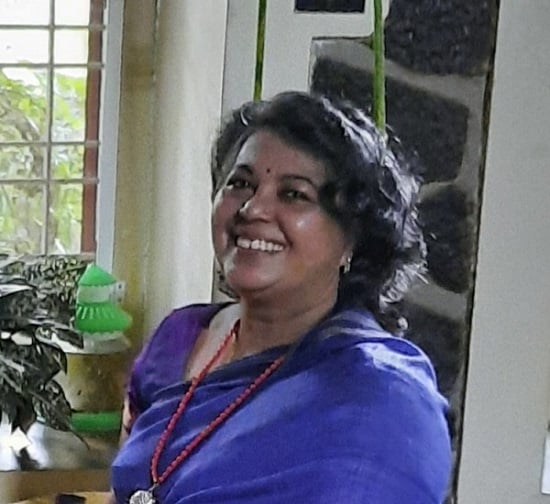
(Prof. Latha Prem Sakhya, a poet, painter and a retired Professor of English, has published three books of poetry. MEMORY RAIN (2008), NATURE AT MY DOOR STEP (2011) - an experimental blend, of poems, reflections and paintings ,VERNAL STROKE (2015 ) a collection of all her poems. Her poems were published in journals like IJPCL, Quest, and in e magazines like Indian Rumination, Spark, Muse India, Enchanting Verses international, Spill words etc. She has been anthologized in Roots and Wings (2011), Ripples of Peace ( 2018), Complexion Based Discrimination ( 2018), Tranquil Muse (2018) and The Current (2019). She is member of various poetic groups like Poetry Chain, India poetry Circle and Aksharasthree - The Literary woman, World Peace and Harmony)
Dear Readers,
It's a great pleasure to offer to you the 120th edition of LiteraryVibes, studded with brilliant writings. We are happy to welcome the new contributor Ms. Seetha Sethuraman from Goregaon, Mumbai. Although a quintessential corporate personality, she is passionate about literature and as her three poems and two anecdotes show, she is hugely talented. Let us wish her the best and hope we will have her continued presence in our future editions.
Heartiest greetings to you in this special month that hosts our Independence Day. May our country break the shackles of inertia and shine as a beckoning star for the troubled, tormented world. We know we have the potential, we need focussed efforts to translate the potential to performance.
Shri Satish Pasine, one of our regular contributors, has sent a nice piece of writing pulsating with patriotic fervour. It will fill the heart with the sort of pride that only citizens of a free, independent nation can feel. Let's take a look at it:
....................................................................
AEROPLANE MEAL
I sat in my seat on the plane. The distance to Delhi is two and a half hours. Reading a book, sleeping for an hour.....these are the things I do on my journey.
Just before take-off 10 soldiers came and sat in the seats around me. All seats got filled.
I spoke to the soldier sitting next to me...
"Where are you going?"
"Agra, sir! Training there for two weeks. After that, we will be sent for operations," he said.
An hour passed. The announcement was made. Those who want can order food packets on payment. I thought my lunch hassle was over and just then I heard a soldier, "Shall we order food too?"
"No! Their food is expensive", replied another. "Let's get off the plane and eat at a regular hotel". "Okay!" The other soldiers readily agreed.
I went to the flight attendant and gave her the money for all the soldiers' meals and said "please provide food to them." I saw tears in her eyes. "My younger brother is in Kargil, sir! Feels like you fed him too, sir."
I came and sat in my seat. In half an hour, the food packets arrived for everyone..... I finished the food and was going to the washroom at the back of the plane. An old gentleman came from the back seat, shook hands with me saying, "I understand everything, congratulations, I want to share in this good work", and pushed some 500 rupee notes into my hand... "Let me have a share in your happiness."
I came back and sat in my seat. Half an hour passed. The pilot of the plane approached me looking for my seat number. He smiled at me. He said he wanted to shake hands with me. I released my seat belt and stood up. He shook my hand and said, "I was a fighter pilot. Feels like you bought me a meal. That's a symbol of your love. I'll never forget that."
The passengers on the plane clapped. I hesitated a bit. It was a good thing I did, but I didn't do it for praise.
The journey was over. I got up and went to the front seat and stood by the door to get off. A young man took my name and shook my hand. Another person put something in my pocket and left without saying a word. Another tip.
While getting off the plane, the soldiers who had disembarked with me had gathered at one place. I went to them and took out the currency notes given to me by the fellow passengers on the plane and handed over to them, "This money will be useful for you to eat anything you like before you go to your training place. What we give is much less than the protection you give us.* Tears welled unknowingly into my eyes.
Those ten soldiers were carrying with them the love of all the passengers on the plane. As I got into my car, I said, "Lord, look after the lives of those who give their lives for this country!" I prayed to God with all my heart.
(The original story is in Marathi, its authorship unknown)
.....................................................................
We experience such overwhelming feeling of belongingness at different moments in life to realise what it means to breathe the air of a free country with an identity of our own. A war, an act of terrorism, a cricket match or even a movie like Mother India, Haqeeqat, Lagaan, Chak De India, can unite us and make us speak in one voice - the voice of national pride. The recent initiative by the Prime Minister of India to exhort the ountrymen to hoist a national flag in every home on Independence Day (Har Ghar Tiranga), was a wonderful attempt to kindle the flame of patriotism in every citizen's heart.
I was lucky to watch the film '83' recently, depicting India's stupendous feat of winning the Cricket World Cup for the first time. As the movie progressed, showing the underdog Indian team pulling off one incredible victory after another, climaxing in the crushing of West Indies in finals, the pulse raced, the heart throbbed and finally swelled with pride. Those who had seen India's captain Kapil Dev running a good hundred feet to take the most significant catch of the century to dismiss the rampaging Viv Richards in the finals, will vouch for what cheering for the country means. At the end of the movie '83' the real-life Kapil Dev recounts the memorable night of the victory at Lord's, "The stadium, stands, pavillion, terrace, the squares outside, the roads, were choked with Indians gone crazy with joy; trumpets, dholaks, cymbals were being played with deafening cheer, Champagne bottles were being opened in dozens and the celebrations went mush beyond midnight. When we returned to the hotel, all the restaurants were closed. There was no food for us, the players. So on the night of our most incredible victory, we went to bed with empty stomachs, but our hearts were filled with joy and pride."
In today's edition I have included a story of mine 'Looney of the Town' to commemorate our independence. Although it has been published in an earlier edition of LV, those who have already read it, may please do so again in the context of the country's freedom struggle and the post-independence scenario. Unfortunately many in our country have stretched freedom to an unsavoury extent. For them independence means the freedom to loot, rape and commit crimes with open brazenness. Some of them become opinion makers and sometimes law makers. In one of the states where the government changed and a new ministry was sworn in recently, it was shocking to read in the newspapers that more than seventy per cent of the ministers in the new cabinet had criminal cases pending against them. If the reports are true, one wonders what kind of law-making they will do for the state. In another state a minister and his associate's houses were raided by central law enforcing agencies to unearth more than 50 crores of unaccounted money. That is indeed a huge sum by any account. The media reported that the associate has revealed during investigation that the money belonged to the minister whose men had the keys to the apartment. It seems they used to come and dump the currency notes in the rooms.
Again, if the revelation is true, it is shocking. How do the persons in authority, having taken a pledge to follow, protect and defend the constitution, manage to amass such mountains of wealth? Whose money is that? How many thousands of crores of such money are circulating in the country, bleeding our economy and dragging us down? Despite tremendous progress in various sectors since our independence, have we really achieved our potential? Has each and every rupee from the billions spent through our budgets been spent in the right way? If the answer is yes, then why our patients have to sleep on the floors of hospitals in the absence of a bed, why our students in class six, seven, cannot do simple maths or cannot write a sentence correctly? If the answer is no, then we must do serious introspection, to find out where we have gone wrong, how we can do a course correction.
Independence Day, Republic Day are our moments of reckoning, occasions to ask hard questions to ourselves and re-dedicate ourselves to the building of the nation, to ensure everlasting pride, not occasional, sporadic moments of chest-thumping or self-gloating.
Hope you will enjoy the offerings in LV120. Please do share the following links with all your friends and contacts:
http://www.positivevibes.today/article/newsview/450 (Poems, short stories, Essays, anecdotes and travelogues), http://www.positivevibes.today/article/newsview/449 (Young Magic).
Please don't forget to access the special article on India's Freedom Struggle by Satish Pasine at: https://positivevibes.today/article/newsview/451.
There are also two anecdotal articles by the prolific Dr. Gangadhar Sahoo at http://www.positivevibes.today/article/newsview/447 and
http://www.positivevibes.today/article/newsview/448
Take care, stay safe and keep smiling, reading our beautiful poems and wonderful articles. We will meet again on 30th September, the last Friday of next month.
With warm regards
Mrutyunjay Sarangi
Table of Contents :: POEMS
01) Prabhanjan K. Mishra
RESURRECTING MADAM JI
02) Haraprasad Das
A SURREAL NIGHT (YAATRAA: RAATI)
03) Dilip Mohapatra
THE CAGED BIRDS
QUEST
04) Amarendra Khatua.
FOREST
DEPARTURE
05) Abani Udgata
MOMENTS
06) Jairam Seshadri
EVERYWOMAN
07) Dinesh Chandra Nayak
BRIDGES
08) Arpita Priyadarsini
THE ENCHANTRESS
09) Archee Biswal
A RAY OF LIGHT
10) Seethaa Sethuraman
GIFT FOR LIFE
EVERY DAY - SOME DAY
ART OF LIFE
11) Hrushikesh MallicK
TUMBLES DOWN YOUR COIFFED HAIR
12) Sundar Rajan & Group
ELEMENTAL EARTH!
FRIENDLY FAUNA
HILLY TRAILS
13) Sundar Rajan S
MOTHER INDIA
14) Dr. Molly Joseph M
MY BARD!
15) Hema Ravi
RE-WILDING AND RE-MINDING
16) Kamar Sultana Sheik
BRAHMA DHANUSH
SHANTA-RASA
17) Ravi Ranganathan
MEMOIRS
18) Setaluri Padmavathi
DOCTOR - THE ALMIGHTY ON THE EARTH
19) S.Krishna Tulasi
STORY OF AN ERROR
20) Sunil Biswal
LONG DRIVE ON A RAINY MORNING
21) Gita Bharath
BANYAN
22) N. Meera Raghavendra Rao
THE DEFIANT CATS
23) Snehaprava Das
MY COVID TIME
24) Ajit dash.
FLUTE
MANASVINI
25) Binsha Anas
WHAT STILL REMAINS
26) Prof Niranjan Barik
ANY WRONG ASKING FOR THE MOON?
27) Mrutyunjay Sarangi
BROTHERHOOD
Table of Contents :: SHORT STORIES
01) Sreekumar K
WRITING ON WALLS
INTOXICANTS
02) Prabhanjan K. Mishra
ANTI-SMUGGLING
03) Chinmayee Barik
MRS DABBAWALLA AND RAI BAHADUR
04) Ishwar Pati
DISASTER IN THE OFFING
05) Satya Mohanty
AN AMBIVALENT DO-GOODING
06) Hema Ravi
BEAR BEHIND THE GLASS DOOR
07) Archee Biswal
CHIT-CHAT AT THE AIRPORT
08) Punyasweta Mohanty
THE HUNT
09) Lathaprem Sakhya
TOGETHER
11) Nikhil M Kurien
ZEBRA LINE
11) Dinesh Chandra Nayak
LIAR HUSBAND
12) Sheena Rath
BLUE
13) Dr.Radharani Nanda
QUESTION PAPER
14) Ashok Kumar Ray
A TRIP DOWN MY MEMORY LANE
15) Mrutyunjay Sarangi
LOONEY OF THE TOWN
Table of Contents :: ESSAYS, ANECDOTES, TRAVELOGUES
01) Dr. Ramesh Chandra Panda
GLIMPSES OF OUR HERITAGE - WHY SHIVA IS CALLED ARDHANARISHWAR?
02) Gourang Charan Roul
MATHA TEKA AT HARMANDIR SAHIB AND DANCE AT WAGAH BORDER
03) Seethaa Sethuraman
LUCKNOW- AYODHYA TRIP
ADRENALINE RUSH FOR A CAUSE AT TATA MUMBAI MARATHON
04) Nitish Nivedan Barik
A LEAF FROM HISTORY
05) Satish Pashine
WORLD SENIOR CITIZEN'S DAY- SOME REFLECTIONS
06) Jayshree Misra Tripathi
INDEPENDENCE DAY REFLECTIONS
SOUNDS AND SILENCE
07) Dr. Viyatprajna Acharya
THE BETTER-HALF OF THE SCIENTIFIC WORLD
08) Pradeep Biswal
RAMAKANT RATH: THE POET LAUREATE
09) Avaya C Mohapatra
IN QUEST OF A BRAVE NEW WORLD
BOOK REVIEW
01) Sundar Rajan S
THE JASMINE GIRL AT HAJI ALI AND OTHER STORIES - A REVIEW
Table of Contents :: YOUNG MAGIC
01) Trishna Sahoo
MONEY
02) Ritika Pradhan
FREE BIRDS
03) Mrulanini Mallik
STARS
SPECIAL ARTICLE ::
01) Satish Pasine
POEMS
RESURRECTING MADAM JI
Prabhanjan K Mishra

She chooses a site,
hammers a nail into the wall
fixes the chime-clock to the nail.
She has just moved into the rented house,
repainted the walls pestle-purple,
but clung to her old tick-tock clock,
her conscience keeper.
Hoping to tick to its every tock,
walking, sprinting
to reach the targets, but arriving
after the clock has tick-tock-ed ahead.
She feels like a loser.
She lectures her class,
“Don’t stop till you finish the task.”
but stops herself halfway
to announce an office circular,
attend to an exigency,
or help a harassed pupil.
The bell rings, she rushes home,
leaving the lecture unfinished;
not to miss
husband’s office-return
smiles and kisses,
sweaty hugs.
Between his hugs and pecks,
an SMS puts a hyphen,
the ayah’s message, “Sorry madam,
pick baby from the creche yourself.
I am very unwell.” She rushes out,
putting husband’s peck and hug on hold.
In bed, after the warmup,
before any serious business,
she develops cold feet,
recalls anxious answer-sheets
awaiting assessment, and dispatch.
Back to bed on cat-paws
hours past midnight, she finds her man
snoring. A groggy morning follows
the half-made love, half-rested body,
half-assessed answer-sheets,
half-ready lessons;
she feels ashamed before her clock.
Husband at office,
the kid at the creche,
larks on wings,
chirping parakeets at her windows,
she rushes to her pupils
to push ahead the lessons.
She writes new resolutions, …
‘Finish lectures, collect husband’s hugs,
breastfeed the baby,
finish answer-sheets,
let the bed rock until her man tires,
buy a damn silent clock!’
A SURREAL NIGHT (YAATRAA: RAATI)
Haraprasad Das
(Translated by Prabhanjan K. Mishra)

Night is putting on
her last touches of makeup,
grey hair
already coloured black;
the courtyard is swept clean
of the odds and ends
from a harried hailstorm,
that passed without rain;
the clouds are getting cleared
out of the sky like hesitant ships
out of their harbor, their sails
filled with fidgety southerly wind;
but a worry haunts, the heretics
may reach the temple,
before the devotees,
to defile the deity.
In the meantime,
a chunk of moonshine
has tumbled down
onto the riverbank;
like a white water-nymph
spreading her pretty feet
into the river’s rippling water
breaking the moon into splinters.
Anticipations crackle,
like thin wafers crumbling -
what would happen next?
Nothing perhaps!
But one may take a stock
of the nightlong adventures -
night is ending, surreal dreams
vaporizing, thin and wispy;
the fairy, guised
as a dragonfly at the lamp
would fly away
at the first light;
one has to return
from here to reality
as always,
leaving a mark
etched with blood
on the last milestone
for someone special
one is looking for.
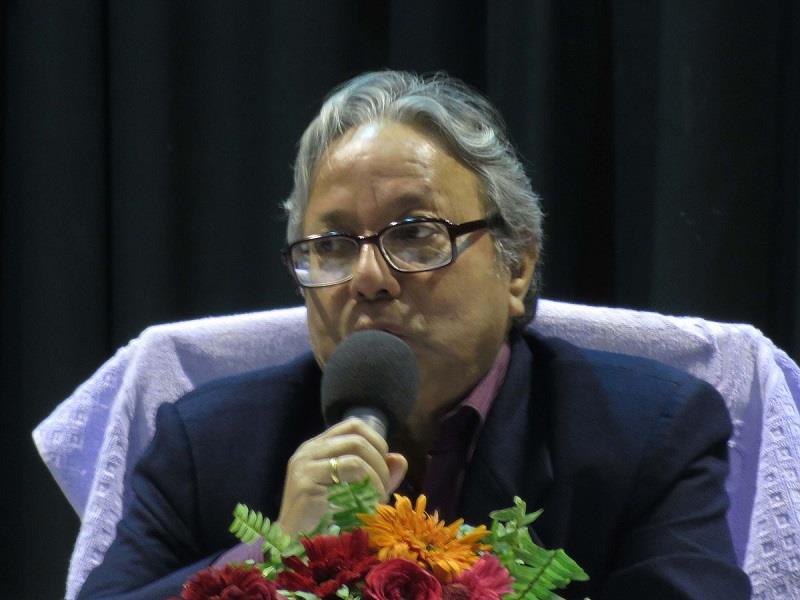
Mr. Hara Prasad Das is one of the greatest poets in Odiya literature. He is also an essayist and columnist. Mr. Das, has twelve works of poetry, four of prose, three translations and one piece of fiction to his credit. He is a retired civil servant and has served various UN bodies as an expert.
He is a recipient of numerous awards and recognitions including Kalinga Literary Award (2017), Moortidevi Award(2013), Gangadhar Meher Award (2008), Kendra Sahitya Akademi Award (1999) and Sarala Award (2008)”

You find them on the pavements
around the street corners
in the small hours
curled up like embryos in a womb
their spines protruding in ridges
on their shrivelled skins.
You find them at traffic signals
tapping on the windows of your car
while you wait for the red to turn green
little heads resting on their nonexistent bosom
and little hands clutching
their never washed petticoats in tatters.
Their wings are clipped by penury
that perhaps is thrust on them
but nothing can deter their spirits to fly
and steal away the stars from their smiles
for they still offer themselves to life
and life perhaps embraces
them with equal fervour
and the sun still dazzles in their eyes
and occasionally they also sing
songs of romance and joy
and songs of freedom and liberation.

I am the eternal seeker
for I am not a believer
I seek God
in fire and in water
in skies and in sands
in heavens and in hell.
I seek Him
in my very own creations
in the idols
in the Sanctum Santorum
in the Gospels and Hadiths
in His presence
and in His absence.
I take multiple paths
traverse multiple terrains
seeking liberation
seeking salvation
my thirst never satiated
I wander from
one yoni to the other
for I am the eternal seeker
and not a believer.

Dilip Mohapatra, a decorated Navy Veteran from Pune, India is a well acclaimed poet and author in contemporary English. His poems regularly appear in many literary journals and anthologies worldwide. He has six poetry collections, two non-fictions and a short story collection to his credit. He is a regular contributor to Literary Vibes. He has been awarded the prestigious Naji Naaman Literary Awards for 2020 for complete work. The society has also granted him the honorary title of 'Member of Maison Naaman pour la Culture'. His website may be accessed at dilipmohapatra.com.

The routine of thick, many-layered
worries. The long-sigh inflicted by
the feelings of the continuous activities
of animals. The fifth-day moon of waiting
swims in the shore-less lake of poverty.
The city increases in the wild tradition
of waiting fails to arrange the history of
a thousand hearts and eyes. In the suburbs
the bizarre grief, poverty and hopelessness
of wolfish trees. Life is forest-born, evolving.
Who shall show the way from here?
Is it the wild hunter fixing his greed
with his arrows? Is it the cruel hunter
creating the darkness of savage hunger?
What ways shall the old witch show
to travel through the forest
in the name of necessities?
Let everything stay in the thick darkness.
let the rotten soil eat away the forest.
Let the unknown ghostly stories remain
beyond the hills and streams.
Let everything remain in the darkness
enclosed by so many shadows.
Let life remain full of forests, against our wish.

When it is time to leave, you must
straighten your eyes
walk back, all alone.
No one can see from beyond
the horizon. After the birds
fly away until they disappear
round the bend. The sadness
of loss like a drizzle in the eyes,
inside the chest. Sadness comes
like this, all alone.
The familiar, smiling face
is remembered. The hair stand
on their ends by a touch,
in terrible love or fear.
Whatever remains after death, is alone.
There is no time in belief, no age,
No reason in feeling. You can
keep the accidents and misfortune
as witnesses. But it cannot be remembered ---
this greedy attraction, this injustice,
We are all alone because of our self-conceit.
When it is time to leave, the feet feel
reluctant, do not move in the name of love and family
But you will have to leave, all alone.
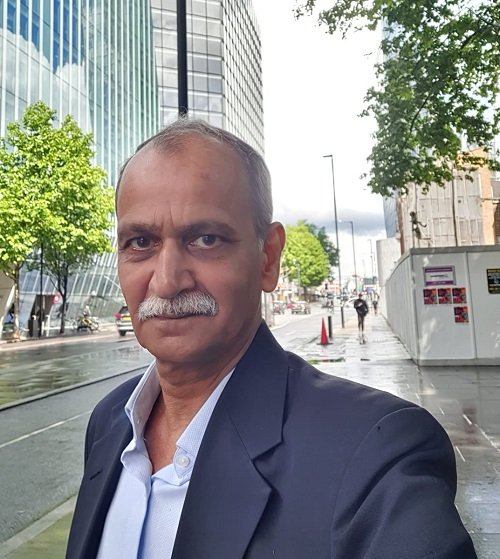
Amarendra Khatua is a renowned poet whose poems have been published in numerous national and international magazines. Apart from publishing his own collection of poems, he has edited many Anthologies. He retired from the Indian Foreign Service after a distinguished career spanning thirty seven years. He publishes in Odia,English and Hindi.

It is just that moment
that matters today and
today of all days .
As I look up at the sky,
from balcony, a drop of
rain jumps on me, my face,
my eyes, my intimate embrace,
disengaged from cloud cluster.
For the sky must disappear,
when that tiny bird floats
all alone in utter emptiness.
Those moments that I carry
tied in to knots from beyond
today’s boundaries, from
my childhood, define me, not
the vast array of scenes, of roads,
of cities and faces that galore.
I know that that space will collapse.
Still, I untie the knots and crowd
that space and draw those pictures.
The moments frozen under glaciers.
Each one holds a mirror to me for
they always come back to find me
when I am sitting in the centre of
my home, my island or country.
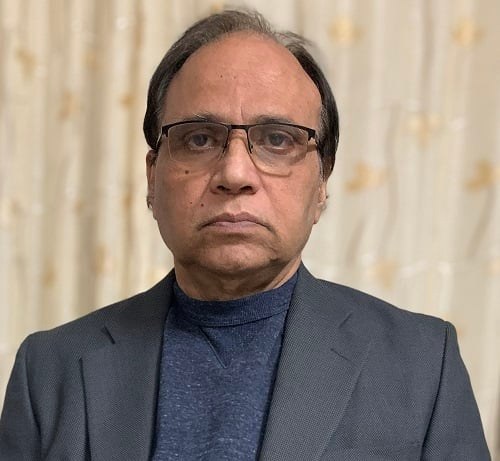
Abani Udgata ( b. 1956) retired as a Principal Chief General Manager of the Reserve Bank of India. in December 2016. Though he had a lifelong passion for literature, post- retirement he has concentrated on writing poetry. He has been awarded Special Commendation Prizes twice in 2017 and 2019 by the Poetry Society of India in All India Poetry Competitions and the prize winning poems have been anthologised. At present he is engaged in translating some satirical Odia poems into English. He can be contacted at his email address abaniudgata@gmail.com

She dressed the way he liked.
She cooked meals he preferred.
She bore children, as many he desired.
She ate after serving him (at the time he wanted serving).
She accompanied him to events he enjoyed.
She learned his craft (to the extent he was comfortable) to converse.
She prayed when he was in trouble.
She prayed when he was not.
She gave in whenever he wanted.
Ho hum?
Clichéd?
But then something happened –
She was reminded of her mortality.
She realised her passing would be an event unrelated
To him - the one, whom she breathed.
Would she regret not living tiny joys,
There … on the distant fringes?
She sat up in the dark.
He thought it was a tumultuous ruffling
On her side of the bed.
She switched on her bedside lamp.
He half-opened his eyes.
He was aghast she paid no heed
To him raising his head.
She grabbed a pen on the side-table.
Retrieved an unruled, blank book
And
she
began
to write!
A glow
Above the penumbra
Of the bedside light.
*
From that day on
She assumed an all-knowing,
Never revealing
Surprise, wonder, awe.
(Oh she wells,
But no flourish of a thanks,
No smile for what received,
To Whom-So-Ever !)
She grows by all measures from ventures
Gives a hard look -
It Is All Me!
She whispers –
Obligation Demands Recompense!
A Shackling,
A Dark Cloud-ling.
(Akin to before)
The tunnel
Long and so pitch -
She does not recall
A moment in the mirror;
So tarred
She breathed shallow.
Now, in the light,
She shivers,
Disguising tremors
From light shone.
And the glow pervades,
When
pen
on
paper.
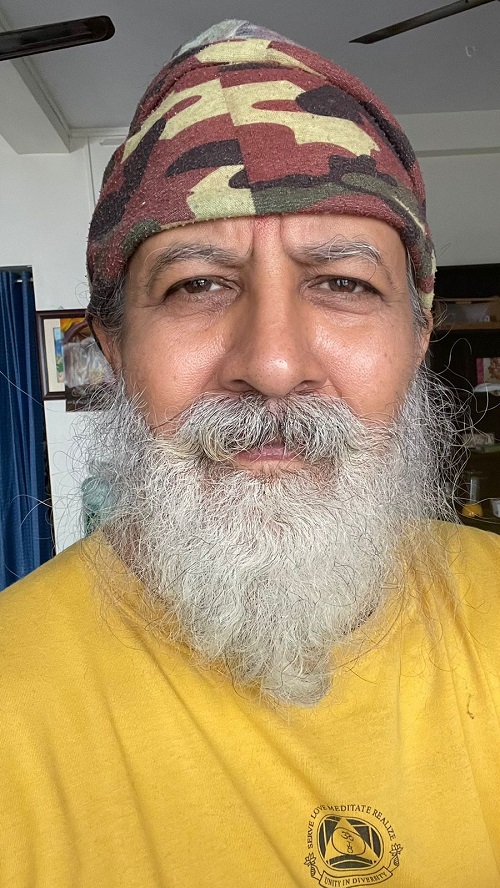
Jairam Seshadri is the author of MANTRA YOGA ( 2021 Rupa Publications) WOOF SONGS & THE ETERNAL SELF-SABOTEUR (2019 Partridge) and JESUS SAHASRANAM - THE 1,008 NAMES OF JESUS CHRIST (2018 Authorspress). He is a CPA with an MBA from the US and has worked in the U.S, Canada and England for over 30 years before returning to India to take care of his father.
He founded the India Poetry Circle (IPC)) six years ago, which has seven anthologies to the group’s credit, in addition to two more in the pipeline to be published this year. IPC, through its offshoot, IPC PLAYERS, has also produced and staged several skits, as part of its ‘POETRAMA’© series, including a production of Shakespeare’s MACBETH online. Shakespeare’s KING LEAR will be staged online this Christmas 2022.
Jairam lives in Chennai and can be reached at 9884445498 or jairamseshadri@hotmail.com.

He parked his cycle and almost ran to where I stood,
Under the tarpaulin shed of the vegetable vendor,
The steps were big and sprightly for a man of his age,
A total madcap to venture outside in a climate like this,
Had he also been forced on an errand similar to mine!
I just could not ignore the oldster standing near me,
Tall with piercing eyes below a grizzled head,
With a deep maroon T- shirt on his lean frame,
And a mischievous smile belying his age,
He seemed to mock us all waiting for rains to subside.
Suddenly I remembered having seen him somewhere,
The face in my memory was definitely younger though,
He happened to flash a knowing smile at me,
His looks at my drenched dress seemed to bear concern,
“Take care, you are no longer young!”, they seemed to say.
A few queries coagulated in my mind too,
Who was this amiable oldie, some long lost friend?
A termite eaten page from the days of my childhood,
Was he my classmate in the school we attended?
His mocking but friendly smile made me wonder!
But, try as much as I could, failed to reconnect!
Then suddenly I noticed his receding frame,
In the weakening rains that had allowed a brief respite,
I lacked the nerve to call him back and say ‘hello’,
It seemed we were destined to remain unknown,
Like islands scattered over a vast ocean,
He appeared to be either a friendly neighbor or a classmate,
Yet, I had failed to make a bridge with my past once again!

You remember her
like the middle of your name
and she vows
to keep you alive
on the day Thanatos arrives
to devour your soul
and leave your body to rot
Like a withered leaf on the pavement
She'll keep you certain
On the moments of your compassion
Her presence will wound your soul
yet her absence
will make you devoid of emotion
She'll embrace you whole
or leave you quenched
begging for an ounce of her
She,my dear
is the one
to live the death
and die the life
Her skin outpours the elixir of forgiveness
She virtues to rule
And frails to love
She's the muse of the dead
And eulogy of the living
She,my dear
Is the Conquerer of the breath
That come in gasp
Her presence denies
The arrival of lilies
Yet embraces
The dreadfulness of cactus
Her majestic self
Arouses the moon
And blazes the sun
She,my dear
Is the enchantress
The fierce ruler of self
Her voice
Is the souvenir
Of the Calliope
And her eyes
Are the sovereign
That rules the world of ecstasy
And hue

Arpita Priyadarsini, a final year Post Graduate student of Department of Statistics in Utkal University, has keen interest in literature. She loves reading fiction and poetry. She started writing poems few years back and has been published by an international publication house twice. Her Instagram handle is @elly__.writes, which is solely dedicated to her love for poetry.
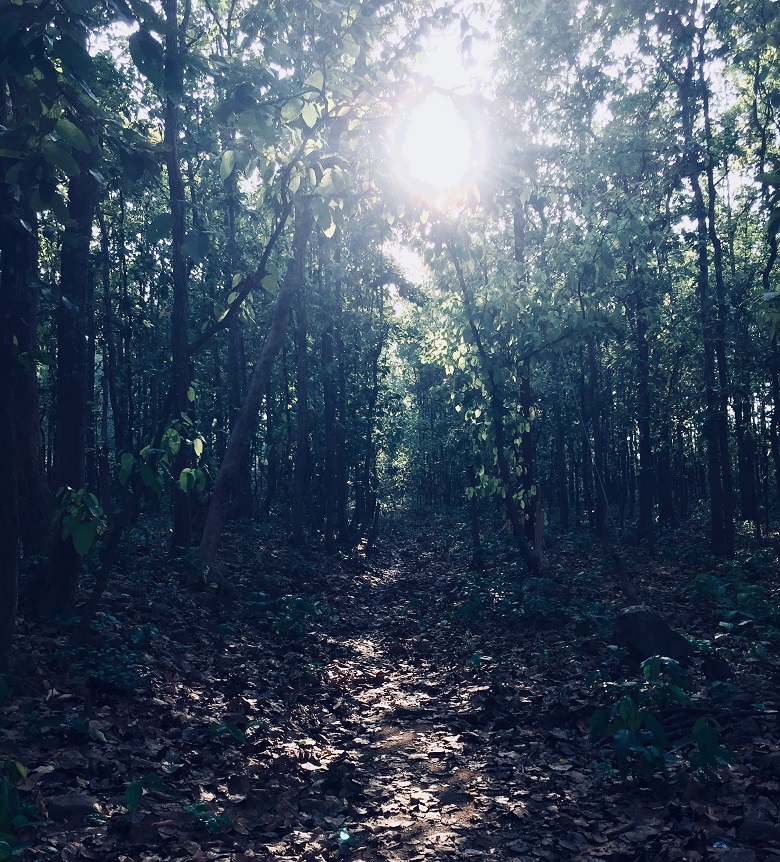
I often find it funny
How the world gives itself the right
To judge and chastise me-
Trying to put me down with all their might.
I am not a glitch in the matrix
This beautiful planet is my home too.
To attack me with rocks and bricks,
Who are you?
I love my passions, hobbies, and interests
Animals and trees make me feel at home.
I like dancing among the stars,
And exploring the many dimensions alone.
No matter how harsh the words are
There is a tiny voice inside my head reminding me
That although this is a vicious war
There has never been a warrior as powerful as me,
And there never will be.
Even when it seems like there is no end in sight,
A little ray of light emerges from the shadows.
Once again, my mornings are bright
As it holds my hand and leads me to a world
sans people, pain, and fights.
(This poem has been inspired by my name ‘Archee’, which means ‘a ray of light’. It strengthens my belief that no one but you yourself can save yourself from the woeful situations in life. My name was given to me by the famous Padma Shri and Jnanpith awardee, Mr. Sachidananda Routray, who happens to be my great-grandfather. He was my maternal grandfather’s uncle (mamu).)

Archee Biswal is from Bhubaneswar, Odisha. She is currently pursuing MA in Analytical and Applied Economics at Utkal University. Her dream was to be a writer ever since she was 9 years old. Her poems and short stories have been published in various magazines such as Chandamama and Kloud 9. She likes dancing, painting, and playing instruments such as the keyboard and guitar. She speaks 6 languages including German and Spanish, which she learnt while staying in Germany. Her favourite wish is to travel all over the world and collect new experiences.
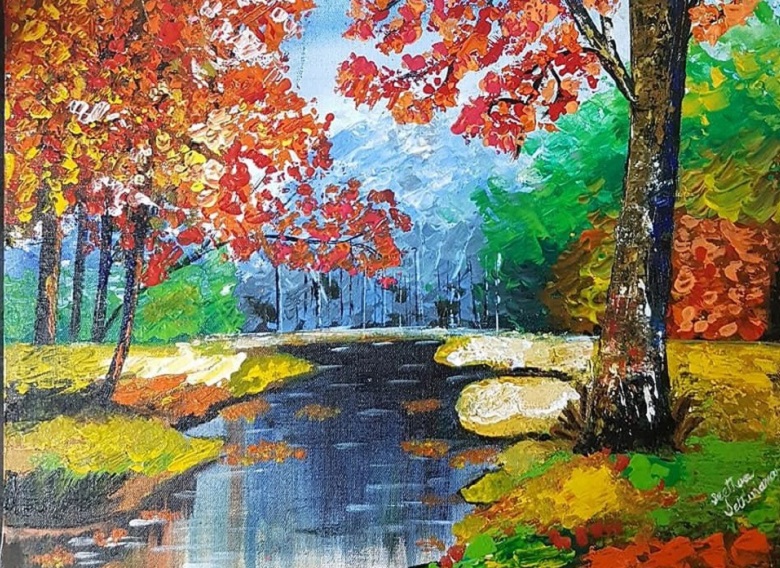
Gift yourself the road and the sky...
They will walk with you throughout your life.
Gift yourself the sun, moon and the stars...
They will always light your path with shine and sparkle. G
ift yourself the rivers and the oceans...
They will cleanse your soul throughout your life.
Gift yourself the wind and the breeze...
They will blow your troubles away forever, in a gust.
Gift yourself your heart and soul...
They will warm your cockles throughout your life
Life has to be lived seemingly ordinarily, every day;
to experience how it turns extraordinary some day;
Life has to be thought of seemingly practically, every day;
to understand it philosophically some day;
That life is the greatest of teachers is not said for nothing.
So, keep practising what you believe in,
seemingly laboriously every day;
to realise how it becomes your life’s purpose some day.
In the spring of youth, you seem to control life,
When the years catch on, life controls you is the truth that dons;
How fragile our body and mind are, you come to realise,
Like flowers strewn on the morning trail, as frail they are;
Unravelling the path to strengthen yourself is the real test of life,
By embracing the realities like they are - that’s the true "Art of life"
has had a creative orientation right from her school days – dabbling in writing,drawing and painting as well as learning Indian dance forms and Carnatic music. Thereafter, the usual suspect in professional education and corporate pursuits assumed centre stage (B.Pharm, MBA by education and a Health market researcher by profession); till the pandemic strongly nudged her to delve back into her creative side; alongside her continuing corporate endeavours. While formally learning Bharatanatyam had already begun since mid-2018; writing poems and drawing-painting turned somewhat prolific since the last 2 years.
TUMBLES DOWN YOUR COIFFED HAIR (PHITIGALAA TAMA SAJADAA GABHAA)
HRUSHIKESH MALLICK
(Translated by Prabhanjan K. Mishra)

The poet is out,
on the lawn; it’s late night,
wife by his side,
his inseparable shadow.
Muted yellow marigolds
grieve for the dying moon,
waft a tragic sweetness
oddly reminiscent of the flowers
offered at a dear-departed’s last journey.
The wind is sad and listless,
the lawn’s eyes have welled up, the dew,
the poet’s senses lurch into gloom.
To lift the lid off the pensive mood,
his hands go fickle,
plucks a marigold from a bush
for wife’s lovely coiffed tresses.
The gloom lifts, her hand cosy in his,
they walk with joyous abandon
on the dew-wet lawn, exuded by
marigolds, now smelling romantic,
awash with cool whiffs of mist,
dimly lit by a snoozing moon,
languidly hanging on horizon,
a muted Chinese lantern.
The wife’s feet get wet,
unwittingly washed off the Alta paint
smeared on her nubile feet
to heighten their pink; she is upset.
She glares at the lawn, glares
at the dew, glares at her husband,
her withering frown roasts them all -
the lawn, the dew and the sorry poet.
But with mischief in eyes
the poet tucks a marigold into wife’s hairdo.
Her coiffed hair tumbles down,
heralding not less than a second sin*;
an uncoiling black snake,
a waterfall flowing down into the night
inviting the poet to get drenched,
and regaled himself in the cascade.
The wife’s face is clouded,
the poet ignoring it as her mock anger,
her love’s intriguing complicity,
a weaver bird’s complex weaving;
the quadratics of her love,
brighter than the sun, darker than the no-moon,
the poet revels between the two, in a hammock swing,
her capricious mood and childlike gaiety.
Puzzles bother him – why a lily withers
after the sunrise, in its water-world when the rest
of the flower-sisterhood hails the sun?
Why deciduous trees of a jungle
shed leaves and stand naked
in the shivering winter?
Why eyes go moist with tears
in the night’s most soulful hours of union?
At his wit’s end, the poet cajoles
his sweetheart to listen
to the night’s musical notes
ranging from low tenor to shrill soprano,
from the throats of bullfrogs and cicadas;
begs her to forgive the dew and
the marigold, and join him in the revelry:
the dew, the mist, the moon and marigolds.
(Footnote – *Second sin. The first sin being the ‘coitus’ as most conservative Catholics believe)
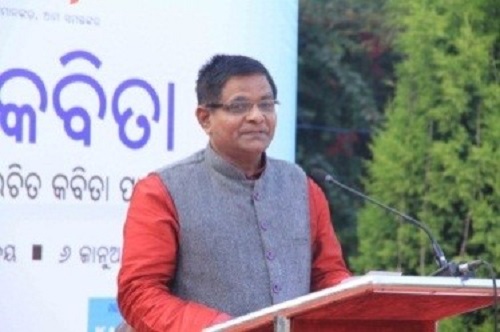
Poet Hrushikesh Mallick is solidly entrenched in Odia literature as a language teacher in various colleges and universities, and as a prolific poet and writer with ten books of poems, two books of child-literature, two collections of short stories, five volumes of collected works of his literary essays and critical expositions; besides he has edited an anthology of poems written by post-eighties’ Odia poets of the last century, has translated the iconic Gitanjali of Rabindranath Tagore into Odia; and often keeps writing literary columns in various reputed Odia dailies. He has been honoured with a bevy of literary awards including Odisha Sahitya Akademi, 1988; Biraja Samman, 2002; and Sharala Puraskar, 2016. He writes in a commanding rustic voice, mildly critical, sharply ironic that suits his reflections on the underdogs and dregs of the society.
GB, SB, SRS, SS, PJ, SSR, PV, GB

(Pic credit Sundar Rajan)
Am I just a blue sphere of five elements?
Fiery core, air, cool waters my testament
Flora Fauna flourish on my land and sea
Sun and moon nourish, animals plants, and me!
Am I just that one big planet you call home?
Welcoming everyone onto my li'l dome
You come ’n’ conquer and call it yours to stay
And I simply watch you putting me to slay.
Am I just Mother Earth, 'Dharthi Ma'* in name?
It's time the human race hung its head in shame.
They've decimated, destroyed, plundered at will,
And claim they are the most evolved species still?
Am I just a big blue ball for humans play?
Just made of water, sand soil humus, and clay?
Digging up my core and tearing up my veil,
Asking for forgiveness, One day you shall kneel!
Am I just another planet round the sun?
I'm the one that nurtures life, the only one.
My resources you may use, I don't restrict;
Remember if I'm exhausted, you're extinct.
Am I just a sphere rotating on axis,
Revolving around Sun, as time elapses?
I nurture Nature, flora and fauna space,
While I yearn for support from the human race.
Am I just a ground to hold tight lightning bolt?
Don't I heat, cool water in sea also, hold?
I keep grounded creatures, trees, all encompassed!
Nurture any planet like I can surpass!
Am I just a planet of soil and air?
I am your solace, your peace ever
I am a place of happiness and sorrow
I live and let you live even in morrow!
Am I just a turquoise dot in endless Space?
Home to flora, fauna, and the human race.
From molten metal core to ionosphere,
May all life forms co-evolve and persevere.
* means Mother Earth.
GB, SB, SRS, SS, PJ, SSR, PV, GB
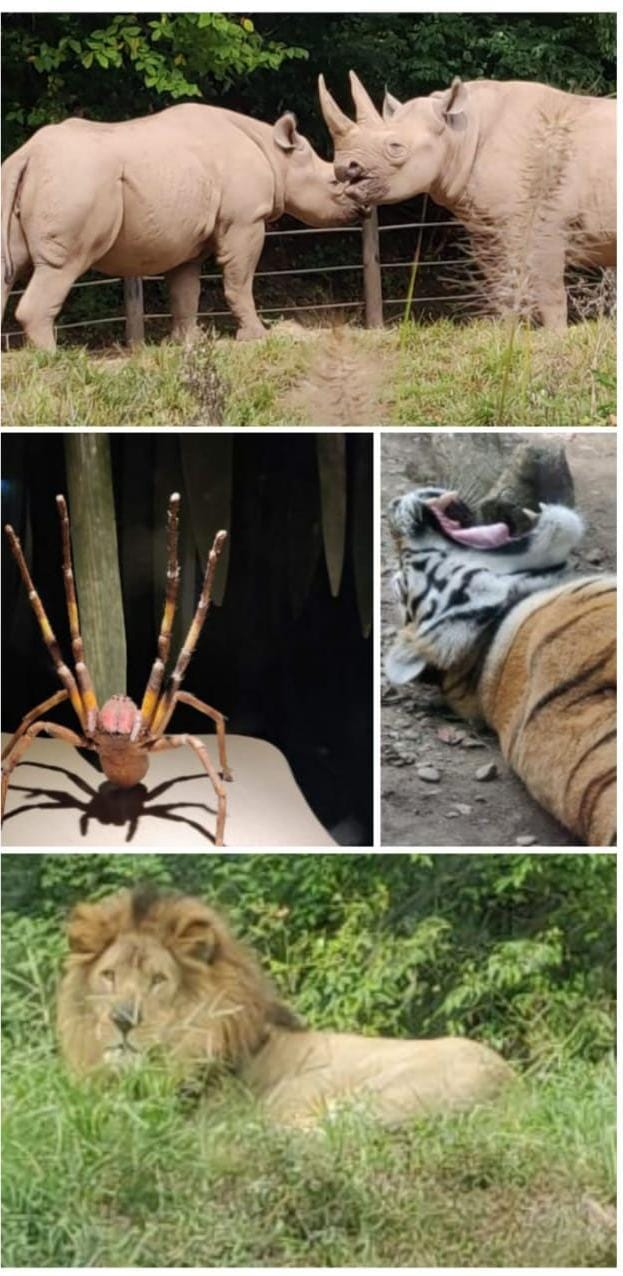
(Pic credit Sundar Rajan)
Am I just protein molecules that gave birth
To life as lightning flashed above the bare earth?
To protoplasm and cells that formed long chains
Resulting in flora and fauna with brains.
Am I just a kingdom of bees, birds, mammals,
Which thrive on flowers fruits tubers that annals?
From deep sea to soaring skies, under the earth
Or inside the gut, I dictate life and death!
Am I just an animal of the forest?
I am your family friend, your cat, nice guest
I keep you, happy, smiling with love always
I’m part of your family life in all ways.
Am I just the life that supports other lives
Part of the food chain, on which everyone thrives
From the smallest to the largest in the line
I make life on earth for everyone seem fine
Am I just a bone and flesh conglomerate?
An evolving soul among inumerate.
Souls in earth space each pursuing ascent,
While still part of the ecology present!
Am I just on the point of slow extinction?
Lack of habitat and human predation
Cause havoc to peaceful, safe co existence.
Yet I survive on instinct and persistence.
Am I just the many meant to be subdued,
Or the many more killed to serve human's food.
We've inhabited the earth for aeons before
The homosapiens came out to the fore.
Am I just set on evolution’s fixed way:
Beasts to cave men, to homo sapiens today.
But eternity still stretches before us,
Will we humans ascend to super status?
GB, SB, SRS, SS, PJ, SSR, PV, GB
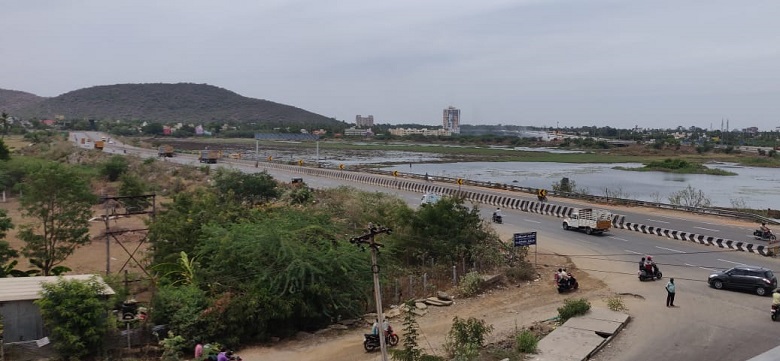
(Pic credit Sundar Rajan)
Am i just a patch of green on rock and mud,
My flattened green mane trimmed and groomed to look good?
With parting paths that wind up and down the hill,
Covered by clouds, mist, brewed tea to ward off chill !
Am I just a heaped up pile of rock and stone,
From which springs arise and rivulets leap down?
From my caves they mine iron ore and moonstone!
My summit glows with a vaporous white crown!
Am I just your refreshing summer sojourn?
I've been here before flora, fauna, human.
To flora, fauna a home convenient
Reaching my peaks is, to humans, achievement!
Am I just a group of green stones standing tall?
I am powerful, mighty and will never fall!
I am created to support earth to stand ,
In times of distress I will give you a hand!
Am I just the so perfect destination ,
For a wonderful family vacation?
I nurture huge forests, massive waterfalls,
Protect wildlife, home to a million birdcalls!
Am I just a rock? is the common refrain.
I liaise with the breeze for the welcome rain,
I channalise rivers as they caress me,
Minerals, flora and fauna thrive with me!
Am I just the stubborn hill blocking your way?
Or the one who makes up for a leisure stay?
Rivers flow around me to reach you down there
Sometimes the snow covers me freezing the air!
Am I just a pimple of Earth's pitted skin?
I give elixir, water to thrive, my kin!
I hide mineral treasures in my bosom,
my sceneries and pictures just awesome!
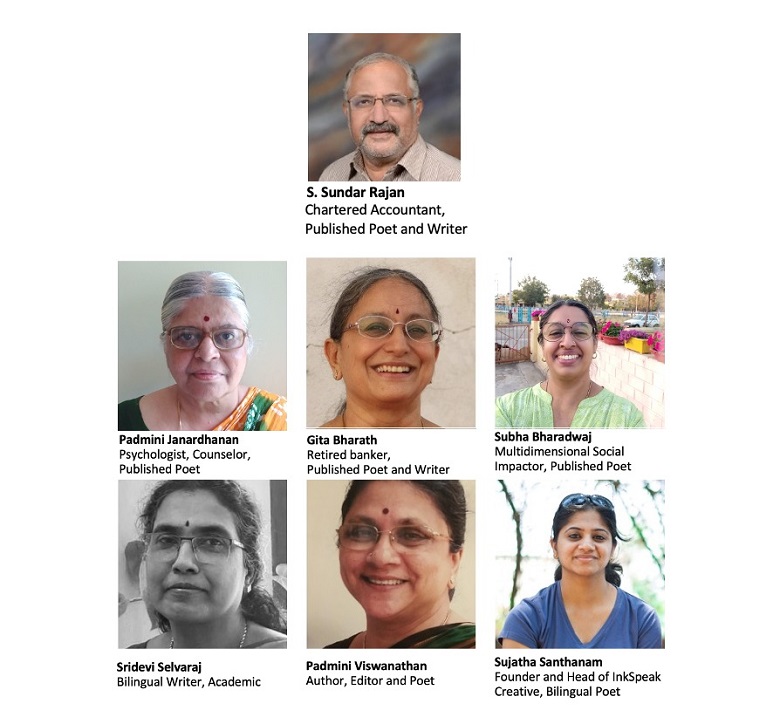

I am many centuries old,
Culture and heritage abound,
Majestic monarchs did nurture,
That set the princely states to prosper.
With natural wealth, so profound,
It drew the aliens to hound.
They plundered my wealth for ages,
The land of epics and sages,
The land of the toiling farmers,
The land of the snake charmers.
Non violence was the factor, key,
To make me finally break free.
Seventy-five years have just flown,
I have exponentially grown.
The world now looks at me with awe,
I am the MOTHER INDIA.
S. Sundar Rajan is a chartered accountant, a published poet and writer.
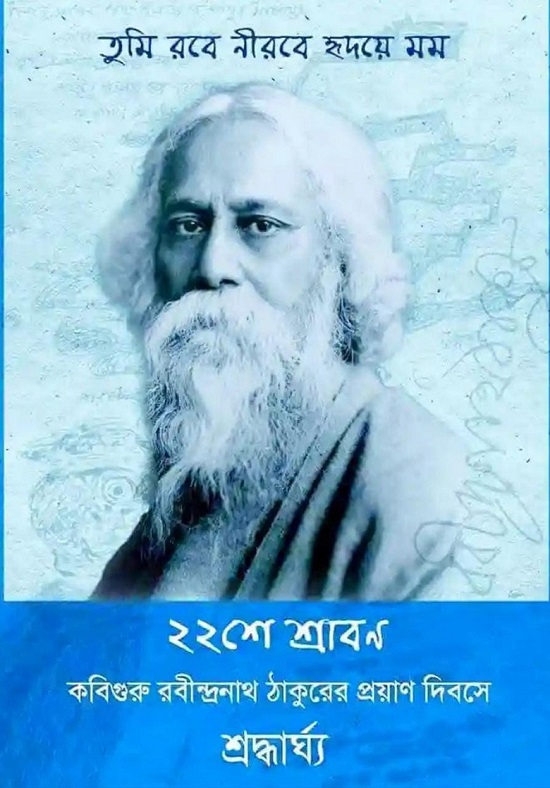
On the seashore of
endless words
pebbles
how like a child
I tottered
picking, collecting
making dream castles
that fell
miserably
as a fiasco....
you came
to hold up
my hand
pointing at
the vast expanse
where children play
with shouts and
revels
among the charming
glades and shades,
so blissful
accepting all...
we watched
how after the
nocturnal
hide and seek
the moon retires
paving way
for the morning
glory...
there where
the radiance
fell and spread
we listened to
the glory of
our creator
sung full throated
by the birds...
even the sweltering
heat
turned a sweet
promise...
how we traversed
the sunny,
the gloomy,
singing the
song of love
faith and peace..
our silences
saturated with
the content
of a reed in
moving waters
to merge
with the great
sea of silence..
O, my Bard!
how together
our winged self
transcends
the shores
of word play
to resonate
seeking the
eternal
edge to
things
where
borders
coalesce..

Dr. Molly Joseph is a Professor, Poet from Kerala, who writes Travelogues, Short stories and Story books for children. She has published twelve books,10 Books of poems, a novel and a Story book for Children. She has won several accolades which include India Women Achiever’s Award 2020. She believes in the power of the word and writes boldly on matters that deal with the contemporary. She can be reached at E mail- mynamolly @gmail.com ; You tube- https://www.youtube.com/user/mynamolly
On Saturday night, I watched ‘A Life on our Planet.’
The journey began with an area in Ukraine, deserted
after the Chernobyl disaster.
My eyes and heart screamed in silent terror
at the ‘witness statement’ – macabre horror.
Peace is not necessarily being complacent.
Human impact on environment has brought along
undesirable climate change; our attitudes headstrong
short-sighted, of the consequences unmindful
to the giver of bounty, being spiteful.
In this conflict with Nature, who will win?
Mother Earth has given us all the longest rope
With power hungry rulers, there’s no such scope.
Grappling with economics after the pandemic
The war on a peace-loving neighboring country
Nothing but poison systemic!
Tyrants and oppressors have met their match
At another point of time, the fish is someone’s catch….
‘Re-wilding’ a must, for protecting natural sources
‘Re-minding’ recommended for harmonizing human resources…
SHANTA-RASA
Kamar Sultana Sheik
Of half-closed eyes,
Unclouded by the intensity of bhava,
Serene, pristine, divine.
Free of the Eight*
Weightless, mild, mellifluous, peaceful..
Of Buddha-ness, cloudless blue sky,
Countenance like a flawless full-moon,
The Shanta-Rasa.
*Eight Rasas of Brahma
BRAHMA DHANUSH
Kamar Sultana Sheik

No.
Don't search
For that pot of gold.
You shall not find it.
Yes.
It's indeed a rainbow,
That you shall see.
Know, then, that it is me!
Should you care
How to make
That which turns
Gold into a substance superior,
Come, I know that Alchemy!
There's a Sun
Beyond all suns
Of this Cosmos,
There is a drop
Beyond all raindrops,
It is not that
I do not celebrate rainbows
Or gold, for that matter..
It is just that,
There is a rainbow
Beyond all VIBGYOR...
And I long for the Brahma Dhanush,
The Full circle of Chidananda Roopa.

Ms. Kamar Sultana Sheik is a poet, writing mostly on themes of spirituality, mysticism and nature with a focus in Sufi Poetry. A post-graduate in Botany, she was educated at St. Aloysious Anglo-Indian School ( Presentation Convent, Vepery) and completed her degree from SIET womens' college, Chennai. Her professional career spanning 18 years has been in various organizations and Institutions including the IT sector. She is a self-styled life coach and has currently taken a break to focus on her writing full-time. Sultana has contributed to various anthologies and won several prizes in poetry contests. A green enthusiast, blogger and content-writer, Sultana calls herself a wordsmith. Sultana can be reached at : sultana_sheik@yahoo.co.in

Burning memories of a bygone summer
batter my dreary days
their bites have ironed my wrinkles
remnant creases are a standalone
like ripples merging with the whole
ready for a larger scorching spell...
Churning memories of a bygone refrain
I wait for another rain
Its home coming will anoint me again
This purge will find its natural way.
Looking at me staring at them
Clouds dare not call it a day...
Yearning leaves of an autumn eve
Whisper longings as they leave
They know as much as I know
They are like waters on a sieve
Turning their sighs into brave reprieve
Fading away without a grieve
Discerning memories of wily winter
Earn in passing a sweet respite
Plant within me a mutable mood
A glow within an untamed flame
Too hard to rhyme with reasons
Too seasoned to succumb to seasons...
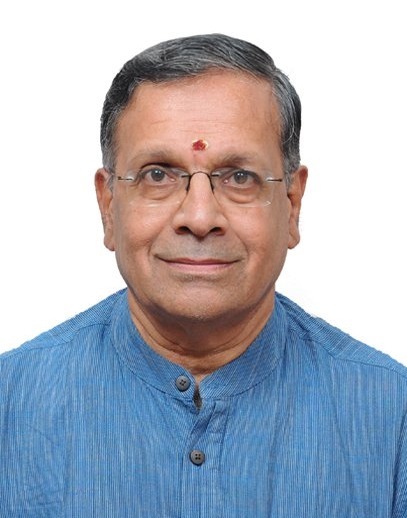
Ravi Ranganathan is a writer, critic and a poet from Chennai. Also a retired banker. He has to his credit three books of poems titled “Lyrics of Life” and “Blade of green grass” and “Of Cloudless Climes”. He revels in writing his thought provoking short poems called ‘ Myku’. Writes regularly for several anthologies. His awards include recognition in "Poiesis award for excellence" of Poiesisonline, Sahitya Gaurav award by Literati Cosmos Society, Mathura and’ Master of creative Impulse ‘award by Philosophyque Poetica. He contributes poems for the half yearly Poetry book Metverse Muse . He writes regularly for the monthly webzine “ Literary Vibes” and “ Glomag”.He is the Treasurer of Chennai Poets’ Circle.
DOCTOR - THE ALMIGHTY ON THE EARTH

I call him the protector and 'God'
The rich and poor seek his service
In pain, in difficult times, and in need
He eliminates ignorance and fear
among all patients who are ill,
who treat them as the almighty!
He treats every diseased
either mental or physical,
The knowledgeable doctor
Uses science and technology
And innovative techniques,
In his noble profession ever!
Medical facilities are costly
And not reachable to all
As every field, it's also commercial
Some doctors mint money
And some appear trustworthy
Things are vague to the innocent souls....
Lack of services in government hospitals
Treatment is unreachable to many
Lack of cleanliness and hygiene
Corrupted people rule the kingdom
Unavailable medicine and urgent needs
Is there any limit to the listing of issues?
If service is reachable to the common man
The nation becomes healthy and strong
An energetic workforce is the ultimate focus
To flourish, shine, and show an identity
Dear doctor! Be selfless but not selfish,
'Service to the man is service to God
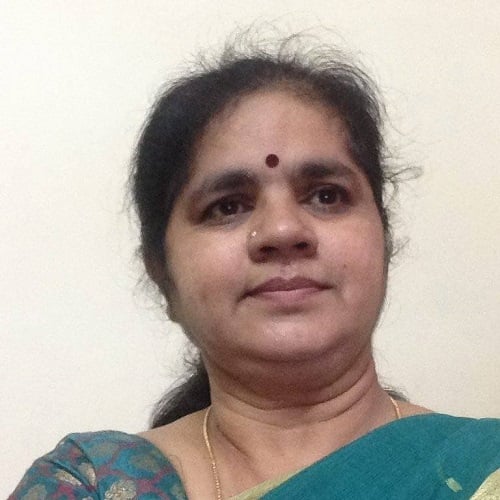
Mrs. Setaluri Padmavathi, a postgraduate in English Literature with a B.Ed., has been in the field of education for more than three decades. Writing has always been her passion that translates itself into poems of different genres, short stories and articles on a variety of themes and topics. She is a bilingual poet and writes poems in Telugu and English. Her poems were published in many international anthologies and can be read on her blogsetaluripadma.wordpress.com. Padmavathi’s poems and other writings regularly appear on Muse India.com. Boloji.com, Science Shore, Setu, InnerChild Press Anthologies and Poemhunter.com
STORY OF AN ERROR
S.Krishna Tulasi

A little, innocent house down the lane
Loving parents and their children
Three brothers and two sisters
And me, to cause and take the pain
The lane was pretty small, so was the village
The breeze was very strong, so were the men
The school just for boys, not for girls
We had to stay at home, no turning pages
No freedom of speech, push us like flies
Look downcast, no seat at the table
Even if there is a seat, you can't talk
Just listen and listen to all their lies
So obviously, I had to listen to my dad
A patriarchal society, he will take care of everything
This worked for generations long, continued with my mom
She can't express it even if she's mad
I'm a burden to his head, that's what he said
Good for nothing, just dowry to give on
Little did he know, that if I'd been to school
I'd have better knowledge than my brothers in my head
Then the time came, I became eighteen
I knew it, I knew it, they had thought it
I'll be sold, to the cages, past the guards
Where no one will care, nowhere to cry and lean
Down went me, down the sea
All my life was a puppet show, now
My sisters faced the same fate, now me too
It's a marriage of convenience, but not for me
I'm talking as a married woman of twenty five
It's been seven years since I made that mistake
Yet I don't even have a seat at the table
I'm still that bee rubbing myself against the hive
Why are we denied all the rights?
First live in a patriarchial society
And cover up the scene
Made by the world up and tight
Then we are auctioned in the market
In the name of a big, fat marriage
Post that as well, we are denied opportunities
Just stay at home, and shut our mouths
Can't a girl expect basic love?
Be it affectionately or romantically
Can't a girl expect to talk it out?
Can't do that even if she's sent from above
We end up regretting our births
Our life choices, that we never even had
Our decision, that we never even made
Always remain as the horse's girths
This is the story of an error
With no mend and no care
Take this letter as an understanding of one
Who never lived, but always died of terror
S. Krishna Tulasi from Bangalore, studying 1st PUC in Presidency PU College. Her interests include reading, writing and music. She is an ardent fan of writing. She believes in giving social meaning or sharing her knowledge and experiences for the benefit of others.

All through the night
The rains lashed on my roof.
The soothing sounds of rain drops sang lullabies
Coaxing me to a deep slumber.
A thunder now and then only heightened moment transporting me into a dream world.
The morning sky looked ominous with dark clouds.
The cold breeze extended an invitation.
Come, there’s more for you to see, to enjoy, to ponder at, to gawk at.
A perfect day for a long drive.
The rolling mountains covered with clouds
The trees looked fresh with a coat of green.
The roads looked washed up and dazzled from the light
The cold breeze was still there.
The showers of rain now and then
The umpteen channels of gushing flowing water.
Earth was in a hurry to cleanse itself, to rejuvenate.
A paper boat came along sailing in the flow
Set me ponder, Was it me who floated it an eon ago?
I rolled down the glass of my car
To be greeted by smell of petrichor,
I inhaled strongly and my whole being was in a trance.

The landscape changed as I drove on the country road.
Farmers bent sowing the seeds in the vast slushy fields, singing in unison
Smoke wafting from a thatched hut through all crevices
Eye candy picturesque breath taking views,
Soothed my mind, filling my heart with gratitude
Rains are proof that Gods design is still working, God’s will is still supreme.
God is around.
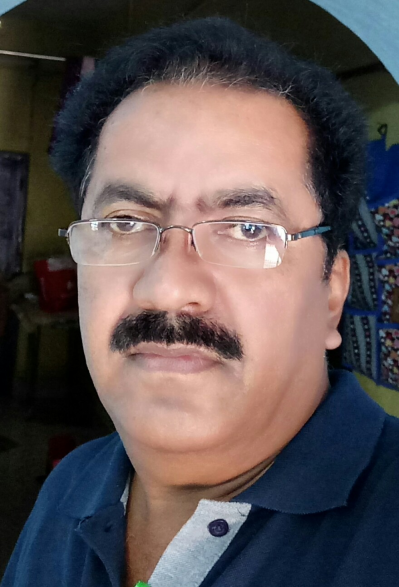
Sunil Kumar Biswal is a Chartered Engineer, Town Planner, Energy Auditor, Renewable Energy Consultant & Zero Defect Zero Effect Consultant for MSMEs. He is based in Sunabeda in Koraput District of Odisha and is an Entrepreneur. His other interests are HAM Radio (Callsign VU2MBS), Amateur Astronomy (he conducts sky watching programs for interested persons/groups), Photography and has a passion for writing on diverse topics including fiction (in both English & Odia). He loves communicating science to common man in simple language and often gives talks in Electronic media including All India Radio, Radio Koraput. He can be reached at sunilbiswal@hotmail.com and Cell No.7008580528

In myself , I am an eternal forest,
Spreading my branches, sending down roots,
I provide shade and oxygen and tiny red fruits.
I shelter insects, lizards,birds, mammals,
My red figs are bitter but provide many a cure
That's why I'm called a kalpavriksh in folklore.
I am a banyan, spreading wide and tall,
Like my country India, that shelters, nourishes all.
,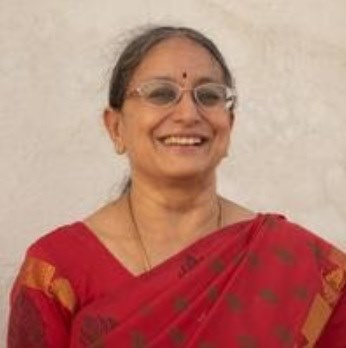
Gita Bharath has enjoyed five years of teaching middle school before starting on a banking career that lasted thirty four years. Now, happily retired, she focusses on writing and trying out kolam art. Her first book Svara contains three hundred poems, comprising narrative, humour,and philosophical verses. Her work has featured in international anthologies, and won prizes from Literoma, Asian Literary Society, Story Mirror, etc,

It is literally the cat on the wall
Not ready to jump and fall
But looking all round
To find something on the ground
Then arrives a big tom cat
Looking fiercely at its fiend
Both scream their heads off
But refuse to budge from their places
One looking up and the other down with contempt
Not caring for the stone hurled to attract their attention
But remaining steadfast in their position.
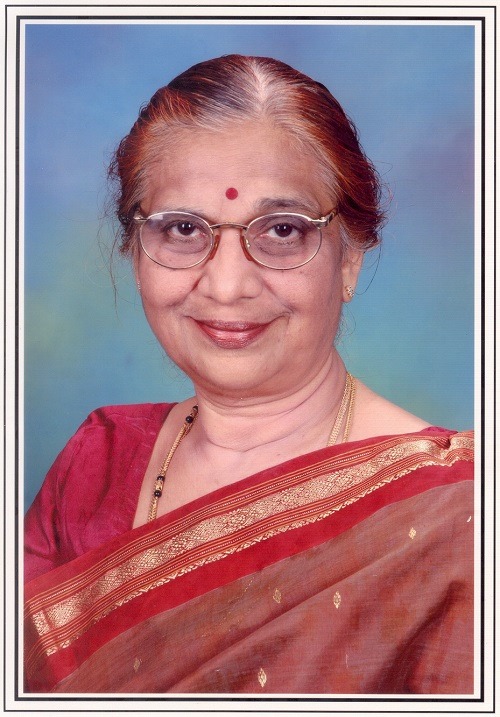
N. Meera Raghavendra Rao , M.A.in English literature is a freelance journalist, author of 10 books(fiction, nonfiction) a blogger and photographer .Her 11th. is a collection of 50 verses titled PINGING PANGS published in August 2020. She travelled widely within and outside the country.She blogs at :justlies.wordpress.com.

My covid time sits crippled
On a wheelchair by the rain window
Watching the dull sunlight slipping into
The blanket of monsoon twilight
A crowd of aching hours and days struggle out to flutter aimlessly in the wet wind
And then settle supine on the compound
walls and the broken panels like scraps of old newspapers
When darkness rides on the savourless, smell less evenings,
Street lights go up one by one
and blink indifferently at their floating images in the puddles of water
My covid time turns in the wheelchair and peers at the host of shadows scurrying about in the whispering emptiness,
A clock ticks away somewhere on
an indifferent wall
Tick.. tick.. tick....
The clock is a rotten freak,
My covid time sits and stares
At the shifting patterns on the ceiling making their way down
Slowly inch by inch
Outside the window
A moon creeps out of its ghostly cradle
and the shadows melt into the distant jungle of black
The clock sounds brazenly
Tick..tick...tick
My covid time sneers at its own faces
distorted, weird
in its shining mirror
And sits still and soundless
Listening to the stiff moments dropping
From the clock, tick...tick...tick..
Tick.. tick.. tick
My covid time is a crippled freak.
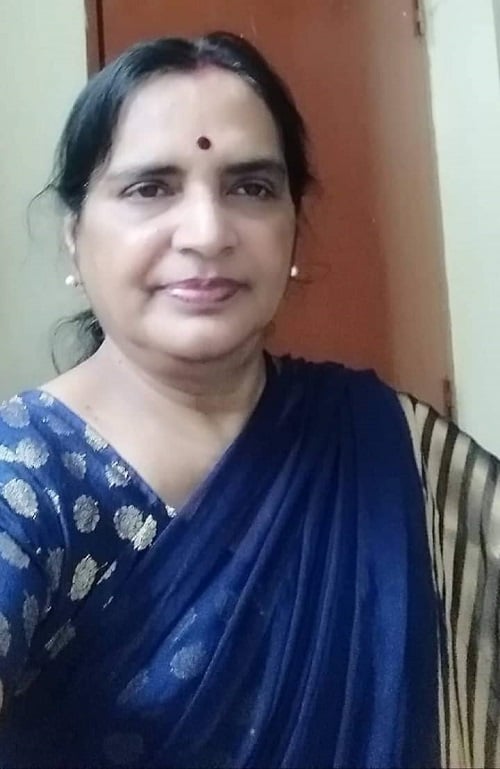
Snehaprava Das, former Associate Professor of English is a noted translator and poet. She has five collections of English poems to her credit Dusk Diary, Alone, Songs of Solitude, Moods and Moments and Never Say No to a Rose)

Ripple escalating from woodbine
Onwards from moment to moment
Is it cuckoo’s Song of Spring?
Oh no, it’s nine emotions of five octaves
Twirling around piercing the heart
Akin coloring the musical motifs with Raags
Oh what we are indulging
Upon hearing Sound of Krishna’s flute
We find ourselves in dancing of divine love
Like Gopis of Vrundavana sneaking away
To dance with Krishna whole night
Radha abandoned her body while listing
Sad! Love ended with broken flute
Oh certainly not! It’s undying! Its love!
Incarnation of Love often landing down on earth
Flute catches the music again in the air
Bamboo reed brings out to song of my hart
By its own Course of scripture
Love draw in from the secret valley
Ambling with the wonder swell

While I was in the arms of Midnight
Intoxicating fragrance of blue lotus
Deluding my own existence, stilled for a moment
Wavy dark blue hair, dusky princes
Lotus petal eyes, Soft eye lashes
Round firm shapely thighs
Finger and toes like champak Petals
Well-formed swelling breast
Narrow waist like middle of sacred vedi
A playful half smiled lips
That puts the lightening shame
Like new born moon in the sky
The unblemished splendor sculpted
By the world’s most gifted artist
Soft spoken appealing eye asked me to dare
To revamp the pious in integrity
But avowed rulers are inept bringing cease-fire
In lieu of stimulating of virility, I have the guts
To win as in her to make tenets of love
I took challenge to lift and string a bow
Fired arrows to pierce the eye of golden fish
What is looking at its reflection in water
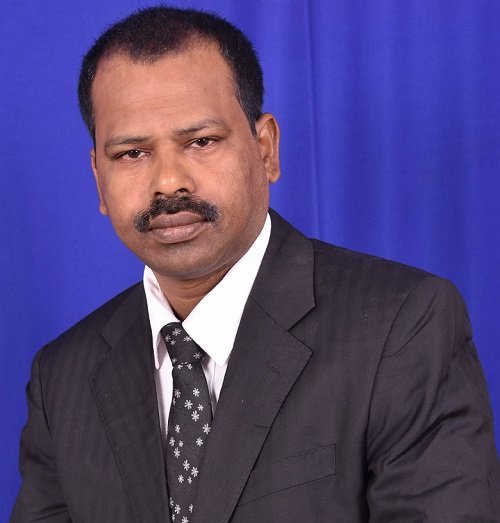
Poet Sri Ajit Dash by birth inherits his forefather Pariskhit Rathasharma’s legacy as one of the Navaratna Ministers of a Royal King. Being an astute organiser, socio-political as well as Development activist, he has made his presence globally. A freelance journalist and motivator, Sri Ajit Dash leads his life with lots of diversifications as an expert, imbued with utmost passion in the fields of Literature, Language, Environment, Governance, Entrepreneurship Promotion. He is experienced in Media house promotion and Electoral Politics too. Now a days his study is going on in the Use of Multilingualism, Wavelength and frequency of Odia Script, Words and Sentence pronunciation by different speakers in a multilingual perspective. Prof D. K. Ray, Late Prof of English, had compared his poems with the legendary Irish poet W. B. Yeats in the preface to his book of poetry “Midnight Dream” published in 2017. Sri Dash follows his father’s poetic accomplishments as his recently published book "Wings of Burning Violin" has been a great success.

the heart aches crumbling me down,
numbness takes over then.
this pain is never ending, i felt
this too shall pass he said.
Tried hard to rejoin the self-
broken and shattered.
The feel, the smell, the sense
still haunting me.
Yes this will pass-
Not to Eternity
To that corner of the heart,
Covered in ashes,
with dark flames, consuming me.
The dreams, the love and the hopes
We shared-all in vain.
The dream accomplished
to futility
The love expressed
to vaccum
The hope still remains
Like a life force.
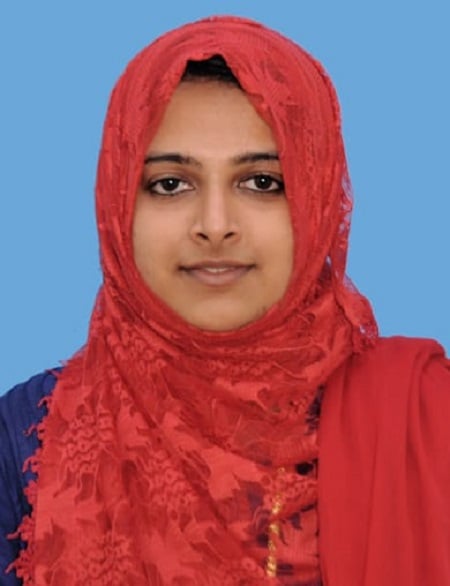
Binsha P A is a postgraduate in English Literature and is an aspiring poet. Her poems have been a part of antholgy 'The Unsung Thoughts' in 2020.She is a passionate reader and loves penning down about what she reads. She writes book reviews and poems in her blog literarydrops.blogspot.com and in social media.
ANY WRONG ASKING FOR THE MOON?

What's wrong in my asking for the Moon ?
The best things to aspire for?
Things like the Sun to shine soft
The Moon to smile bright ,
I can see things right in the night ,
The Wind to blow faint ,not a tempest ,
But soothing finest ,
The Mahanadi not to jump its banks ,
Not to ravage or torn the greens ,
But to maintain a steady course, showing a majestic grace
Not thin, nor fat, but for eyes to make rest,.
Elegance of good taste,
May I not ask Nature ,not to be an extremist ,
Let Sun smile ,not roast ,
Let the writer write ,not boast!
Empathy ,not sympathy ,
Not sermons ,but versions with humility
Verses of humour or even satire ,but not satanic !
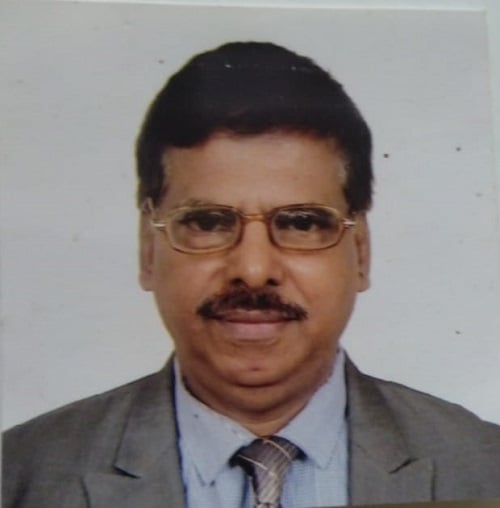
Dr. Niranjan Barik is a retired Professor of Political Science from Ravenshaw University, Odisha and is currently attached there on teaching and research on an ICSSR project. He is passionate about literature and writes poems, short stories.
BROTHERHOOD
Mrutyunjay Sarangi
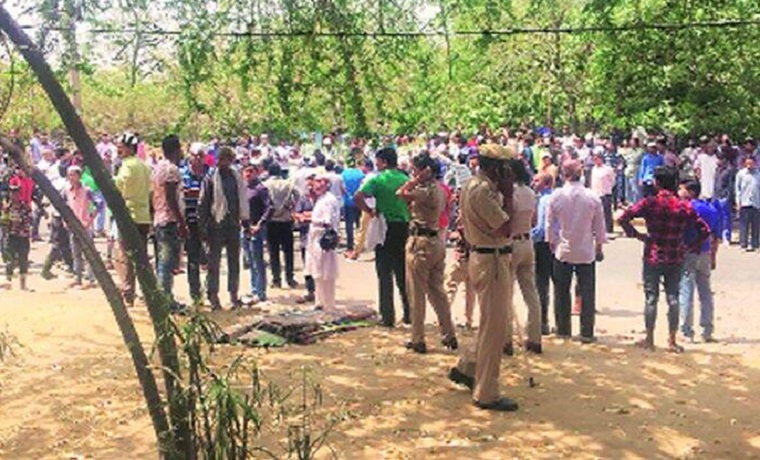
What brand do you sport, what emblem,
What are the words on your shirt,
What smile you wear on your sleeves,
What messages are etched in your heart?
Which God you worship,
Which scriptures you read,
Which idol dangles from your key chain,
Which photos adorn your office walls?
xxxxxxxxxx
What dreams wake you up in the night,
What cracks dent your wall,
What whispers kill your sleep,
What whimpers drive you crazy?
Which wind blows to shake your trees,
Which noon fire licks your roof,
Which dogs howl in your streets,
Which birds fall dead at your door steps?
xxxxxxxxx
What if I rise from the garbage dump frustrated,
What if the dogs won't let me have a bite of the leftovers,
What if the hospitals won't touch me,
What if my threats of self-immolation fall on deaf years?
Which doors will you open if I come knocking,
Which lights will you switch on,
Which songs will you sing for my tormented soul,
Which prayers will you offer for me?
xxxxxxxxxxxxxx
Will you hold my hands to share,
The agony of the opportunities gone by,
Will you tell me the stories of the unfulfilled promises,
And the loots, the arson and the burning sky?
For, when the curtains fall, my brother,
Neither you will remain nor I,
We will be gone - two citizens of a bruised nation,
Bonded by our anguished cry.
SHORT STORIES

Although its name is Facebook, this social media seems to be an assorted gathering of faceless and voiceless lives. Angel found herself to be one of those hypocrites, but only recently. She was what she thought only others were.
Even DPs and profiles on Facebook are only paper masks. Humans could easily be the only species with no idea who they are. She recently realized with a jolt that she was no exception.
The reason was a comment on a post she wrote on her Facebook wall. Years ago when she started her account, she had made a decision that her presence on Facebook should be absolutely honest and transparent, unlike others. She believed that she was doing a good job of it. That belief was challenged today by someone, a stranger. The comment was that from reading her posts, he was sure that it was the fake account of a man clamouring like a baby for some kind of attention.
How quickly she began to suspect her own integrity. Wasn’t it possible that she might have an alter-personality she didn't even know she had, or an element of another personality lurking in her own, one that she didn't even suspect to be there till now! She wondered if things had been different, how bad it would have been. What if someone had said this to a man, that he was the fake account of a woman? That would be very humiliating. The story would have been different. Society is biased in strange ways.
A cousin of hers once tried to remind her that she used to act like a tomboy when she was very young. She tied to bridle her thoughts which were racing now. Couldn't this be a comment made by someone she knew? An innocuous prank? It shocked her all the more. Earlier that day, she had discussed this issue with many friends. If any of them were behind this prank, how much would laugh at her later! Tell everyone and see! For the first time in her life, she realized that Facebook was a world of darkness.
Like a tiny spark in that darkness, another comment appeared that same night. A response to her angry reply mixed with sarcasm. It had got a lot of likes already. Readers are more likely to like women's posts. They themselves fly in like locusts to encourage those who make fun of them.
” This is a response from a profile with only a woman's picture as the display picture,....very convinced....that means we are all just bastards...this is beautiful...goes a long way...I step down. "
She wasted no time. Went straight to that profile. The name was Tulsi Baby. You could tell from that strange combo that it's fake. She noticed another interesting thing. Tulsi and Baby are unisex names. She suddenly noticed her own name. Angel. Although it is a female name, angels could be males too. So that's the point. Accusation is the best defence. He accused her to hide his own hypocrisy. It might not be a he, it could be a she. If she had got the handwriting or something, she could have confirmed it. No chance for it anyway.
She found a way. She copied some of the posts on that wall and sent them to some friends. Challenge! Find out whether it is male language or female language. Within minutes came the discoveries of Sherlock Holmses. She couldn't stop laughing. Boyfriends found it to be a girl's language and girlfriends found it to be a man's language.
Admit defeat. A feminine trick. Win by pretending to lose. The Trojan Horse Chess Strategy.
She sent him a message. A warm goodbye. Then waited for a long time for a reply. As the seconds passed, she grew restless. Where had that person gone whether male or female? If it is a girl, she would be asleep. If it was a man, he wouldn’t have reached home.
A few seconds later a message came in response, asking to accept the friendship request. She decided that she would do it only the next day. Suddenly she changed her mind. She accepted the request.
And with that she caught the drift of her own mind. Caught red handed, her mind stood flustered for a moment. She found that she felt the need to connect with that person as much he or she wanted to connect with her. Every action has an equal and opposite reaction, she recalled.
It's been months since that night. Not a day went by without Angel chatting with Tulsibaby. Each could now comfortably write the other's biography. Even the smallest things had been shared. On the days when the internet went down or the power played truant, Angel was feverish. What if she couldn’t chat that day? Some such nights she lost her sleep and was happy the next day to find that the other side had felt the same way.
It was not Facebook that told her about the first birthday of their friendship. Their notification came only in the morning. In the middle of the night, a greeting came from Tulsibaby. An invitation to meet in person. Dinner at a famous restaurant in town.
When Tulsibaby told her that there was a surprise waiting for her at the restaurant, she thought of everything possible, but nothing would have been farther from what awaited her. Her friends were right in their analysis.
It wasn’t a single person who awaited her. There were two people. A wife and a husband. Even the name was genuine. Baby was the husband, Tulsi, the wife. The duo had been at it together.

Suddenly she wondered if she had said something she didn't mean. She shuddered when she remembered that many things she shared with them were not exactly proper or decent. If she had chatted with each of them separately, she would have avoided saying many things or said them differently.
She felt that there would have been some hypocrisy in that. We actually show different faces to different people. Some things should not have been said to Tulsi, same should have been hidden from Baby. Isn't it like this in life too? Why blame Facebook? The truth is, we are all faceless. We hide things.
By the time she woke up from her thoughts, the waiter had already arrived. She didn't feel like eating anything because her mind was full. The couple ate well. Their three children were abroad. They were very busy. Relationships that were rarely limited to phone calls. They didn't even expect to see their children again.
Angel suddenly had a thought. She was their daughter for the past one year. 365 days went through her mind in a minute. She saw her dead parents in them. She let out a deep breath when she realised that she had taken a whole year to fathom the depth of that relationship. Life is like that. Often, we wander like the blind in search of what is right in front of our eyes.
And she realized something about herself too. Somehow her mind had grasped the essence of things. She had bonded with them more intensely than they had. She had waited more eagerly to read their chats than they had.
Angel wiped her eyes.
They only had an hour to spend with her. Tulsi arranged an Uber taxi but Angel insisted that she would drop them herself.
While driving, Angel wiped her eyes several times without letting them notice it.. They were also doing the same. We try to hide even divine feelings from others.
They asked Angel to stop the car in front of a palatial house. As if all .the ghosts in a graveyard had come out. together, some very old people were waiting there with happy and jealous faces for Baby, Tulsi and their adorable daughter Angel, whom they had adopted from cyberspace.
Later, after promising to return soon, on her way back to the car, Angel covered her face with a hanky and wept into it, without knowing why.

It has been a long day but it had ended in triumph. The woman was sentenced to seven years for culpable homicide. She had brought death to her husband.
Vijeesh, however, was dispassionate. Considering the effort he had put in to get this punishment for the murder of his dearest friend, he should have been shrieking with happiness. But he was relatively quiet. Was he baffled? Hardly.
Vijyadas, our common friend, closer to Vijeesh than to me, was working in a bank as a gold appraiser. His wife Sreejaya was generally considered a meek and mild woman. But Vijeesh had a totally different opinion about her. I always thought that being so close to Vijayadas all his life, Vineesh and Sreejaya might be jealous of each other over Vijayadas. It was partially true. The woman behaved properly to me but to Vijeesh, she had been rude on several occasions.
Unlike either of us, Viyayadas was a drunkard. Like all people who were so, he blamed his wife for it. Vineesh agreed with him on this but I always blamed Vijayadas. I pointed out how irresponsible he was in other things too, like the education of his two children. They were bright kids but Vijayadas never bothered to put them in a good school. He was so negligent about this that I had to accompany his wife when she wanted to move her children to another school.
To support her family, Sreejaya went into multilevel marketing and I too found some good customers for her. The wares were very expensive, I didn’t buy any. Sreejaya was so successful with her marketing that she was soon selected to be part of the state team, mentoring even those who were her seniors.
Unfortunately, the government cracked its whip and the multilevel marketing companies had to shut shop. People troubled Sreejaya and her husband to get their money back and somehow she was able to solve the issue.
Around the same time, Vijyadas mentioned the heavy debt he had incurred and told us he was about to sell part of the family property and the shop they owned. I was surprised. I thought his heavy drinking had brought this about. It took me years to figure it out; he had to sell the family property to pay off the Sreejaya’s customers.
I thought that was the end of his troubles. But actually, his troubles were only beginning. His father passed away and the family property was shared among the children. Vijayadas got the lion’s share on the tacit understanding that he would take care of his widowed mother. One of his siblings returned the property to him since his share didn’t amount to anything.
A few weeks after the papers were settled, he sold what was left of his share and went to live with his mother-in-law. Soon he borrowed heavily and built a huge house on her property.
Vijeesh and I wondered where he was heading. Both of us found that having lost all his wealth, he was now totally controlled and manipulated by his wife. She didn’t look meek and mild anymore. I too found that her soft-spoken nature was only a facade.
However, she was still close to me and consulted me on several things. Once while chatting she disclosed to me that she was giving a deaddiction medicine to her husband. She had bought it online. I could not blame her since the man himself would have objected to taking any medicine. I shared this with Vijeesh and he said, “Are you sure it is not some small daily dose of potassium cyanide?” I didn’t answer him. I thought he was very prejudiced against her.
After that Vijayadas abstained from drinks when we were around. Without letting us know, reportedly, Vijayadas drank in the company of his co-brother. His wife would have been unaware of this or, as we suspected later, pretended not to have noticed. For the first time in his life, he flamed out at his wife. He accused her of having a secret relationship with her brother-in-law, her sister’s husband. I thought he was only finding more reasons to drink. Vijeesh disagreed with me and cited several instances when she was seen with her brother-in-law. I said, “In that case, let her enjoy her life. She might be fed up with this drunkard.”
Vijeesh fought with me over this. He was very close to Vijayadas and could only take his side against the whole world. He said he had a mind to kill that brother-in-law.
Hardly a month passed by and one day we heard that Vijayadas had a heart attack and passed away.
We rushed to the hospital but the body had been taken home.
When we reached home, we heard strange tales. Three people gave us three different versions of the incident. While one said that he was found dead at the bus stand, another said that he was found dead in a friend’s room. A third story was that had walked into the hospital and dropped dead there.
We found every story bizarre. But we could not give it much thought since we had to be busy with another important matter.
The bank refused to consider this a death-in-harness case and give a job to the wife. Their arguments were that an appraiser is not an employee of the bank but one who works on a contract basis. Moreover, it was a skill job and could not be given to just anyone, especially a woman who could not tell between gold and copper. The relatives pushed the bank employees much and they relented. They agreed to hire Vijayadas’s son who was an undergraduate at a fine arts college. That meant he would have to drop out of college and Vijeesh was dead against this.
I knew why he was so strongly against that proposal. Vijayadas had always wanted to be an artist and he had everything the course needed except the money. So, when his son joined the fine arts college, Vijayadas considered it his personal victory over his circumstances. Now, Vijeesh wanted his friend’s son to fulfil his father’s wish but no one else seemed to care. For them, fine arts were meant for drug addicts.
Vijeesh finally scared the people at the bank. He told them he knew about Vijayadas’ death. That evening there had been a liquor party at the bank. Vijayadas collapsed while the party was going on. Since it was illegal to hold such a party on the bank premises, Vijeesh’s words scared them and to silence Vijeesh, they went out of their way to hire the widow. This made her very happy and in spite of her mourning period and rituals, we found her in great spirits.
Two days later, Vijeesh said that he had only been bluffing about the party at the bank but his guess had hit the bull’s eye as it had scared the employees.That was when I said death would have happened because he was not supposed to imbibe alcohol while taking that medicine.
Vijeesh stared at me for a few seconds. Then he shouted, “That means it was a murder!”
We pieced it all together. Someone had mentioned the doctor having had some suspicion. He had repeatedly asked the relatives whether Vijayadas had been taking any medicine. Now it all made sense.

It was a beautiful plot hatched successfully by her and her brother-in-law. She had given him the medicine and her brother-in-law had enticed him to drink. She had made him sell all his property and use it to build a house on her own property. Through his death, she got a huge insurance amount and now a good job for which she was not qualified.
Two days later, we made a complaint at the SP’s office that we had some suspicions about Vijayadas’s death. We provided the police with all the details though some of it was pure guesswork. But it had an effect.
The body was exhumed for postmortem. On questioning, the wife admitted that she had given him a deaddiction medicine without his knowledge. It was mixed with his breakfast every morning. It was done with good intentions and it seemed to work. The man had abstained from alcoholic drinks after that.
The post-morten showed a good amount of disulfiram. A government doctor validated that taking alcohol and disulfiram together could effect a heart attack. The doctor who had confirmed Vijayadas’s death told the court that he had had the same suspicion because of the symptoms but the relatives had told him the man had not been taking any such medicine.
The brother-in-law committed suicide during the trial and the wife was sentenced to seven years imprisonment. Her own words were turned against her by the public prosecutor. Added to this were her chats with me in which she had told me she was administering the medicine. The container of the tablets had clearly indicated the side effects of the medicine. This meant she was aware of the danger involved. Strangely, the brother-in-law used to take him to pubs and bars, even though they hated each other.
There was no evidence to think that Vijayadas was aware of the medicine given to him or its consequences. The prosecution had done a good job.
Three months later, Vijeesh told me why he pursued the case so strongly and vehemently. He said that there was a chat in his phone which would have saved the lady from punishment. I was baffled. Why the hell had he done that then?
He took out his phone and showed me the chat. He said he had taken it as just the paranoia of a drunkard. It said very clearly that Vijayadas had been aware of the medicine his wife was giving him secretly. He was also aware of the reason why his brother-in-law was buying him drinks.
“Vijeesh, I know that my wife and brother-in-law are in a relationship and they want to do away with me. She gives me some medicine and all I know about it is that it can kill me if I take alcohol again. Her brother-in-law who had procured the medicine now buys free drinks for me. Can you imagine that scoundrel being nice to me in any way! If they succeed in killing me, I will be happy to die at her hands. I am sure my children will be taken care of by my friends.”
I wept wildly. I had not wept like this even the day Vijayadas died. Vijeesh hugged me and consoled me.
Up in the sky, a star staggered and twinkled.
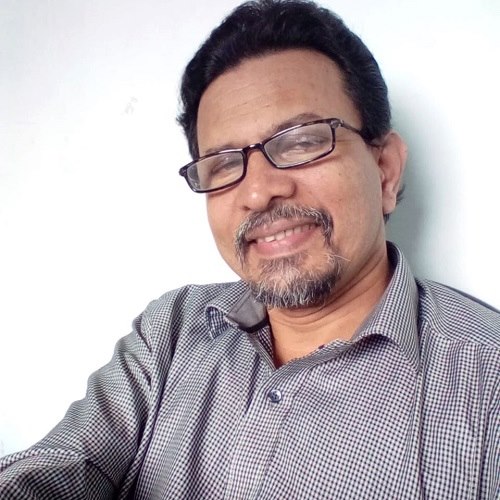
Sreekumar K, known more as SK, writes in English and Malayalam. He also translates into both languages and works as a facilitator at L' ecole Chempaka International, a school in Trivandrum, Kerala.
ANTI-SMUGGLING – whispers, mumbles, and grumbles
Prabhanjan K. Mishra

Ekant reluctantly entered his new anti-smuggling office room and sat on his swiveling chair. It was a small room, ten by ten, with no attached washroom like his earlier one. However, for this new charge he was profusely congratulated by his colleagues, though with a dubious grin on most faces. Their grumbling whispers still echoed in Ekant’s ears, “Here goes the so-called honest man who has pocketed the most lucrative charge where even the Devil can’t tread without a deep pocket.”
The earlier occupant to his present charge, who had passed the baton to him the previous day, was already seated in a visitor’s chair opposite him. He was there on Ekant’s request for drinking a cup of tea and parting with some valuable tips to manage his new and sensitive responsibility.
Ekant disliked the charge. It was said to be a high voltage naked wire. He would have liked to head a sober section without reputation for notoriety. To add to his discomfort, his predecessor, senior to him with more years of service in the Department, sitting opposite him, looking corpulent and unhappy, had warned him the previous day, “Here you have to walk on a sharp sword’s edge. It is rumored, you are here to whitewash the unit. Be on your guard, Ekant ji, it may stain you permanently with its own dye.”
He had lowered his voice conspiratorially, “Even the powerful lobby may overthrow you before you find a foothold. You must remember ‘a rolling stone never gathers moss’, and by hook or by crook must stick around for some time".
Ekant had laughed out loud, and said, “I understand boss, the man in charge and on this chair should think like a matured man, how to make hey when the sun shines. But my hey would be a different hey than the ordinary. I won’t hush up scandals. I will kill the root.” His senior and predecessor was not sure if Ekant had been learning from his cues,or being sarcastic.
Now Ekant told his senior colleague, “I have done a little homework.Sir, I learnt that the local media reports a very humorous but grim picture of us. They spread a canard that our Anti-Smuggling Wing officers stand guard when the contraband goods are unloaded from their seafaring vessels into trucks and the trucks are escorted across the check posts to cross the borders safely until the officers of the neighboring states’ Anti-Smuggling Squad take over the onerous task of escorting the contraband goods to the smuggler’s safe dens. I know these are baseless scandals. My efforts would be to prove their report as hogwash. I think, sir, you don’t mind that approach.”
His outgoing senior colleague scowled. He simply got up and left. Ekant called him from behind, “Sir…sir…my dear sir, my tips? You are taking me wrong. I was only learning the tricks from you.” But the senior didn’t look back.
Just then Ekant’s big boss’s emissary, his trusted superintendent, who after clicking his shoes, the department’s practiced method of paying respect to a senior, came very close, as if to whisper a state secret into Ekant’s ears. Ekant missed a beat and stiffened.
But what he heard was a damp squib, “Sir, the big boss wishes to have your ears. Only your confidential ears, Sir. Tomorrow at 10.30 sharp, in uniform in his office.” The man looked, moved and spoke with a servile attitude, oily and slimy. His presence felt creepy, almost like that of a reptile, acquired from living in dark and damp places.
Ekant's day was spent visiting the Anti-Smuggling staff in their sitting areas. Ekant sat across each and heard about his or her part of the job to know what was going around. He started with his headquarters senior most superintendent-in-charge of his staff, going down to the other two superintendents, the ten odd inspectors, a few clerks, and around two dozen sepoys. Besides understanding how the section ran, he tried to instill into them trust on him as a harmless boss. Because the rumors were against him.
The next morning, he went and stood before his big boss’s chamber, in formal uniform sharp at ten thirty. The chamber’s door stood open, but it was empty and silent like a tomb. No sign of the big boss or any activity.
After cooling his heels for more than half-an-hour outside the office of the big boss, he saw the boss ambling along the corridor, a little man dressed like a clown, a dark-brown trouser with a tucked-in sparkling blue shirt and pink tie. A tight yellow coat completed his dress-sense. He uttered, “Hulo..hulo..hulo my boy. Are you there? Yes, you are there, I can see you. I love that sort of punctuality in my boys. See, I am very particular about the time myself. Ten-thirty means ten-thirty. Follow me, what’s your name.” Ekant intoned, “Sir, I am Ekant Sharma.”
With the pithy remark on punctuality and obvious pretense of forgetfulness about his name, Ekant’s unpunctual big boss entered his chamber followed by Ekant. He asked Ekant to shut the door behind him. The curtains were already drawn from the single window behind the big boss’ chair, and a mellow sunlight was filtering into the room with patches of light and shadow. The room smelled of freshener and paper files, the perfect officious odor.
The big boss on his big chair, invited Ekant to take a visitor chair and affably asked, “Coffee or tea? Milky or black? Sweet or bitter?” Ekant clicked his shoes, took off his cap, and sat down on a chair. He said, “Thank you Sir. I drink tea with milk and sugar.” The big boss barked a sharp “Yes” looking at a shadowy left side corner of his big room that had seemed totally empty to Ekant earlier.
Ekant, following his big boss’ gaze, noticed the ubiquitous superintendent, the much-touted Man Friday of the big boss, stir from a sitting position in the shadows. It was as mysterious as in a Kafka fiction!
“How did I miss this man inside all along the last three-quarter of an-hour I have been around here? How did the fellow sit there without stirring the air or making the smallest of sounds, breathing or giving a half-cough? How did he completely merge into the background and silence?”, wondered Ekant. The seemingly ubiquitous shadow now clicked his shoes to the big boss’s bark of ‘yes’ and left the room.
The superintendent returned with a tea-boy who served the big boss and Ekant two cups of strong black coffee and no sugar to sweeten the brew or milk to whiten it. Ekant shrank back from the bitter fumes his coffee exuded. He hated its black look also. He couldn’t understand why three sets of choices were asked of him by the big boss about his cuppa, if he had to be served only bitter black coffee? He thought it to be a huge mistake by the superintendent, so, he asked him, “What about my tea with milk and sugar?”
The superintendent remained expressionless. But the big boss, who was sipping his coffee with apparent pleasure and eyeing Ekant like a lizard at its worm, butted in with a brusqueness, “Ask me. Not him. My pantry doesn’t have tea, milk or sugar. I asked you the choices out of sheer politeness. But haven’t you the minimum politeness to accept whatever your host could manage to offer?” Ekant was taken aback by the weird logic on politeness. He kept his cool, but decided to let his coffee go untouched. His reply was equally brusque, “Sir, I hate black coffee. Sorry.”
“I like your directness boy. I like it.”, spoke the big boss. A spell, bad or good, had taken the room in its grip, it appeared to Ekant. The spell broke as his big boss, seemed refreshed by drinking his bitter blackcoffee, suddenly spoke…
Boss – You know……. (A long pause)
Ekant – (Waiting for a minute) No Sir, I don’t know anything ….
Boss – (Suddenly waking up) They warned me about you. That you never beat around the bush. I can see that. You don’t believe in comma, hyphens, conjunctions and interjections or pauses. You go directly to the full stop. I see that too. You are a man of action, they say. (Ekant then heard him mumble ‘But you look so mild!’ Ekant mumbled back ‘Wait and see Sir.’)
His big boss indicated at the coffee with eyes and urged him with a facial signal to sip it. His facial signal looked comical to Ekant. Often his girlfriend would signal that way if she was too shy to say something. But Ekant shook his head imperceptibly with crinkled nose, indicating that he wouldn’t. His boss gave up with an elaborate shrug. Ekant had to see it to believe it. The rumor that the man was a joker, a tramp, was confirmed. But Ekant guessed the crankiness and genial ways were a façade to mask a shrewd mind.
Boss –You know….. (Again, a long pause. But this time, a wiser Ekant didn’t want to interrupt the great man’s flow of thought and waited.) Well….. (Another long pause) Ekant, my boy, Smuggling must stop along our long coastal belt. Be ruthless with the smugglers and be ruthless with our staff. You must have heard the joke going around. Local media calls my officers pirates and me ‘The Chief Pirate, the pirate of the Caribbeans’. (Ekant agreed mumbling under his breath, “Very well-coined title, sir.” And his big boss mumbled back, “Shut up.” Then he continued loudly -) You are to stop that rubbish. Erase that blot. Eh?
Ekant – (Ekant restrained from uttering a “Ha!” in reply but said) Yes Sir.
He stood up, clicked his shoes, turned and left. He left, as his boss was opening his mouth to utter some more golden wisdom. Ekant thought those would be irrelevant homilies, trivia and just drivel. He almost ran out of the room as if to be on his job fast.
By early evening all the superintendents of Anti-Smuggling formations of the outports of the state had arrived at the headquarters to Ekant’s urgent summons over the telephone. They all sat for a close-door meeting. Ekant emphasized his methods and concluded, “No means no, and I repeat ‘no’.” The team responded, “No means No. Yes Sir.” Ekant liked it. No mincing of words.
Ekant gave a treat to his superintendents to dinner after the meeting. He took them to an out of the city restaurant visited by only affluent diners who were naturally very few. With the exaggerated gesture for setting an example for his staff, he paid the fat dinner-bill from his own pocket. He wanted to make an example for them, and pass on a message that officers must manage their expenses from their own pocket and not expect either their sycophants or juniors foot their bills, also use no extraneous resources.
But whispers gave him a practical lesson the next day. Everyone in his office building appeared to know of the fat bill being paid by Ekant personally. Half of the office believed, “The upstart has salted away a fortune in his earlier posting.”
From the next week onwards, he called all outpost superintendents one by one and repeated the procedure of a game called ‘Russian Roulette’ while talking about his strategy. He explained, “It is a game with a revolver and a single bullet. The bullet is loaded into one of the auto-revolving six chambers of the gun and nobody knows which chamber is having the bullet. The gun is put to head and the lever is pulled. The man dies or lives, depending on a chance if he gets one of the five empty chambers or the single loaded chamber.”
Then he would say to each, “You are my man. I choose you after looking at your records.” Here he would invariably detect a shifty look of disbelief, and add, “I hope you won’t be the unlucky man to get the bullet of the Russian Roulette. You don’t know which chamber is loaded but I will be knowing it all along. It is a high secret between you and me and keep it as a secret. I don’t pardon betrayers; you might be already knowing from your homework".
Ekant couldn’t guess what exactly worked: whether his meetings, unpredictable changing strategies overnight, pre-emptive guess of certain known moves of the smugglers and defeating them by counter moves or his extensive tours, just innocuous looking visits of check-posts and the offices and homes of outstation superintendents and inspectors to inquire after their wellbeing over a cup of tea. It could be his Russian Roulette also! He never had raised his voice or shouted at any staff, and he heard that it served a salutary purpose. He heard a few of the staff talking, “He is the first boss who treats me as friend. I can’t dream of betraying a friend.”
He took his old mother to various holy sites that were within the area where his staff was discouraging smugglers, and on their way, he would show his curious mother how his alert staff guarded the interests of their country at the check-posts weathering the sun and rain.
At times his mother would be so overwhelmed by Ekant’s praise of his officers’ sacrifices that she would hug and bless them like their own mother. This news percolated to his big boss who while taking stock of Ekant’s work, commented on his mother influencing his staff to stop smuggling, “A cool move, Eh! Ekant ji, your whole family at the Department’s service. Is the charge so interesting?” Ekant had replied, “No sir. Honesty is our family disease.” The big boss cringed.
But something was working. The smugglers, who had become notorious for their contraband goods of explosives, drugs, gold, arms and ammunitions in recent times, were running helter-skelter. They seemed to flee his coastal area to some other greener pastures or were holidaying, biding their time for the better, he heard.
Searches and raids of the premises yielded less and less contraband goods, and local media printed almost zero scandal. He heard the media were restless as the sensational scandals of smuggling were drying up. Whispers and grumbles overcame the local media’s patriotism and they talked fondly of the old time when they could serve people with savory-news. Even his big boss grumbled, might be missing his title ‘The Pirate Chief of the Caribbeans’. Once in a monthly meeting he said in undertone, “I asked you to prevent. You killed it. I don’t like it.”
During another monthly meeting, he shouted, “With so little or no smuggling, how can I justify my anti-smuggling staff?” Ekant was confused and wondered, “Do these johnnies want the smuggling back again?”
A year had sailed by. Finally, the sea appeared calm to Ekant, free of tsunami or sharks. One day he just felt nice and after lunch had decided to have forty winks on his official easy-chair. Also, he wanted to discuss with his big boss that very afternoon, how certain catches escaped his net that was a secret between him and the big boss. Wasn’t the boss’s holy cow, his special superintendent who remained on the background all the time, leaking select information?
But Ekant was not lucky to have his forty winks. He was summoned by his big boss. He rapped on the big boss’s close-door and heard his bark, “Come in Ekant, my boy.” He had just been informed of a big cocaine consignment being smuggled by a well-known drug-lord, and he found the smuggler himself sitting with the boss now. Before he could open his mouth, his big boss said, “I know of the cocaine information already and making my strategy. It is a red herring just to divert us from our good job. And I would call you in an hour to discuss the strategy. Now leave and wait in your room.”
For half-an-hour, Ekant fumed in his room over the affront with which his big boss was sitting with a king-pin of smuggling and declared his cocaine information as a red herring. He went to his big boss’ office on a summon over telephone.
His big boss smiled genially and indicated Ekant to keep quiet. He said, “My boy, you have done a good job in your own style for more than a year. I am immensely impressed. But not your staff, not your colleagues, and nor the public are happy with you.” “Public?” Ekant couldn’t stop wondering aloud. Big boss continued, “I haven’t finished, my boy. Even people at Delhi are not happy. They complain about the dwindling figures I submit. They complain that the things were no more robust like in the past. You know, they and everybody love ‘Chor-police’ game, not the ‘Russian Roulette’.”
The big boss without losing his cool continued, “A very clever question, who is the public? The answer to that is not easy. You have thrown many people out of their jobs who worked for the two-pie smugglers. Their families suffer for no fault of theirs. Even the ordinary man on the street who had an occasional smoke of that holy grass from the pot, are going after other more serious temptations like the pleasure of flesh and poisonous country hooch. The holy men are complaining that they don’t find the things that would give them the spiritual high. Now you know your answer, who are the unhappy public.”
“No regrets my boy. Every posting ends with a transfer.” With that philosophical statement, he beamed and added, “I believe, in your new charge, you would face greater challenges. The ‘Internal Audit Department’ is full of old garbage. I want your efficient hands to put that house in order. Just go there now, take charge and start the good work.You will love it. It is your type. Best of luck, my boy.”
When Ekant returned to his room, he found his predecessor on his chair. He had moved from Internal Audit to Anti-Smuggling office, a minute ago probably. He smiled conspiratorially at Ekant with a friendly wink, “Boss, you have done irreparable damage to my network. I am to set the house in order again from scratch. That would be a lot of labor, though.”
He grew serious, “By the way, what is this Russian Roulette, boss? The superintendents told me you described that game to them and they applied it successfully. Also, they passed it down the hierarchy who applied it. I heard how the game is played from them. But I couldn’t connect that with our anti-smuggling work. If it has stopped the smuggling, I am to think of some antidote. But would you mind telling me the connection? You know, I can’t ask a subordinate staff, that is below my dignity.”
Ekant smiled and walked away. He decided to walk home and take his mother to a Sat Sang after evening tea. He would ask his mom to pray for these ignoramus souls.
MRS DABBAWALLA AND RAI BAHADUR
(Translated from Odia by Ajay Upadhyaya)

With a name like Romy Dabbawalla, her surname was surely not one of her assets. From the combination of “Dabba” literally meaning box and “walla," a suffix to denote people dealing with them, she was known as the “Box people”. It made her the butt of the jokes in the town, although, nobody ever dared to laugh on her face. But this did not stop us from gossiping behind her back about her peculiar name, with our theories on her origin and speculations about her ancestors. We assumed, her forefathers earned their livelihood from making boxes. Of course, we did not have the guts to ask her for a confirmation or otherwise of our pet theory.
It was a strange coincidence, as to how we came to know Mrs Dabbawalla. On a fateful day, when our father visited this remote place in course of his business, he fell in love with it. It turned into an obsession of getting a house built here and settle down. Interestingly, he could not identify any redeeming feature of this barren land, to support his decision, beyond his insistence that he liked the place. But who are we to question him? He is, after all, our esteemed father.
It was of little interest to us as to how much material went into building our house. But when we returned to the area, the locality had been transformed. Many outsiders from the neighbouring states moved in, for reasons best known to them. The colony expanded soon and when all the building work was completed, it was a sight to behold. Th feel of the colony was unique; its residents were a diversified bunch, varied in their attire, manners and food habit. Here, for the first time, we got introduced to people from states outside Odisha.
Next to our colony, and beyond our English medium school, stood a massive building, which was Mrs Dabbawalla’s residence. With a large plot of land around the house, it held a distinctive status in the locality. Its sheer size, with sprawling grounds and imposing compound wall oozed affluence, suggesting the people living there had upper-class roots. We were obviously curious about them but its high compound wall managed to effectively hide the building, shielding the activities of its residents from outside gaze.
One day, one of our classmates brought the exciting news of his discovery: part of the compound wall on the rear of her house had broken down, and had been patched up with a wired fence. On the very day, we heard about it, about ten of us gathered at the rear of the property, after school. That gave us a glimpse of the life inside, although all we could see was a vast garden, full of mango, guava and orange trees. There were other trees too, which we had never seen before. Its fruits looked strange, Dayaa, the cleverest boy among us, gave us its name, something we had never heard before. We chose to name this exotic fruit after Mrs Dabbawalla, and called it Romy berry. We could not resist the temptation of jumping into the orchard to taste it. Its unique taste brought us back in hordes to her garden again and again. Soon, sneaking into the garden and picking up berries became a part of our school trip. It was of course a matter of time before our secret Operation Berries was uncovered by Mrs Dabbawalla. When she finally caught us red-handed inside her garden, we got a real scare, imagining the worst possible reprisal for this trespass. But all she did was to give us a stern look and wave at us with her finger, signalling us to exit from her residence immediately.
xxxxxxxxxxx
Mrs Dabbawalla was a middle aged woman with a distinctive appearance. She had short hair and wore a long frock and sports shoes, somewhat atypical for her age. Her large spectacles covered almost half of her face. We often made fun of her behind her back and our mischief extended to throwing pebbles at her stealthily from a distance.
One Sunday afternoon, we came face to face with Mrs D in the park. While we were busy playing, she confronted us with her assertion that we were the group of children who used to sneak into her orchard to steal berries. While we were full of trepidation, Dayaa surprisingly came forward, fearlessly admitting to the charge, on behalf of the group. We waited apprehensively for her reaction to this bold move by Dayaa. To our pleasant surprise, she smiled at him, saying, '“I like your honesty; I wish to adopt you as my child. Would you become my son?” Before Dayaa could reply to her, she took out a fistful of chocolates for us from her frock pocket. Before leaving, she assured us that we now had her permission to enter through the front gate and did not need to sneak in stealthily any more. She promised, she would leave instructions to this effect for the guard at the front gate.
From this day onward, we had unfettered access to her garden like invited guests. As we were free to roam in her garden, we found her residence to be bigger than we had imagined it from outside. The extent of her garden was also impressive, with a large variety of trees and a rich bounty of fruits, to which we had unlimited access. We also gradually got to know more about her background. She was an actress in her younger days and did act in movies in the lead female role. Her father did not earn his livelihood by making boxes. He was a reputable and wealthy industrialist. Given her interest in acting and theatres, her father encouraged her to enter the film world. We got invited inside her residence to watch clips of old movies, with Mrs D as the heroine. We saw what a ravishing beauty she was in her youth. Despite her fame and wealth, how she ended up here, living all alone, remained a puzzle for us.
xxxxxxxxxxxxx
Our growing association with Mrs Dabbawalla could not remain a secret for long. Eventually our parents got to know about our frequent visits to her house, raising alarm in our households. We sensed that they were genuinely worried about our safety. Our activities during the time we spent inside her residence were probed in minute detail. Our parents’ reaction to our innocent activities and her harmless hospitality surprised us. Soon, a meeting was set up in the colony to discuss this issue in public. Mrs Dabbawalla was invited to this for her side of the story, but she declined point blank to attend.
We eventually discovered that our parents had unearthed some secret about her past. It was based on a rumour, originating from a truck driver who used to ferry goods for the nearby shopping mall. According to him, Mrs D was an offender who had murdered her husband somewhere in a far away state. Through her father’s position and influence, she had managed to evade conviction and punishment on grounds of lack of evidence. Following this, she had moved out of her state to this remote place to settle. Nonetheless, nobody had the audacity to put this story directly to her for verification.
In the meeting, the parents unanimously agreed to stop us from visiting her house and a decision was taken, in her absence, to boycott Mrs Dabbawalla. But in the meantime, we had grown so fond of her that although we stopped meeting her openly as a group, we carried on individually visiting her secretly, by the rear entrance to her garden. She would welcome each of us into her house with her customary affection and treat us with berries and biscuits. So irresistible was her charm that we couldn’t be persuaded to turn away from her. Although she was fond of us all, she lavished her affection specially on Dayaa, who was prepared to leave his own parents for adoption by Mrs Dabbawalla.
Our clandestine affair with Mrs Dabbawalla could not go on for long. Our school peon proved to be the thorn in the flesh; he informed our parents of our continuing secret meetings. The result for me was a sound thrashing and even stricter vigilance on all my movements. From the severe beating, I could not attend school for two days and when I returned to school, I learnt, all my friends had a similar fate. This put a stop to our trips to Mrs Dabbawalla’s house. Poor Mrs D abbawallda would be waiting with her berries, cakes and cookies for us at the rear of her residence but we would simply reject her offer and walk away for fear of punishment from our parents. In the back of our minds, we kept wondering if she really had any hand in the murder of her husband. It could be simply a story made up and floated by people who were jealous of her. On the other hand, if she was totally innocent, why did not she attend the meeting to dispel this rumour. Even if it was a remote possibility that she had a minor role in her husband’s murder, we could not contemplate us being butchered inside her house. The mere thought sent shivers down our spines.
At the same time, we knew, her generosity was genuine and we found her hospitality enticing. Actually, we were torn between our desire and our fears. Nevertheless, as doubts over Mrs Dabbawalla’s past lingered in our minds, our feelings for her got diluted. And our links with her gradually dwindled to die a slow unceremonious death.
Sadly, throughout this process, Dayaa was silently crying out to resume contact with Mrs Dabbawalla and we could see it in his melancholic eyes and vacant face. We were left in no doubt about his love for Mrs Dabbawalla. Of course, his suffering was deep, but he was not alone in his feeling of helplessness.
xxxxxxxxxx
Fast forward by many years. We are no longer children; we had grown up, busy with our career, jobs, and adult responsibilities. Over the years, we had dispersed, in pursuit of jobs in different cities. But we had maintained contact through social media and arranged to be back in the town, where we spent our childhood. The eight of us had booked into a hotel in the town. Round a dining table, we had gathered to share our experiences, exchange notes and above all reminisce about our golden school days. While our dinner orders were being prepared, we were busy bantering, pulling each others legs, having a whale of a time.
Inevitably, Mrs Dabbawalla entered into our discussion. Dhruv, the senior most of us started the conversation with “Any news of Mrs Dabbawalla?” This question, rather long overdue, stirred up the atmosphere, spreading a sense of unease around. I could sense a desire in some of us to change the topic, diverting the discussion away from Mrs Dabbawalla. But Dayaa did pipe up, “We all know about her moving away after selling her entire estate in our colony and moving away, when Rai Bahadur went missing.”
“But how did Rai Bahadur go missing?” Dhruv persisted.
“God only knows.” Dayaa answered, lifting his drink.
“Really! Is it only God who knows the truth? Is every one of us truly in the dark as to what happened?”
“Come on, Dhruv. Why don’t you spill it out, If you really know it. Just spare us of your theatrics.” My voice showed a tinge of irritation.
At this time, the waiter brought along the fried savouries to go with the drinks. It served as a temporary distraction to our discussion, but not for long.
We were expectantly looking at Dhruv for his answer to my question. Dhruv, in turn, was peering at Dayaa, after putting his glass down on the table. I could cast my mind back to our school days and remember the story of Rai Bahadur. What a handsome fellow Rai Bahadur was? No wonder Mrs Dabbawalla had started treating him as her son, particularly when we all had alienated her . More importantly, Dayaa, her first choice as her adopted son, was out of her reach. It was understandable that she had settled for her second choice. Memories of Mrs Dabbawalla was vivid and alive in my mind and it gave me a strange pleasure, recollecting our childhood and talking about our golden days.
xxxxxxxxxxx
Memories of Mrs Dabbawalla were vivid in my mind; recollecting our association with her and talking about the golden period of our childhood filled me with a special pleasure. Rai Bahadur was as distinctive as Mrs Dabbawalla; both unique in their own ways. He had a big presence, hard to be missed. He had fluffy white long hair, and his wavy and bushy tail was as long as the rest of him. When he walked, it seemed as if a large snow covered mountain was on march in deliberate slow motion. It is worth mentioning that Rai Bahadur was the name of her pet dog, an Alaskan Husky. But he was more than a dog to her; she often referred to him as “my son” or “my baby”. He would be seen standing at the gate and bark at us when we approach their gate, as if we were out to steal what was most precious for him, Mrs Dabbawalla’s affection. She would be feeding him special biscuits and at times with feeding bottles. To be honest, we were jealous of Rai Bahadur, the lucky recipient of Mrs Dabbawalla’s affection. When we used to encounter him in the park, he would bark aggressively at us. She seemed to be so content with Rai Bahadur that she lost all interest in us. It was particularly hard for Dayaa to accept this new situation. I remember the day when he bursting out weeping, as we teased him for losing out to Rai Bahadur for the coveted position of Mrs Dabbawalla’s adopted son.
Two days after this incident, Rai Bahadur went missing, leaving Mrs Dabbawalla heart broken. She was seen running round on the roads, calling out for Rai Bahadur. Her gate man and her servants also searched for Rai Bahadur exensively, but he was nowhere to be seen. Soon afterwards, Mrs Dabbawalla sold off her house to a Gujarati family and moved away.
I took a pause in recounting our childhood memories and all of us, Dhruv included, looked at Dayaa with questioning eyes. Dayaa finished his drink in one big gulp and put down his empty glass, saying, “Let us not spoil this pleasant evening for the sake of a dog.”
“But, Dayaa, why not? Let us talk. In fact, I had been waiting for so long for an opportunity. Mrs Dabbawalla and Rai Bahadur were the centre of our world at one time. You can’t deny it.” Dhruv said.
We all looked at Dayaa again with pleading eyes. Dhruv was more stern in his tone “Come on, Dayaa, perhaps you know something about her. Won’t you share with us?”
Dayaa looked visibly uneasy. He cleared his throat twice, before stuttering, “I must confess at the outset, I have wronged.” But I had no idea, this single mistake of mine would make her to leave this place for ever. No doubt, I was mad at Rai Bahadur for replacing me as Mrs Dabbawalla’s most favoured one. She was about to adopt me as her son, but she turned out to be so fickle. I found it intolerable that she changed her mind so quickly to take a dog in my place. So, I wanted to teach her a lesson. With our servant’s assistance, I kidnapped Rai Bahadur and hid him away in an abandoned garage. To stop him from barking I gave him a sleeping tablet in some sweetmeat. Honestly, I was planning to keep him there only for a couple of days. The purpose of the plot was to make Mrs Dabbawalla suffer the pain of losing what she loved the most. But before I could return to release the dog, he somehow had broken lose off the cord, with which I had tied him, and escaped. I thought, I would come clean and admit my mistake to Mrs Dabbawalla. The prospect of facing her wrath at my misdemeanour was terrifying at the same time. She was a formidable woman, who was possibly capable of murder. I imagined all sorts of violent reaction to my confession. Would she kill me? Wracked with guilt, finally I plucked up enough courage to do the right thing. While I was trembling in fear, she listened to me with utmost calm. She did not say anything and stroked my head gently before sending me away. I could not make out, if she forgave me or not. That was my last meeting with her. Next, I heard, she had moved out of our estate for good.
By the time Dayaa finished his monologue, his face was distraught, tears streaming down his cheeks. He was sitting motionless, staring into space.
“Then, what happened?” I asked.
“Not much. Passage of time made the burden of my guilt lighter. I tried to forget the whole episode as a painful chapter of my life. But till today, my terrible actions haunt me. I still live in hope for one last chance to seek forgiveness from her. Perhaps, therein lies my redemption.”
“But, that is possible only if she is still alive,” Dhruv took a deep breath before speaking.
“What?”
“I am sorry, I have to tell you, Mrs Dabbawalla is no more,” Dhruv said quietly.
“How do you know?”
“My love for Mrs Dabbawalla was no less than that of you all. Although Dayaa, amongst us, was her favourite, I secretly pined for her affection. Oh, how I longed to be her adopted son! You somehow failed to notice, but all along I was desperate to win her heart. But before I could make an impression on her, she had left our colony. Perhaps, it was easier for you all to forget her. But for me the stings from my step mother kept me captive in my fantasy world, hoping to somehow reunite with Mrs Dabbawalla as her adopted son. I moved heaven and earth to locate her. I had to bribe her servants to get a lead on her whereabouts and eventually tracked her down to an address in Bilashpur district in Chhatishgarh. I located the flat she was living in and pressed the calling bell. An old woman opened the door ; I was told, within a couple of months of returning from Odisha, Mrs Dabbawalla died. I was heart broken; I felt, I lost my mother all over again. Perhaps, it would have been better if I had never found this out.”
Dhruv’s eyes were brimming with tears, by the time he came to the end of his account. There was an atmosphere of catharsis in us reliving our childhood and remembering the bond, we had forged with the most generous human we knew. Our eyes were getting moist too for the departed soul; she was a mother figure for us all. As emotions were running high, we had lost our appetite for dinner. We decided to call it a night and were about to depart, with plans for meeting the next day. Dhruv suddenly piped up, “But, there is more to it, I haven’t told you yet….”
We all looked at him in surprise.
“That day, I had spotted Dayaa’s servant carrying Rai Bahadur off to the hideaway, When they left Rai Bahadur in the garage, almost unconscious from heavy sedation, I sneaked in. Something came over me on the spot. In an impulse, I used the same cord, Rai Bahadur was tied up with, to strangle him and threw his dead body down the cliff. Immediately after this, I was mortified by my own devilish act. I wanted to confess my callous crime to Mrs Dabbawalla, hoping that would bring me some mental peace. Now, I am deprived of this opportunity for ever, and doomed to live with this guilt for as long as I live; perhaps, a fitting punishment for my sin. Today’s confession to you all might go someway towards my penance.”
“What!” Dayaa screamed.
“But you should thank your stars for not being the apple of Mrs Dabbawalla’s eyes. You must consider yourself lucky that Rai Bahadur had taken the coveted place of her adopted son. Imagine, otherwise what your fate would have been……”
“You must forgive me, Dayaa," Dhruv said after a momentary pause.
Dhruv’s confession stunned us. Our throats were too parched, even to utter a single word. We were left gazing at each other.
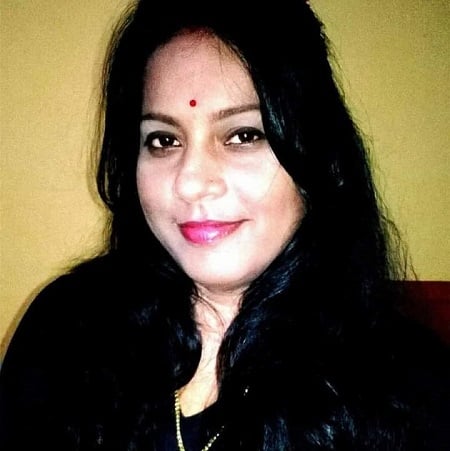
Chinmayee Barik, a modernist writer in Odia literature is a popular and household name in contemporary literary circle of Odisha. Quest for solitude, love, loneliness, and irony against the stereotyped life are among the favorite themes of this master weaver of philosophical narratives. She loves to break the monotony of life by penetrating its harsh reality. She believes that everyone is alone in this world and her words are the ways to distract her from this existing world, leading her to her own world of melancholy and to give time a magical aesthetic. Her writings betray a sense of pessimism with counter-aesthetics, and she steadfastly refuses to put on the garb of a preacher of goodness and absolute beauty. Her philosophical expressions carry a distinct sign of symbolic annotations to metaphysical contents of life.
She has been in the bestseller list for her three outstanding story collections "Chinikam" , "Signature" and "December". Chinmayee has received many prestigious awards and recognition like Events Best-Selling Author's Award, "Antarang 31", Story Mirror Saraswat Sanmam", "Sarjan Award by Biswabharati", "Srujan Yuva Puraskar", and " Chandrabhaga Sahitya Samman".
Her book 'Chinikam' has been regarded as the most selling book of the decade. With her huge fan base and universal acceptability, she has set a new trend in contemporary storytelling. By profession chinmayee is a popular teacher and currently teaches in a school named " Name and Fame Public School" at Panikoili, a small town in Odisha. She can be contacted at her Email id - chinmayeebarik2010@gmail.com

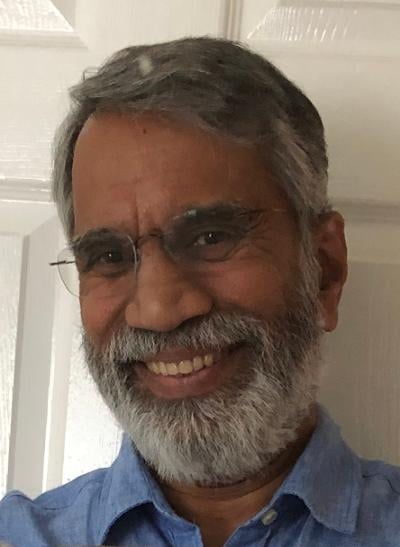

Dr. Ajaya Upadhyaya from Hertfordshire, England, is a Retired Consultant Psychiatrist from the British National Health Service and Honorary Senior Lecturer in University College, London.

Who knew that a day with such promise would end in near disaster? Ten of us from three families took a van to this gorgeous hill station. It was dusk by the time we reached the homestay where we had booked our accommodation. The mood was set by the setting sun as it quietly disappeared in the western horizon, accompanied by the melody of birds' chirping as they returned to their nests. After settling down in our rooms, I enquired from the proprietor of the homestay about the beauty spots we could visit. He suggested that the waterfall nearby was worth exploring, though we had to hazard a long and ardous hike to get there. But it was worth it. The scene with rolling greens and whispering trees was picturesque beyond measure. The sound of the waterfall reached us even before the falls came into view. We turned a corner and there it was, Nature's beauty and splendour in full flow. The water came down in two stages to form a pool at the bottom. The kids were so excited that they promptly jumped into the pool for a swim. Shrieking and frolicking, they extracted every ounce of fun while we elders looked on with indulgence.
As if mocking us, dark clouds hove into view and overshadowed the rolling greens. The rains came, first in droplets and then in a torrent. We tried to take shelter under the trees, but it did not prevent us from getting thoroughly drenched. Mothers hurried to gather their children who were more keen to dance in the rain! We herded them towards the van, only to be told that the heavy rain had brought down a huge tree and our van would not be able to reach us. The rest of the world seemed to have been cut off from us.
But there was a silver lining. One jeep had escaped being trapped behind the fallen tree and its driver agreed to rescue us. He had to make numerous trips to transport all of us back to the homestay. By that time the contents of the snack boxes we had carried with us had been consumed and digested. We were so famished that we pounced on whatever edibles the proprietor had to offer. The senior citizens in our group heaved a huge sigh of relief that the ordeal was over. Their sore joints had started complaining.
On our way back from the homestay the kids set off a loud roar. 'Once more!' They shouted in an encore.
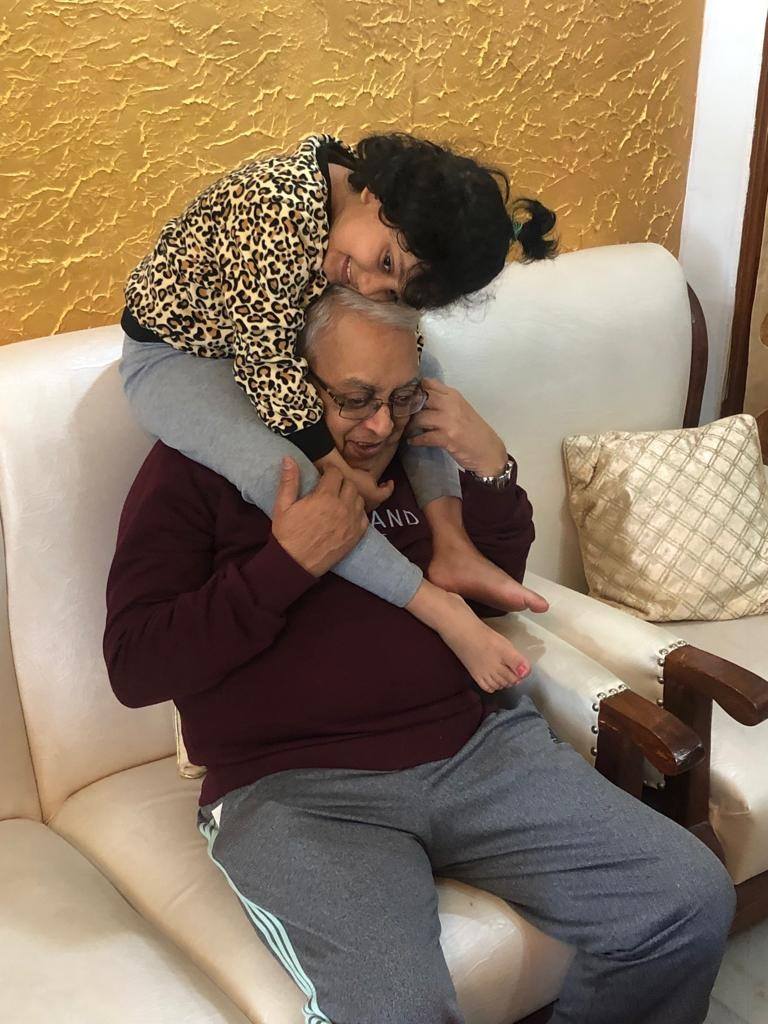
Ishwar Pati - After completing his M.A. in Economics from Ravenshaw College, Cuttack, standing First Class First with record marks, he moved into a career in the State Bank of India in 1971. For more than 37 years he served the Bank at various places, including at London, before retiring as Dy General Manager in 2008. Although his first story appeared in Imprint in 1976, his literary contribution has mainly been to newspapers like The Times of India, The Statesman and The New Indian Express as ‘middles’ since 2001. He says he gets a glow of satisfaction when his articles make the readers smile or move them to tears.
AN AMBIVALENT DO-GOODING
Satya Mohanty

The nameplate on the door read ‘Divya Swaminathan’. It rang a bell. The girl in my neighbourhood in Hyderabad had a name like this. Her father’s name was APBN Swaminathan. “She must be the same ‘Divya Swaminathan,” I thought. She was a couple of years older than my daughter and they hung around together. So did four other girls of similar ages. In fact, they grew up together. If this woman is the same girl, I knew her from her fifth or sixth year of age. All kids used to go to the swimming pool, including my daughters. Divya was an athletic swimmer who picked up swimming very quickly, and there was an athletic push to her skill. She swam as if she belonged there.
I was coming back to city after thirteen years from Delhi. Memories had dimmed, connection weakened and the ability to synthesize objective data became weaker still. One of the earliest things I did was to rush to the British Council library and renewed my cards. I headed to the fiction section then. To my left were a set of rooms. One of them read: ‘Divya Swaminathan’, Dy. Director. I wasn’t very sure whether this person was the same girl. I proceeded to the fiction rack, picked up a couple of books by Julian Barnes, a book of Harold Pinter, a volume of Seamus Heaney poetry, and I was heading back. I saw a woman wearing saree from a distance. Then she went into her room. By the time I reached the place, the same name board stared at time. On recollection, I thought there was some similarity in the frame. Tall and slender. But I hadn’t seen Divya as a saree clad woman, ever. I thought I would just check.
Maybe I could knock and get into the room. After all, I was armed with enough books to invent a question regarding the library. The director was a British woman, so going to an Indian staff would make sense.
I knocked, and heard, “Come in.”
I went in. Lo and behold, it was the same girl of my colony which I left thirteen years before. But there was no recognition in her eyes. “Are you Divya from Banjara Hills Officers’ colony?”
“Yes,” she replied. But there was no recognition yet. “I was in your colony. My daughter was your friend. Aparna, Sravanthi, Anjana and you were all together.” I said.Now her eyes lit up and face beamed.
“Yes, uncle. Sorry I couldn’t recognize you. It has been such a long time. You left for Delhi eons ago. We thought you wouldn’t return. How is Anjana?”
“She is in the US, doing her Masters in Law in Chicago Law School. But you guys should be in touch.”
“In a way, yes. But I thought she might have come back. Last she told me she would continue in Delhi.”
“That’s right. She will go back to the Supreme Court where she was practicing. We came back because this is home. Where are you staying?”
“After Papa passed away we continued on in the colony until my Mom retired. Now we are in an apartment in Banjara Hills.”
“I am so sorry about what happened to Swami. It was so premature and untimely. I sent a condolence message to your brother. Are you married?”
“Not yet. Would you care for coffee?”
“I won’t mind.” I had all the time in the world. There was no teaching engagement then. I was yet to get into the rhythm of writing, which was my mojo.
“Then let’s go to the cafeteria.” I hadn’t bargained for it. Having spent a life time in the Government, I thought coffee would be served in the room. But I had already taken the bite. It was impossible to back out now.
We went to the coffee house, took a table and I resumed the conversation. I enquired about her mother, brother and their welfare. But I came back to the question.
“Are you married now, or what is afoot?”It was an avuncular interest. Girls at that age were usually married. She must be 31, if I added two years to Anjana’s age.
“Uncle, after Papa passed away the question got placed on a back burner. Then I got the job. I got my freedom. For the first time I was leading a life with freedom.” The Coffee had come now.
“What do you mean, you had freedom for the first time?”
“You had a role in it.”There was sadness on her face. “You remember how you told my parents to be careful about my movement?”
In a flash it came back to me. It was an evening. The small knot of girls were moving together in the colony road in front. I was waiting for my driver to come to take me the airport. I think I was travelling to K.L, Malaysia. I could see a bunch of boys moving ahead and they took a fork. The girls took a turn to the right just after the boys. Out of curiosity, I came out and followed them. Lo and behold, Divya was talking to one of the boys and the boys were not from the colony. Other girls were a little away, maybe ten feet, but they were intrigued. I quietly came back and told Swaminathan to take care. It escaped my attention thereafter. I instructed my wife to tell my daughter to be careful. Then the car came and I left for the airport.
“Luck. It is all luck. Do you know I was shut up in the house for seven years? You left for Delhi after three years. I lost my freedom. I was only allowed to go to the college and come back. For seven years I didn’t meet anyone. I wasn’t allowed to go out, not allowed to move around the colony. I stopped talking to Anjana for the preceding three years.” Then she gave a smile. I thought it was a sad smile. Recognition of one’s small peeves and unintended consequence of the original action of mine.
“I am so sorry. I told Swaminathan to be careful. I didn’t know it would result in this.”
‘ I know you meant well. So did my parents. But the problem is when there is a challenge, you all felt it easier to shut us up, rather than counseling, empowering and guiding. I remained shut for seven years. By the time I was given some freedom, ten years of my life had gone by. After I got a job, I tasted freedom for the first time. I didn’t want to lose it. Someone else to lay down rights and wrongs, dos and don’ts, I did not want that. I didn’t want to marry in a hurry. Now with Papa gone, no one is there to steer it. Praveen is busy with his own life. He has been married for a couple of years. ”
“I am so sorry. I wanted to alert your parents. In the same colony, I witnessed another young girl being murdered by her unrequited lover from outside. My driver Afzal intervened, but it was too late. The worst was that the family decided to keep quiet so calumny wouldn’t hit the family. The girl wasn’t in the wrong at all. She was such an innocent kid.”
“I knew you could be having good reasons. But whatever is meted out to us wasn’t fair. Denial of life can’t be life. We will make mistakes. It’s the job of the elders to guide us. If training us in karate helps, we should be put to training. But that doesn’t happen. We are just shut out, because that is the easiest thing to do. Have your coffee, it will get cold.” By this time my head was working overtime, rolling what might have been and what had been. But I had lost my craving for coffee.
I took a couple of sips. I was disturbed that I was instrumental by creating such a mess.But my mind went back to my childhood. In a new location and in a new school, I was also ordered to stay at home. The problem arose because my father’s deputy’s son was my classmate. He didn’t like comparison and showed me a paper knife once. I overreacted and informed my father about the happenings in the school. My father instructed me to stay in the Bungalow as he was travelling often. He was smart enough not to broach it but it shamed his deputy and I lost the small joys of being a child for about three months. I was still selected for the scholarship exam depending on my earlier performance and it was good that we left the place after the exam.
Was my past playing a role? Was I being too risk-averse because I knew about the stabbing incident of Sastry’s daughter?
“Uncle, I have also heard about Soumya Sastry’s stabbing,although around that time we weren’t in the colony. But do we all deserve to sacrifice our freedom because one incident happened. You will not understand what being a recluse for ten years means? I lost my teens in guilt, discrimination and privation. But now it is in the past. But maybe it has changed me forever. I didn’t talk to Anjana for long. Then we made up.”
We had finished coffee then.
“Well, Divya. Aunty and I will visit your house. We haven’t met your mother for thirteen years.” We exchanged cards. I came out the library. During my walk to the car, I was wondering whether we ever did anything good to youngsters by imposing our worldview? Or we inflicted our weaknesses and limitations on the next generation without trying to figure out the problem this generation faced. The collateral damage of this or the unintended consequences could be unfathomable. I started walking toward the car instead of calling the driver on mobile.
“Sir, our car is there.” My driver had come from behind and stopped me as I passed the car in my absentminded thoughts.
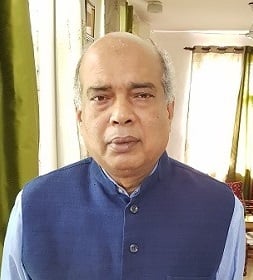
Dr. Satya Mohanty, a former officer of the Indian Administrative Service , was the Union Education Secretary as well as Secretary General of the National Human Rights Commission before superannuation. He has also held several senior positions in the Government of Andhra Pradesh, a state in the Indian Union. HE has authored a book of essay in Odia, The Mirror Does not Lie and a book of poems in English( Dancing on the Edge). He is a columnist writing regularly on economic and socio- political issues, Mohanty was an Edward S, Mason Fellow in Harvard University and a SPURS visiting scholar in Massachusetts Institute of Technology in Cambridge, USA. He has been an Adjunct Professor of Economics in two universities and is a leading public communicator. His second volume of poetry will come out soon, He lives in Delh
Grandpa read aloud the news item: ‘Police kill black bear…’ and proclaimed in his booming voice so that all of us paid attention - ‘360 degrees alert when you are on the road, avoid going alone on the trails, carry a bear spray and if you suddenly encounter a large bear, don’t let it startle you, don’t run. Make noise, clap your hands, speak in a gentle voice and slowly move away, remember to use the bear spray…’ Soon, he got back to his reading, sipping kettle-brewed chai* with oat cookies, while he was enjoying an archaic symphonic musical ‘Peter and the Wolf,’ composed by Sergei Prokofiev.
Mom was busy getting breakfast and chai ready. Dad was chopping some veggies and packing the lunch boxes. Working vigorously to complete her project, nine year old Ritu was giving the final touches on that Monday morning.
Ritu grew up in a home where sharing of responsibilities was encouraged and followed since her grandma’s time. Grandpa always did the shopping, helped with the laying of the table, hand-washed his own clothes, though the washing machine was around. And now, Dad lent a helping hand in the kitchen, pottered around, even though he could never keep pace with ever-speedy Mom. He was an ideal son, husband and a supportive parent to Ritu, encouraging her ever-changing interests. Mom was strict and rather firm with Ritu; she had her education from the nuns and believed that discipline was very important.
On hearing the compact and unobtrusive note of the bassoon, Ritu looked up. ‘How well the bassoon in the orchestra fits Grandpa - he has the voice of Peter’s grandpa!’ She said to herself.
Grandpa was a strange mixture of contrasts. Short and stocky, he had a deep baritone voice.
From humble beginnings, he had risen to the rank of a diplomat, his overseas postings had taught him to be a perfect gentleman in the elite society. However, he had retained his individuality and traditions at home, never compromising on the pujas* during festive occasions. He was a strict non-smoker and non-drinker. Cherubic grandmother was docile and affectionate, accommodating Grandpa’s requirements at all times. He was an ideal husband; his high-profile profession forced him to be out of the home at short notices. Dad was their only child, and he had genetically imbibed all their good values.
For a brief second, the music system got switched off when Mom was plugging in her device for charging. In seconds, it got restored and the rich music began once again. Ritu did not miss the flute (bird) and the oboe (duck) sounds of the orchestra.
Again, her glance went towards Grandpa. She recalled an incident that he had shared about Sir C.V. Raman. She had never asked, but wondered if Grandpa related a lot to the Nobel Prize winner since they originated from the same town. Akin to the Nobel laureate, Grandpa was a voracious listener of both Indian and Western classical music. All along, he had been an honorary member of several prestigious music clubs. While in service and after retirement, he was often invited to preside over the club’s activities.
Ritu remembered Grandpa’s exact words; she had listened to this story about Sir C.V. Raman several times in her younger days. “At the ceremony for the Nobel Prize award, Raman demonstrated his discovery using alcohol as the medium. In the evening when cocktail drinks were served during dinner, he politely rejected the offer and said- You have seen Raman Effect in alcohol; but please don’t try to see the effect on Raman.”
The clarinet was playing ‘staccato in a low register’ – the part which had the argument between the duck and a bird on whether a bird should swim or fly. Warned by Peter about the stealthy cat that had just approached them, the bird flew to the safety of a tree and the duck jumped into the middle of the pool. Grumpy Grandpa came out through the open gate, scolded Peter, took him home and locked the gate.
‘Thank God, my Grandpa is not a grumpy old man, even though his voice resembles Peter’s Grandpa’! Contrastingly, he’s the best raconteur, and has so many stories up his sleeves.’
Grandpa said something again, but Ritu was preoccupied in her own thoughts, even as her hands worked furiously. She recalled the tales from the ‘Man-Eaters of Kumaon’ that Grandpa had read aloud to her two years ago. She cringed in fear and had even screamed out when he narrated the story of the Champawat Tiger: the deadliest tiger that killed over four hundred humans, and how Jim Corbett, the Irish naturalist who lived in India had tracked and finally shot it.
Almost immediately, her thoughts raced to an anecdote about J.Krishnamurthi (JK), the world famous teacher. Once, JK stayed in a forest bungalow as he needed to recoup after some illness. Often, he went for walks in the dense jungles. A Malayali cook took care of him, and JK had a dictionary to communicate with him. One morning the cook warned JK about a tiger’s presence in the vicinity. Later that afternoon, while walking in the deep woods, JK realized the birds had suddenly become still, and there was some heaviness in the air. He kept quiet and stood his ground. After some time, the birds began to chirp again, and that was when he noticed some meandering movement in the bushes not too far from where he was.
‘Fear and Negativity are deadly enemies that cause animals to attack humans,’ were Grandpa’s teachings after narrating the story. He had advised Ritu not to throw stones at dogs or run when she saw one.
‘It looks fine!’ Ritu let out a contented smile and got up to pack her books and other stuff.
The percussion and the strings reached a crescendo when a group of hunters attempted to shoot the wolf: Peter shouted, “Birdie and I have already caught the wolf!”
Looking up from her study exactly at that moment, Ritu let out an earth-shattering scream – ‘There’s….. a bear ….behind the garden door!’
Startled, Mom dropped the hot cup of tea on her apron and on the floor. Grandpa hurriedly got up. Dad motioned to him to remain still. In a flash, he took his cell phone, and partially opened the glass door.
Before he could start filming, the bear jumped over the four-foot wooden fence and disappeared.
Dad, saved from a bear’s hug!
(*chai-tea. puja –prayer)
Photo Courtesy: N. Ravi
What is it that connects humans with each other, that has been connecting us since evolution first opened its eye? Love? Nah, it’s overrated. Responsibility? It eventually fades. A common purpose? Well, for a while maybe. But the answer according to me, is conversation. The most basic instinct of any human being is to express emotion. And what better way to do so than by using a few words?
It was a clear, humid night at Kuwait International Airport. The time was 3 am and the temperature touched a warm 30 degrees Celsius. Not that I could feel the heat, since I was sitting peacefully inside the airport, under the cool air conditioning. My mother and I had landed about an hour ago from Delhi and were waiting to board the next flight to Frankfurt, Germany, which was a couple of hours later. I had toured the entire floor, taken pictures of the airport, and dozed off for about 35 minutes after that. I even tried calling my relatives back in India. Although India was two and a half hours ahead of Kuwait, it was just entering the wee hours of the morning. So, my calls and messages were still unanswered. I literally had nothing left to do to pass the time.
As I was sitting idle, many thoughts floated into my head. I was going to Germany for my college. Even though I used to live there before when I was a child, certain fears gnawed at me. What if the Germany I remember and love, had completely changed? Will I ever fit in with the people there? How will I adjust to the new life there and at the same time manage my studies? All these thoughts crossed my anxious mind, but I had no answer.
After a few minutes, my mom woke up. We chatted for a while. The quiet airport was slowly starting to turn into one filled with hustle and bustle. Numerous announcements were being made, and another large group of passengers made their way into the waiting hall. A few appeared to be waiting for their connecting flights as well. One of them was a tall lady with raven hair and piercing grey eyes. She stopped to sit in a chair near us.
About fifteen minutes had passed, when she and I first made eye contact. She gave me a smile, and said, “Hello. Where are you travelling to?”
“Frankfurt, Germany.” I replied with a smile.
“Ahh, I see. First time to Germany?” She asked us.
“No, actually we used to live there before. But this time we are going there for my daughter’s education.” My mom explained.
“Oh great! Good luck to you.” She said to me. I thanked her.
“What about you? Where are you travelling to?” My mom asked her.
“Canada. Actually, I am a banker there. The bank had sent me on an assignment in Singapore for the last two weeks. Can’t wait to go back home!”
“Yes, home has a certain vibe no place can replace.” I remarked.
Just then, an elderly lady sitting close by interrupted us. She too looked Indian.
“Excuse me, did you say Canada?” She asked the lady.
“Yes, Canada’s my home.”
“Oh, that is very nice. My daughter too lives there. I am going to Toronto to visit her.” She replied in a strong south Indian accent.
“I hope you have a great time!” The Canadian lady told her.
The four of us talked for a while. We told each other about our families, exchanged our experiences from various travels, and laughed at each other’s jokes. We had quite some time for each of our connecting flights, so we were relaxed. Suddenly, a girl interrupted us.
“Excuse me, could you please tell me where is Gate 3E?” She asked us.
“It is right here, just a few gates away. We are in front of Gate 3A right now.” I explained.
“Oh, thank God. I thought I was on the wrong floor itself.” She let out a sigh of relief. From her looks, I guessed that she was Nepali. She was a short girl and appeared to be in her early 20s. She had one of those huge backpacks with her and her hair was tied in a messy bun. She started looking around for a seat. Since it was almost morning in the airport now, it had become quite crowded. The old lady removed her handbag from the seat next to her and offered the seat to the Nepali girl.
“Thank you!” She chirped. “Actually, this is the first time I am travelling anywhere on my own. It’s also the first time I’ve travelled out of Nepal! It has always been my dream to go on a solo trip. Dubai, here I come!”
“Wow, that sounds like a lot of fun! How has it been going so far?” I asked her.
“Well, I almost missed my flight from Kathmandu to Kuwait, so I don’t want to experience the same thing here. That is why I confirmed my gate number three hours prior to my connecting flight.” She laughed.
More conversation followed, snacks were exchanged, stories were shared and time flew by! I did not notice when two hours went by. It felt like only half an hour was gone. It was only when the announcement about our flight being ready for boarding blasted on the speakers that I had a chance to look at my watch. I and my mom bid goodbye to the three of them and headed for our gate.
“It was great talking to you both. Have a happy and safe journey!” They wished us.
“Lovely meeting you all too! Travel safe.” My mom replied.
We entered the flight and soon it was about to take off. As I was sitting on the window seat and watching the world below slowly disappear, consumed by the sun rays in their full glory at sunrise, a single thought popped into my head.
‘It is all going to be okay’.
The anxious thoughts that were attacking me earlier had gotten their answer. From up here, the world looked minuscule, almost like it never even existed. As if, all my life was merely spent intangibly inside my head. Looking at the mighty sun and the humongous clouds, all the worries of my life appeared to be the size of a single sand grain.
Human beings are built in such a way that they mold themselves into adjusting to whichever situation they are put in. And if nothing works, we always have our ability to converse. Take the conversation we had with the three women for instance. Each of us at a different age, from a different background and with a different goal. But all it took to overcome the distance between us was the fundamental instinct of us humans- expressing emotions. One of us was filled with the eagerness to explore the world, another with the excitement of meeting a family member after so long, and another with the yearning of returning home and relaxing. And there I was, with the nervousness to start a new life. Such varied feelings, yet one common escape- conversations.
The conversation I had that day consisted of no extraordinary topics, but it ended up becoming one of the most enlightening ones for me. I discovered something that day- since time immemorial and for centuries to come, we humans will stay connected no matter what.
This belief of mine became stronger when I suddenly realized another funny thing on the flight. We all had spent hours chit-chatting like old friends, without even feeling the need to know each other’s names.

Archee Biswal is from Bhubaneswar, Odisha. She is currently pursuing MA in Analytical and Applied Economics at Utkal University. Her dream was to be a writer ever since she was 9 years old. Her poems and short stories have been published in various magazines such as Chandamama and Kloud 9. She likes dancing, painting, and playing instruments such as the keyboard and guitar. She speaks 6 languages including German and Spanish, which she learnt while staying in Germany. Her favourite wish is to travel all over the world and collect new experiences.

This was the end.
All the realms were in turmoil.
One moment all was grey, the next red.
The Valkyrie’s piercing cry signalled the commencement of the nightmare. The battle had begun.
Almost everyone had picked a side and gone to play their part in the vicious battle. Some fought, others healed, yet others were assigned to bury or burn the dead.
Those who were left behind were staring up at the sky, holding their breaths, waiting.
The sky was tearing itself apart. The wind carried bloodcurdling cries of the dying. The thunderous screech of the dragons threatened the very existence of men. The glass barrier separating our mortal existence from that of the Gods was breaking. And through the cracks, tear drops were falling on to the dry, arid earth.
The Earth. The house of the prey.
The prey was tiny. Tinier than one could imagine. Eyes sparkling like stars, it was reckless and playful, ignorant of what lay ahead of it. Smiling like sunshine, it was pure innocence.
The predator had been lurking in the shadows. Its chameleon-like hide making it possible to camouflage its monstrous colours behind shades of trust and responsibility. Its bloodthirsty nature unbeknownst to the world, it revelled in its own power.
Evil.
The predator has been looking for its prey for quite some time now. Or so it seemed. One can never really know with beasts such as this. The true motive, if there even was one will remain forever a mystery. Unexplained, inexplicable.
The predator had already set its eyes on its prey. Its plan was in motion. First, building a trust that cannot be broken easily, It would pretend to be a caregiver. This could take a while. And It was always in a hurry, always impulsive. For why else would It deviate from its normal choice of prey and go for something so tiny? It simply had to satiate Its hunger. It could not wait. It must feed.
He must feed.
He would eventually find The Prey behind the stairs. He would take her small hand and her smiling face and lead her upstairs to the wonder room. A promise to show her wonderful things, a promise to surprise her. A promise he would keep.
The wonder room. A room full of worlds and stories and magic. Magic, her childlike wonder would later discover. Magic, that could help her escape. Magic, that would save her. Magic, that would make her. But not today.
Today, as fate would have it, she would follow him. She would listen to his words. She would obey him.
He would lay her down on to the cold hard marble floor, ready to devour her. He would look straight into her eyes as he would tell her that this is what grownups do. He would whisper all the things he was going to do and she would listen.
Black, red and white.
That’s all she saw.
Black, red and white.
She’ll always remember.
His pungent breath on her neck, she can’t forget.
Black and red, the colour of his eyes. Black and red, the colour of his hair. Black and red, the colour of his skin. Black and red, the colour of evil.
White, the colour of the floor. White, the colour of the walls. White the colour of peace. White, the colour of helplessness.
Black, red and white.
She can never forget.
Dirty, guilty. That’s how she would feel.
The whitewashed walls of the wonder room, would stare in horror at the scene that unfolded in front of them. Never before would they feel their own helplessness, own limb-lessness. Unable to do anything, they would weep, silently lamenting.
The battles above would stop. Through the cracks in the glass, everyone would see. The Gods, the angels and their soldiers will stand in deafening silence, bearing witness to an unspeakable crime. Their holy war, already lost.
The winds would stop moaning, the waves would stop crashing, the birds would stop singing, and the whole world would come to a standstill. The teardrops would turn into thunderstorms, causing havoc all around.
The earth will crack itself open and hot magma would swallow everything, ever.
The blue earth, now red.
The helplessness of the natural world in fighting against crimes of a human nature, would never before feel so crippling.
The prey would go down the stairs all alone. The hunt complete. The predator, now satisfied, would go down the rabbit hole it crawled up from.
The prey too young for the words to describe what had happened would stay quiet for as long as she could, eventually forgetting all about it.
Her eyes wouldn’t twinkle as much and her smile would slowly fade away. Her grace would be all but gone.
She would wake up in the night screaming, wetting herself, terrified of the terrible monsters out there. She would lash out at everyone, rebelling against every single person. Soon, she would learn to withdraw herself from the world. Soon, she would stop empathising. Soon, she would forget herself.
One day, a certain smell, a certain flash of colours would take her back to those days. And as everything would come back to her she would drown in self-pity, loathing herself for all that she has become. Her guilt, her sorrow, strong enough to kill her.
Her pain would make her angry. She would feel like a victim, used and abused. Her rage, turning her black.
She would burn. But she won’t give up.
Out of the hole, out of a burning pyre, she would rise. A black musketeer.
She’s a warrior.
No longer the prey, she would be graced with scars, flaws and courage. She will learn to avenge herself, she would learn to forgive but most important of all she would learn what it is to be kind. To be loved. To be happy.
She would no longer be a victim but a glimmer of hope for all those who are broken and the righteous fire for all those who have sinned.
And the world will stare in awe at the woman she would become.
But for now, ensconced in her cocoon, she must wait and transform.
For now, she must heal.
For now, she must prepare herself for a lifetime of ordeals.
For now, we must wait.
Because for now, the wars won’t stop.
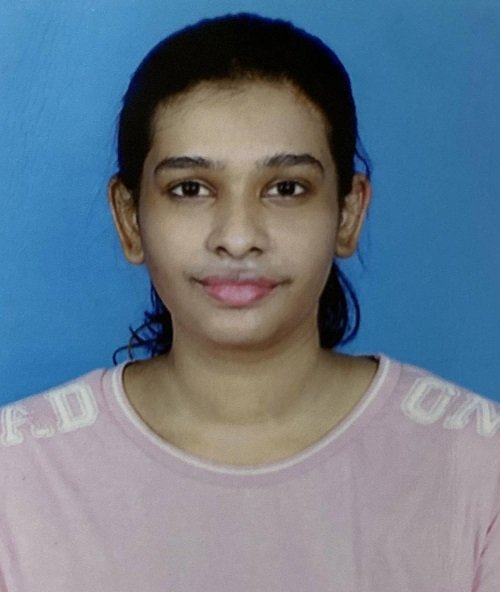
Punyasweta Mohanty is a 1st year student of MA Psychology at Utkal University. Apart from seriously pursuing her studies to build a career as a child psychologist, she is passionate about literature. Her forte is creative writing. Her articles have been published in online magazines ‘Hashtag Kalakar’ and ‘Utkalayana’. She will welcome feedback on her present article at punyasweta@gmail.com.

They woke up .
They hugged each other as was their wont from childhood. In the womb it was said that the doctors had found them in a hugging position. Now too they were together. They felt as light as the air. As if they had thrown away their baggages. They had no more worries. Their minds waere blank. They were only curious about the moment. Nothing was tangible about them. They had changed. As they looked at each other, they felt more grace had come to their faces.
Though they had freedom to move they felt as if they were stranded in a strange place. People were standing around with sad looks on their faces. Holding hands they moved together, fearing they would lose each other. They went towards the men standing and looking at something. Yes, it was their bodies, their earthly raiments they had to leave behind in their next lap of journey. The two bodies were ground and pasted on the tar road beyond recognition.
A scene flickered through their minds. They saw a lorry coming towards them as they reached the bend of the road, on their bike . The heavy bag they carried slid to oneside and they were thrown off balance and the huge wheels rode over them and sped away without stopping. But they had woken up together. They found a winged stranger, who looked out of this world, tugging at them, to go with him.
It did not bother them. But something else diverted their attention and prompted them to linger there. It was their bodies. They hovered around the body totally ignoring Hermes, who had come there to waft them to the netherworld. They wanted to know what would happen to their bodies.
By then a crowd had gathered and the police took charge and were busy. An ambulance too arrived.
The agonized look on the faces of the men made them also unhappy. Nothing remained of their bodies, only the limbs and the flesh, pasted to the ground. The tanker wheels had played their role well.
As they watched, their bodies were almost scooped up from the road and loaded on to the stretcher and placed inside the ambulance. Alarmed they entered the ambulance. They didn't want to discard their bodies. They wanted to re-enter at least in one, but they found only a mass of flesh and blood. Panic made them cling on to each other as the ambulance sped.
They could see Hermes in rage, flying behind the ambulance. They had given him the slip. They wondered why Hermes was trying to herd them away. They jolted out of their reverie when the ambulance screeched to a stop. A small crowd was waiting for them. The bodies were handed over to the hospital authorities.
They saw a small group huddled together. They advanced towards them. Everyone in the group almost wailed aloud when the bodies were taken out. They recognized their mother and father, and on the ground hugging her child sat Rinu, tears streaming down her cheeks . Yes, that was Tony's wife. He had married early as he had fallen in love with the starry eyed Rinu. They had met at the Engineering college as freshers. It was love at first sight. While his twin Ronni remained a bachelor. Tony rushed forward to gather her up and console her. But his twin held on to him. Not only that he found he could not even touch her. And what really made him feel strange and worried was she had not seen them. They were standing so close to her. He had never seen her sit like this before on the ground almost distraught. As if the whole world had collapsed around her. He looked around, her mother had not arrived. She, being an only child, had no one to cling on or console her; the little one sitting on her lap was wiping the uncontrolled flow of tears. She was sitting like a bereaved wife who had lost count of everything. What is happening? Am I not near her ? Isn't my brother near me?Then why is she behaving as if she had not seen us.
Ayan got up from his mother' s lap, and ran towards his grandpa, who hugged him and gave him his toy he had given his grandpa for safe keeping. Their mother was clinging to their father. They looked ravaged. The overwhelming grief had shattered them. The mother leaned on to their father as she sobbed. They stretched their hands to console them but they couldn't touch their parents. They felt helpless.
He moved towards Ayan who was concentrating on the toy his grandpa had returned to him. He stretched his hand to pull Ayan towards him and hug him and chase away the puzzled look that had settled on his child-face. But his hand passed through the air. Raju grimaced, something which they could not decipher had occurred to them. It slowly dawned on them that they had been removed from the world of humans. They were only spirits.
Suddenly Hermes pounced upon them and gathered them in his arms as they were as light as ether. He realised that they would give him the slip if he allowed them any more freedom. So hugging the souls of the two young men, he flew towards Hades, where Charon the ferrier was awaiting them impatiently.

(Prof. Latha Prem Sakhya, a poet, painter and a retired Professor of English, has published three books of poetry. MEMORY RAIN (2008), NATURE AT MY DOOR STEP (2011) - an experimental blend, of poems, reflections and paintings ,VERNAL STROKE (2015 ) a collection of all her poems. Her poems were published in journals like IJPCL, Quest, and in e magazines like Indian Rumination, Spark, Muse India, Enchanting Verses international, Spill words etc. She has been anthologized in Roots and Wings (2011), Ripples of Peace ( 2018), Complexion Based Discrimination ( 2018), Tranquil Muse (2018) and The Current (2019). She is member of various poetic groups like Poetry Chain, India poetry Circle and Aksharasthree - The Literary woman, World Peace and Harmony)

The traffic signal at the Spencer junction turned green and the vehicles had already revved up their engines as if in a formula one race. Those that stepped on the accelerator immediately and those that shifted their gears slowly, all would soon aggregate in front of the next red signal which was just around the corner. The little boy standing on the pavement was amused watching these vehicles rush out just like opening of the tap water, just to be collected again as though in a bucket at the next traffic signal around the corner.
It was a hot sultry day and not many people were seen outside. The only few who seemed strong enough to bear the incinerating heat of the noon sun were a few Hawkers who were eagerly waiting for the red signal to open its eye once again. They were waiting to do some trade inside a minute with the next set of commuters who came in.
On the right side of the four lane road was a huge new hoarding announcing the performance of Yan the pianist in three venues across the city. It had the mesmerizing picture of Yan, the new sensation in music, who was touring the city for a few days. On the other side of the road obstructing the vision of an entry from a side road was a small flex banner which proclaimed about a traffic rule awareness week.
The orange signal lit up and hawkers took up their merchandise and got ready to step onto the roads. The small boy standing on the pavement too was ready. In a second the red signal came on and the vehicles come to a halt though a car and a bike just passed through without heeding the order to stop. “There will always be a small trickle even if the tap is closed”, the boy said to himself bemused after studying the traffic habits for long.
The merchandise time which was less than a minute started now. The hawkers who were four in number, spread out like ants in between the cars, knocking at each glass pane with pleading eyes and expectation of a sale. They would stick the sun shield which was their item of sale onto the raised window glass of the air conditioned cars to make the passengers understand the comfort of having a sun shield in these sunny days. A few bought from them because of its usefulness, some out of concern for the poor while a huge set of travellers just ignored them.
“Kochu!” the female hawker in the group called out to her son, or rather it was an affectionate scolding to make him aware of giving attention to the signal time.
Kochu, seven years of age, jumped onto the zebra crossing as though he had a ground in front of him. It was his play time albeit for a minute perhaps. He was going to skip across the lines using only his right leg while the other he would keep it folded with help of one of his arm. This time he chose the black lines to step on and would skip over the white lines. His aim was to skip over the alternate white lines and reach the other side of the road without stepping on the white lines or without bringing down his other leg onto the ground.
He had never achieved his goal till now, yet he persisted. Every time he attempted it, either his enthusiastic initial leaps or his later weary ones would make him land on the opposite colour, a bit short of the preferred colour. He had improvised much on the thrust he should give on his right leg, just to take him safely to the centre or at least to the edge of the preferred line. At other times even when his jumps were correct, then it would be his landing which would throw him off his balance, like what happens to a gymnast, forcing his other leg to come down and touch the road. Once when everything seemed to go perfectly and his goal looked quite near, he ran short of time as the signal became green. He had to fly out of the road with the help of both his legs. At these instances when he stepped on the disqualifying rules set by him, he would consider himself defeated. He was never dejected about his failures - rather it kept him interested and busy. He had a goal to achieve while his parents were trying to make some business on the road. He would restart his ambitious game again at the next opportunity of the red signal. All day he waited for the intermediate pause of the traffic to play his kind of game which he alone understood.
Shekar, a musician of a small upcoming music band, was sitting in his car, enjoying a piano concert which was played from his car's music system. His car had come to a halt at the traffic signal and he took it as an opportunity to rest his tired legs and stretch his body. He looked with admiration at the poster of Yan the pianist, an elegant man in a white suit sporting an anchor beard and a thin moustache, positioned beside a piano. Shekar was listening to the same person on the hoarding who had composed the symphony he was hearing. Shekar was longing to hear Yan at the concert which was going to happen in a few days. Even as he was listening to the music, he was also watching a boy playing a skipping game in front of his car along the zebra line. Shekar found a rhythm in the boy’s steps and he got interested. He wanted to try something innovative and make things lively. He quickly brought down the window glass of his car and rose up the volume of his stereo. The music flowed onto the road. Magically, as was his desired expectation, the boy’s skipping steps were now moving in harmony with the music. The boy was now more merrily skipping over the white and bouncing or pausing on the black lines before the next leap in accordance to the chords of the piano.
A limousine car came up almost squashing into the space between the car of Shekar and the adjacent one. The big car went a neck further ahead than the other awaiting cars and halted over the zebra line. It then revved its engine as though sounding it is a VIP car and needs to stand and go first.
Inside the car, the great pianist Yan was sitting relaxed in the back seat, seeing the town of Trivandrum for the first time. His ears slowly caught the faint notes of his own composition. Yan asked his driver to lower the door glass to make sure if what he heard was his own. He could now hear the music which was on the road more loudly and he enjoyed it listening to it from a different environment other than from the sophisticated music studios and concert halls.
His attention also turned towards a small boy who was skipping along the black lines. Yan tapped his palm on his lap and followed the rhythm of the child’s steps to his keys. From Yan’s side window he could see the boy hopping towards him. Just as he thought everything was going in tune with his music, he suddenly heard a flat key being repeated and pressed for too long spoiling the entire symphony.
Shekar, from whose car the music was aired, too was bewildered as to what had happened with the music system. Shekar in frenzy tried to adjust some controls but that particular semitone went on repeating itself. The child was now repeatedly hopping on the black line beside Yan’s car. Yan could see the child almost next to his window.
Yan had an intuitive feeling. He realised that something was hindering the flow of an objective and hence the frustrating repetition. Being a creative mind, he had encountered this insane moment many times. It was either a physical or mental block that came up in his way, retarding his flow of creation. It was only self realisation of what one was in that could set the flow straight again. Yan looked around and assessed the situation. He once again checked on the boy who was still hopping on the black line itself, asking a way for his progress. Yan recognised that his car was parked on the zebra line. He tapped at the driver’s seat and an instruction was issued. The car immediately reversed.
Kochu now had his rightful way in front of him and he continued to skip over the alternate lines. He did it untiringly and without a fault as the symphony too played along after an interruption. He reached the other end successfully for the first time and just in time as the traffic light immediately turned green. The flow of the vehicles started again and there was a decrescendo of the music as the cars sped away only to be placed near to each other at the next red signal.
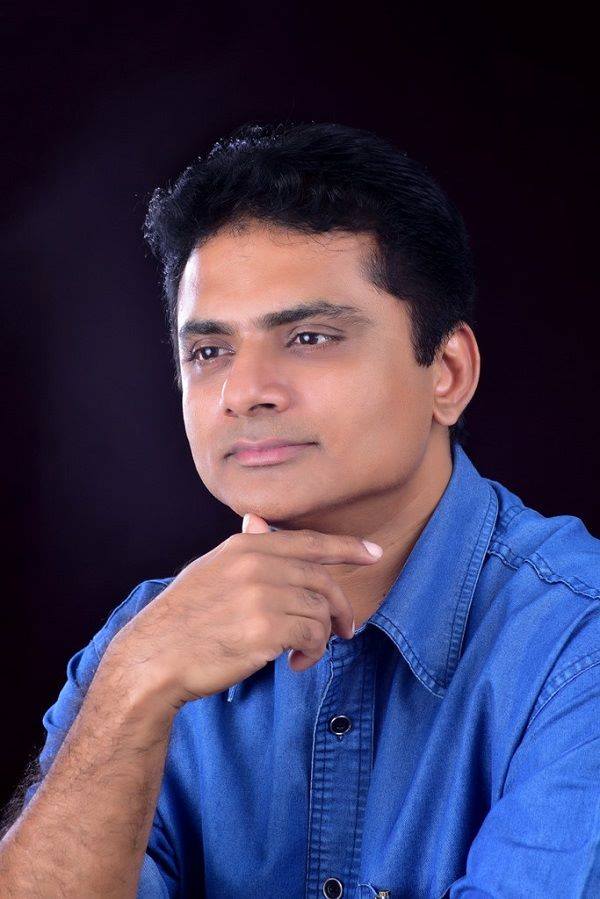
Dr. Nikhil M Kurien is a professor in maxillofacial surgery working in a reputed dental college in Trivandrum. He has published 2 books. A novel , "the scarecrow" in 2002 and "miracle mix - a repository of poems" in 2016 under the pen name of nmk

The story can be safely told now. Or, so I believe! So many years have gone by, and life has changed so much! There is little chance of these revelations causing any discomfiture to the parties concerned.
It was a normal day in the office, but certainly much more hectic due to the approaching end of the financial year. I was working in the Commercial Tax organization of the state, housed in a majestic building at Cuttack. It went by the name of ‘Banijya Kar Bhavan’. Some friends may hold a different perception about the life the tax officials lead and the power they exercise, but in reality, life could indeed get hypertensive and plain hell, particularly at the year end when deadlines to meet the annual targets for collection of taxes hung like the proverbial Sword of Damocles on the heads of tax officials. In those days our office hummed like a beehive in full throttle. The stress of work, the deadlines fixed for tax collections, percolated down to be the bottom. Everyone was affected, even the bees without wings at the lowest level; i.e. those that were not directly involved. It could be through a phenomenon called Electrostatic Induction of current.
Well, I was one such, in charge of the administration section of the department. It caught me, therefore, by surprise when Mohaptra Sir- the head of the Law Section- barged into my office cabin early in the day and promptly sat down opposite to me. He was flushed.
Let me clarify here that Mohapatra sir was not only senior to me by a few years in age but also by at least one rank in service. As law officer of the department he looked after legal matters like filing of court affidavits, fighting tax cases before High Court and Supreme Court- all those being esoteric matters to humbler folks like me. The Commissioner trusted him and gave him a lot of leeway in how he conducted his job. Juniors like me looked at him in awe and dreaded the prospect of having to fill up his shoes someday in future in case- just in case, the govt decided to upgrade my neophyte status. In contrast to the Law Section the administrative unit was responsible for mundane matters, like drawal of personal claims like salary, preparation of budget, purchase of items like broom sticks, glass tumblers, office towels etc. To put it in perspective Mohapatra sir was like the senior commander in the army, while the administrative unit was like the kitchen providing food to the battlefront. We were needed when something needed to be procured, or when something went wrong. I belonged to the hoi-polloi. His visit, therefore, had caught me by surprise.
We used to meet often enough in office corridors and meetings; but this was a rare occasion he had come to my room. He was not known to waste time in idle gossip of any kind. With thick glasses peering from behind stack of files on his big table, giving dictations to stenographers, he was often curt in his talks. Even offer of coffee, to which he was quite partial, failed to tempt him to go astray from his lofty heights. As was my practice I used to normally address him as Sir, but, sometimes depending on the mood we were in, which was rare indeed, endearingly called him simply as Badabhai(elder brother). Not that he cared to notice the difference, being nonchalant towards such matters of courtesy, or niceties of protocol.
Another reason as being pertinent to the easy camaraderie between us can here be added. The fact is our families had also become quite close on account of our official quarters in the Tax Colony being adjacent. Mohapatra sir was eligible for a bigger quarter but he preferred to stay put in the small quarter allotted to him years back. The women of the colony comprising housewives had a field day to discuss about their husbands and children and take over the jobs of news channels. Totally free, of course! It didn’t take long for me realise that my wife had adopted Mrs. Mohapatra as her close friend, calling her ‘nani’(elder sister), and visiting their house quite often. Visits were mutual. In course of time both the Mesdames had, predictably, progressed to the extent of sharing secrets and titbits about our respective families. That obviously included discussions about failings and shortcomings of their respective husbands. Before long, I knew everything there was to know about his family members comprising his wife and two beautiful daughters, and sundry other matters like the vegetables they liked, the academic courses his daughters pursued in colleges, or the particular saree shop in Cuttack offering best off season discount in latest clearance sales.
I knew that his daughters studied well and roamed around in a scooter. They seemed bright enough to pursue their own goals and ensure a bright future. Yet, the family, particularly Mrs. Mohapatra, worried a lot on their marriage prospects. She also used to blame her husband for not having a plot at either Cuttack or Bhubaneswar, for not even planning to have a house in the immediate future. He didn’t have adequate savings for the marriages of their grown up daughters, too, as it seemed. It transpired that Mohaptra sir had been beset with the burden two unmarried sisters from quite an early age, from the time he was serving as a teacher in a college after finishing college. He had a big chunk of family burden from an early part of his life, from days he had not even married. He had to support his widowed mother and unmarried sisters all along. His responsibilities were not yet over. Still, one more sister remained to be married off. She was already 28, but fortunately, this one had recently started working as a teacher in a govt school. Following her employment in a stable job, proposals for matrimonial alliances from good families had started pouring in. So, his woes, or responsibilities in the matter seemed to be nearing an end. This much authentic information I had been supplied with.
Mohapatra Sir revealed his intention. He wanted to make a part-final withdrawal from GPF on account of sister’s marriage that was to be held in a few days. He told me how the alliance was finalised the very previous day. The groom was a brilliant boy from a very good family. But due to certain constraints the groom’s family wanted to solemnize the marriage very quick and Mohapatra sir had acquiesced to the suggestion or demand. This necessitated a lot of preparations on a war footing. Everything had come as a deluge to the middle class family, and consequently he needed cash, pretty fast to meet the expenses. To make necessary purchases of bridal clothes etc. The amount of withdrawal sought was for Rs.4 lakhs. He sought my help in the matter and demanded to know the shortest possible time in which his application could be processed and the money could be drawn and disbursed. He was apprehensive since it was the month of March, and he knew that in the backdrop of the approaching yearend such matters were usually relegated to the bottom, given lowest priorities.
I congratulated him and gave a solemn promise to process his application for GPF withdrawal at the earliest and let him know. Next, he also wanted leave and submitted an application. Both the applications were processed at breakneck speed. The Commissioner was initially reluctant to grant him leave in the last fortnight of March, but he was a kind hearted soul, particularly well disposed towards Mohapatra sir on account of his prevailing image of a dutiful employee, devoted to work. Therefore, once apprised of the situation he condescended to all his prayers. Everyone in the office liked him and no stone remained unturned in our hands to help him in getting the money and the leave at superfast speed.
The GPF withdrawal was facilitated the very next day, but owing to Mohapatra sir’s absence from office on some errand could not be disbursed the day it was drawn. I remember being late in leaving the office. It was almost 8 pm when I reached the colony. I felt an uncontrolled urge for dropping in at his quarter- which was in fact quite adjacent to mine- and passing on the news in person which I believed would come as a huge relief to the family. In those times there was no mobile telephony service, and so I had not been able to communicate these things earlier. But I learnt that Mohapatra sir was yet to return from his visit to state secretariat at Bhubaneswar.
In his absence I took the opportunity in congratulating madam for the imminent marriage in the family. She appeared to be happy. Then I passed on the news in great detail, as to how his leave application has been processed, how the money has been drawn from the GPF account, and how the amount of Rs.4 lakhs was waiting to be disbursed the very next day. I requested her to communicate everything to her husband when he returned. My words must have involved some bragging about my role, and, may be, I expected some appreciation for the work in such an important assignment, for which I had deigned to visit their house in late evening to personally convey the news. Or, so it appeared to my simple mind.
But nothing of the kind really happened. She queried a lot and after getting confirmed about the exact amount of withdrawal appeared crestfallen. I could gather that Mohapatra Sir had told her about drawing only half of the amount, i.e. Rs.2 lakhs. He had obviously lied. She lost her temper and used some harsh words without realising my presence- an outsider. She alluded to the spendthrift ways of her wayward husband who never cares for his family, who forgets that he has two daughters of his own who were fast approaching marriageable age, who were without the promise of a secure roof over their head once he superannuates in a few years etc. She controlled her outburst in a short while and asked me to forget the words expressed in unguarded moments. She did not forget to add before my departure from her house as to how her husband had sacrificed much of his own comforts for the entire family and how such large hearted persons are rare those days! She did not mention they could be perfect nuisances as husbands.
With a heavy heart I came back without waiting for the cup of the tea which was on its way. It stunned me to learn that Mohapatra sir could hide something like this, that too from his wife. It puzzled me. With the absolute certainty that the detailed report would reach me in due course through the usual communication channels, I remained silent at home, without disclosing anything about my unfortunate experiences that evening. Reporting about this episode, I was sure enough to realise, would have opened up a flood gate of accusations against me. My own record in similar matters was not all that good. So, I preferred to remain silent.
The next day dawned as usual, and it was office time. In an hour I went to Mahapatra sir, and ensured that the cash of Rs.4 lakhs was duly handed over to him in my presence. He thanked me a lot for everything and ordered coffee for both. After a brief silence I expressed my regret for having visited his residence the previous evening and quite unnecessarily having blurted out irrelevant facts regarding his withdrawal from GPF. It was none of my business. Mohapatra sir appeared ill at ease at having been caught off guard before a junior but regained his composure quickly enough. We turned our discussions to family matters in general and the roles of wives in particular in maintaining peace at the domestic front, and how it was essential to carefully maintain trust whatever be the cost. Discussions were academic bordering on the philosophic.
I took the opportunity of congratulating Mohapatra sir- this time addressing him, quite confidently, and without any hesitation- as Badabhai. I expressed my appreciation- quite genuine, of course- as to how he had been fortunate in getting a gem of a wife who had stood by him in thick and thin, and how her sole concern was to ensure future happiness of his family. I didn’t forget to mention what I had picked up from her verbal outburst the previous evening: that madam was not at all against the benevolent actions of a dutiful son of the family. She only minded the little bit of falsehood that had had crept into his actions. That he was not transparent hurt her most.
Mohapatra sir looked at me and said, “ Yes, maybe! She may be justified in getting peeved in such a matter like this. May be I am to blame! But then, if she was benevolent like this, as you say good wives generally are, why did I have to lie to her, and feed her with half-truths in the manner I did ?”
I had no answer to that. My earlier notions regarding lying husbands changed from that date onwards. I felt like exclaiming, “ You too, Badabhai?”
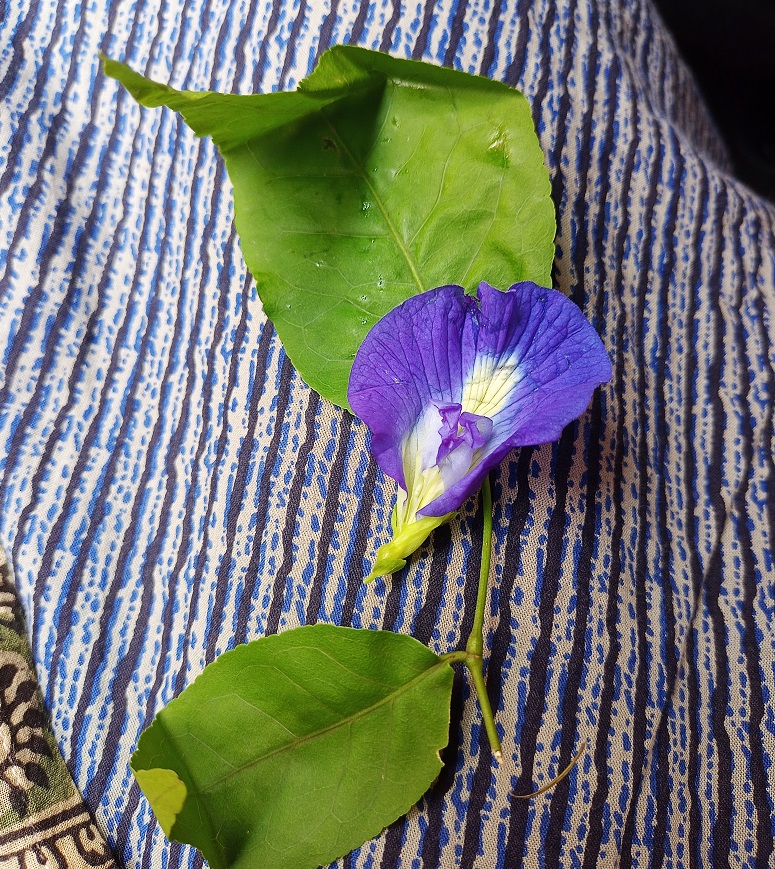
Blue has been a colour very close to my heart, from the time I started working with children with special needs, in particular with "Autism ", and as I embarked on this journey, with time I learnt that blue is the colour for autism as it is more common in boys than girls.
The colour blue represents both the sky and the sea.You will find different hues of blue in the oceans, in the sky and in every corner of nature.
It is associated with open spaces, freedom, intuition, inspiration and sensitivity.
After having spent almost twenty three years in this field, today blue is my style statement, love to always adorn a tinge of blue in the form of accessories, clothes, bindi to the extent...I have blue crokery, blue table cloth, blue lights, In fact Rahul's (my son) room too is blue, such is my support for special needs children and their families, especially my son. My service to them is like a daily prayer. I nurse my son and always say to myself..."It's meant to be this way, so march on, be like Florence Nightingale and continue your services, it's God's will, I'm just a medium."
Recently I just gave it a thought, am I overdoing the blue part, maybe I should slow down now, and the thoughts keep recurring in my mind.
Last week my sister and brother in law were here for a two days vacation, and were planning to travel to Goa too. But as my sister entered the main door she complained that she was not feeling too well and within a few minutes started running high fever, home testing was done, results - covid positive inspite of booster dose taken, and after two days my brother in law too started running high fever. Since both of them are doctors we were not worried at all, but the incessant rains continued lashing on the glass windows, dampening our spirits, Goa trip finally got cancelled as they needed enough rest. But all said and done, we had a wonderful family time together after a long long gap.
I couldn't take my sister anywhere on the roads, but my desire was to visit the nearby Kali Bari Temple along with her, the architecture and stone carvings of this temple resemble the one in Puri, Odisha .
Finally the day came for them to leave for the airport. On asking my sister if we could sneak out a bit for a couple of minutes to the temple, she looked exhausted. I knew she was keen but could not make up her mind.
At last both of us dressed up and got into the car. As we stepped out, in front of us we saw this beautiful Kali Maa statue dressed up in a red saree. I was extremely happy that we could make it to the temple at least and seek her Blessings. I rang the temple bell three times and bowed down almost a little tearful. My sister was very keen to request the pandit to give her a flower and Tulsi leaves, he placed in her palm a cream hibiscus with red centre. I did not have anything on my mind, I was in a state of bliss. The pandit turned to me and said...."don't you want any"?I said "yes!!" I too wanted one. The temple was full of colourful flowers offered by devotees that morning......marigold, hibiscus, passion flower, roses etc etc. I didn't notice which flower he was picking up, I just opened my palms to receive the holy water and after that he placed two Bel leaves and a Blue Aparajita flower which is known to be Durga Maa's favourite. I was stunned for a minute, he picked up blue amongst so many other big flowers (I'm strong devotee of Ma Durga). I felt as though she was giving me her Blessings through this blue flower and telling me to continue with my services.
Miracles happen everyday, but you must have the eyes to see and an aching heart to feel it. I held the flower tightly in my palm, closed my eyes for a second, bowed down, my eyes moist. I can't explain my feelings, it was a spiritual connection.
Seeking her blessings always. (It's the same flower in the pic)
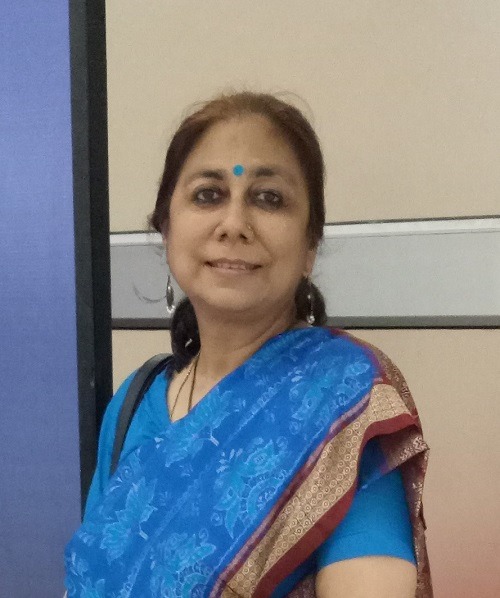
Sheena Rath is a post graduate in Spanish Language from Jawaharlal Nehru University Delhi, later on a Scholarship went for higher studies to the University of Valladolid Spain. A mother of an Autistic boy, ran a Special School by the name La Casa for 11 years for Autistic and underprivileged children. La Casa now is an outreach centre for social causes(special children, underprivileged children and families, women's health and hygiene, cancer patients, save environment) and charity work.
Sheena has received 2 Awards for her work with Autistic children on Teachers Day. An Artist, a writer, a social worker, a linguist and a singer (not by profession)
QUESTION PAPER
Dr. Radharani Nanda

Aparna's eyes were welling up.Today Piyus is flying to America.She will bid goodbye to her dearest son this evening as she bade farewell to her husband Ramesh thirty years back on such a sombre evening. The wistful remembrance of that day of Ramesh's departure was leaving her mind tattered. Before she could feel the nostalgia of the fragrant spring in her life all her thrill and dream were blown away by the gale of wind. The unending journey of life was hovered by absolute darkness and to find a way out was a remote possibility.
It was an arranged marriage. Aparna was a sixth year student in University in Economics. Aparna's father Somnath Mohapatra was a lecturer in Stewart College, Cuttack and mother Prava Devi a housewife. She was the only daughter of her parents. They had their own house at cuttack and Aparna was going up and down to Utkal university by public transport everyday.
Ramesh's father Birendra Acharya was a retired professor in Mathematics and staying at Bhubaneswar. He had quite a good amount of parental property at his village in Baripada district. But after spending long years at Bhubaneswar a strong emotional bonding developed and he could not leave this city even after his retirement. He was staying in a rented house, leaving a care taker at his village to look after his property.
Ramesh was the youngest child of Birendra Babu and his wife Shanti Devi.They had given their elder daughter in marriage before his retirement from service. Ramesh was a university topper in postgraduate in physics and had joined as lecturer under Odisha government. Securing the top position through out his college career with a position in best tenth in matriculation the post of lecturer was hardly satisfying. He was trying hard for PhD in America. But parents were quite contented and feeling themselves lucky to have a brilliant son like Ramesh in their life. After sincere attempt and perseverance Ramesh could get admission in PhD at the Illinois Institute of Chicago after three years of his service .
He got the stipend and financial problem was not a hindrance. But convincing the parents was a tough task . He tried all ways and means and at last was able to motivate them with a promise he would return back after his higher study to work in India. Ramesh left for America and continued his study. It took four years for completion of PhD and after that he joined as Assistant Professor in same University in Chicago.
Every year Ramseh used to visit India to meet his parents. But staying away for such a long time from their only son brought desperation and Birendra Babu fell sick both mentally and physically. They were in a hurry to get Ramesh married but Ramesh was asking them to delay the matter and wait till he got a better opportunity and improve his financial status.
At the fag end of life the feeling of loneliness and stress had great impact on his father's body and mind and he suffered a heart stroke. Ramesh came to attend to his ailing father. Birendra babu recovered after timely intervention and proper care by the family. Ramesh could not hold back the matter of his marriage any more.
A list of some selected proposals with photo of the girls were shown to Ramesh. He was not in favour of seeing many candidates .He had shortlisted two to three proposals and at last negotiation was finalised with Aparna. Aparna was recalling the day when she had seen Ramesh for the first time. Aparna could not turn her eyes from Ramesh at her first sight. His tall, fair and stout physique was ravishing.She was impressed by his modest behaviour,and gentleness. Inlaws were delighted at the beauty and simplicity of Aparna.
Although Aparna's parents were satisfied with the status and behaviour of Ramesh and his family, they were not in favour of giving their daughter into marriage with a guy who stayed in America. But the impression that was gathered from relatives and known people was very much in favour of Ramesh who had a reputation as a decent guy and a gem in study throughout his career. At that time it was rare to get a stipend or scholarship for higher study in America unless he or she was a top rank holder in study. No doubt the proposal was a coveted one as it was a dream to go to America.
Aparna got married to Ramesh. Inlaws were delighted to get a perfect match for their son within a short time. Aparna with her soberness and humility could win the heart of her in-laws. Though it was difficult to read the mind of Ramesh because of his silent nature she was happy to get a handsome, brilliant guy like Ramesh in her life. They had only two months after which Ramesh had to leave for America and it was decided the process for obtaining a visa for Aparna was to start after her exams were over. Inlaws had given them all liberty to enjoy fully their togetherness within these two months.
Aparna and Ramesh had a trip to Puri for few days as a tradition for newly weds to ask the blessings of Lord Jagannath and spend a quality time together. Every morning after taking bath they would visit the temple and bow down before the deity and Aparna would pray with all reverence for a successful married life with Ramesh. It was amazing to see Ramesh showing interest in visiting temple even after a long stay in a foreign country which amazed her. They would sit hours together on the evening beach. Aparna would start counting the tides like a child and leaning on Ramesh's shoulder would speak lovingly, "See ,Ramesh how these weary tides are incessantly trying to touch me and never ebb away without drenching me." Ramesh fixing his gleaming eyes intently on Aparna would remark "Do you know the tides have special affinity towards beautiful ladies and they don't like to miss a chance to touch them." Aparna would blush. The crimson red hue of evening twilight would glitter on her face.
After the darkness gathering on the beach started thinning out. Aparna swayed away with her emotional feelings at the sight of silhouette of the sailing boats at a distance in the sea. What is the fate of this boat in this deep sea? Who knows it will reach its destination or will be distracted and lost in a tempest.The very thought dispirited her. She insisted on Ramesh to return back to hotel. Ramesh dragged Aparna close to him and said, "Let us enjoy this charisma of nature for some more time. Who knows this moment will return back to our life or not". Aparna was flustered at his desperate talks. Ramesh would try to change the topic and rejoice. They sat for sometime in the calm beach and returned to hotel
Two months passed so quickly. Time came for Ramesh to leave for America. Aparna's heart was sinking at the thought of separation from Ramesh who was flying to a distant place. Ramesh was pacifying her. In laws and parents were consoling her that after her exams she would leave for America to lead her life with Ramesh.
Aparna was sitting inside the car after bidding goodbye to Ramesh in airport. Ramesh left for security check. One hour left for flight to take off to Delhi and at 4 am night flight to New York will start. Aparna looked to the sky. Patchy dark cloud hid the silvery moonlight connoting the impending rain. Aparna felt as if the dark cloud was wrenching her heart and in no time would wash away all the dreams stored there with its downpour. Parents were inspiring her to concentrate on her study and throw out all negativity.
Aparna went to her parent's house and wholeheartedly prepared for her exam.The first letter of Ramesh was enthralling and a booster for her to complete her exams amid such emotional stress. Now it was time to meet all formalities for going to America. Ramesh was writing to her every week and giving hints about her America trip. Aparna could not focus on anything except her future married life. The very thought was so delightful.
In the mean time the signs and symptoms of pregnancy manifested in Aparna. It put her into bewilderment for her journey to America. Doctors were assuring for a safe travel in mid-trimester.
In addition to this torment another heart wrenching incident happened. The span of Ramesh's letter was increasing with passing time. He was silent about her Visa processing. Aparna was flustered. The risk of over stress at this hour was a concern to the family. Birendra Babu and Shanti Devi were also worried about their son’s unexpected behaviour. They thought his job at a new place taken up recently might be the cause of his silence. They were hopeful about the response soon but nothing could comfort Aparna. It was her first pregnancy. But where was that overwhelming emotional outflow in the heart of a father. Soon the time came when there was total silence from Ramesh's side. The matter was offending to the father whose son behaved like a fraud. Amid all sorts of confusion and worry, Aparna gave birth to a cute baby. Inlaws wanted to take both daughter in law and grandson to their house but Aparna’s father straight away refused.
Birenda Babu was very much grief stricken after such incidence. He was burning within himself for his blunder to pressurise Ramesh for marriage and spoil the life of an innocent girl. Many doubts were raised from near and dear ones. Possibility of Ramesh married to a foreign lady in America was talked about. He would have perhaps got married only to save his father from a critical condition concealing the fact of his marriage in America. Birenda Babu was aghast, ashamed of such hearsay. He left Bhubaneswar and went to stay at their parenteral house at Baripada. Aparna had joined as a teacher in a Govt school after doing BEd. Parents were helping her to bring up her son Piyus. Endless path ahead was blurry. But Aparna's will power helped her to walk amid the darkness. Always a sense of guilt was nibbling away the inner strength and mental peace of her parents when they looked at their daughter's pale, gloomy face and her tumultuous journey of a lonely life. They regretted for their hasty decision in getting their only daughter married to a guy staying in a foreign country whose current status was unknown to them. Many suggested Aparna to file a divorce against the marriage with Ramesh unilaterally as his whereabouts were not known and start a new phase of her life but Aparna declined. Ramesh had come in her life as a tempest. She could not make out why he spoiled her life so miserably. If he had an affair with somebody else he could have told his parents or at least should have avoided marrying her. Who knows he might have convinced them. She would take out out all his photos from the album which were the silent witness of their closeness, although for a short period. She had kept them safe in her almirah as a reminiscence of their newly married life. The intimate moments she spent with him would make her nostalgic for a moment and her eyes would well up in the next moment. Is it the true love that the whole world is seeking for? Aparna would get stunned at her own thoughts and her inclination towards the man whose memory was only pensive for her whole life.
Piyus was growing up. He had joined in Engineering college. With her salary, the house rent of the ground floor, and some savings of her father she could manage all her expenditure. Her parents were no more to share the ups and downs of her life. One by one they left this world leaving their only daughter to carry out her burden alone. Aparna's friends, her relatives, her cousins, uncle and aunty were advising her to forget the past as a mishap and take life easy like others. But all her enthusiasm had been churned away by the unexpected whirlwind in her life.
Piyus completed his studies with flying colours and joined in TCS at Bhubaneswar after getting the job in campus selection. Though scope was less in Bhubaneswar branch he didn't want to leave his mama alone. From the very childhood he had seen and felt the plight of his mama . Her tears, her desperation were not hidden from him. He had seen her mama wiping tears with her saree secretly while seeing the photos of his father. After Piyus grew up Aparna had let him know the whole incidence as she thought he had the right to know everything that had happened in their life. But it was beyond the reach of Piyus to find out a solution. Piyus's mind's eye would stretch out beyond the horizon in search of something that was inexplicable, intangible.
Three to four years passed. Aparna wanted to get Piyus married and get rid of a major responsibilty that life had weighed upon her. Many proposals were at hand but Piyus did not pay any heed to it. One day Piyus told Aparna about his new assignment in America from TCS. Aparna was aghast. Piyus, who was not in a mind to leave his mama alone and refused the job at Bangalore was now ready to go to far away America. Though foreign assignment was not very uncommon in software profession but Aparna was flabbergasted at Piyus's determination to accept it. Piyus was trying to explain her about the scope he would get there and returning after two years would benefit him with good rating and promotion to managerial post which is a remote possibility now. He promised her to return back after two years of completion of his assignment. Aparna knew it was only a promise which nobody keeps. Tears had dried up from her eyes. How much God will test her patience. Her mind became agitated with a dwindling thought. Piyus is the son of Ramesh. What if he also follows the path of his father and spoil the life of another innocent girl. Aparna agreed to Piyus's decision on only one condition. Piyus must get married before he leaves India. Piyus had to give up and agreed to her. The proposal with Anuska, a beautiful, educated girl from a mediocre family was finalised. Aparna got Piyus married to Anuska. After fulfilling all formalities visa was granted and the day came when Piyus and Anuska left for New York.
In the Airport all the restraints and patience which was stored in Aparna's heart broke down. She cried clinging to Piyus. Piyus had never seen her mama crying like this. She was patient and composed all the time. Piyus embraced her. His emotions, love and affection to her were all overflowing in his eyes. After flight took off to
Delhi she returned home alone, with a heavy heart.
Piyus's departure left a great void in her mind which no one can fill. How she would spend the rest of her life? A sense of despair forced her to step into the spiritual path. Most of her time was spent in Yoga, Puja and listening to prabachan. She took leave and applied for voluntary retirement as she had lost all enthusiasm in life. Her only aim in life was to bring up Piyus as a self sufficient and good human being. God had blessed her to fulfill her responsibility. She had become a strong devotee of Guruji in Brindaban Dham Ashram whom she met in a Satsanga while he was delivering spiritual speech. His sermon, influential enlightenment to the devotional path had a great impact on Aparna's shattered life. She had expressed her interest to stay as a inmate in Ashram for ever, renouncing the worldly bondings but Guruji denied, saying she was yet to get rid of her responsibilities. She had to wait for the appropriate time. She was keen to renounce after long long years of frustration, dismay and dejection towards life and Piyus staying far away from her was ignorant about all these matters.
Piyus was regularly communicating to her. Anuska was a darling daughter in law whose
soberness and concern overwhelmed Aparna. She prayed Almighty to make her children's life blissful.
After two years one day a letter came from Piyus.
Dear Mama,
I am writing this letter with all responsibility, not knowing it will flare up your anger or will put you into a whirlpool of turmoil. I have seen your plight from my childhood. When I was seeing my friend's moms laughing merrily and rejoicing I have seen you crying silently which you could not hide from me whatever attempt you made to conceal it. As a child, I was helplessly trying ways to make you happy but would fail to bring a heartfelt smile on your lips. I grew up and could know the cause behind your misery. You have never expressed your bitterness or anguish against that person who spoiled your life. But my heart was not ready to forgive. I wanted to meet that person who devastated my mom, made her life hell, to ask that person what led him leave me like an orphan in this world. Hatred and anger for that person was bubbling in me which I could never express before you but had to bear it within me with much difficulty. Mama, my childhood was not smooth going like others. I was trying to find out the person whose name was Ramesh and heap all my torment and anguish upon him. I came to America to meet that person. I collected all information about him. It took a year to find out his whereabouts. But when I met him I was stunned. His precarious condition made me believe that he had been punished by God for his ill deeds. His American wife divorced him after ten years of marriage and his two children had abandoned him after reaching their adolescence. A long list of disease had grabbed him of which the most dreadful is Parkinsonism which has made him partially handicapped .
A part time care taker is taking care of him as he doesn't have enough money to hire a full time caretaker - a costly affair in America . Mama, I always wanted to see him suffering bitterly for his sin, I had come to meet the person and find an answer for his betrayal. But I became a part of his plight and tears. He had refused to go to shelter home and trying to manage himself in his own one bedroom house. Knowing me as his son his tears, regret and repentance knew no bounds. He broke down, fell at my feet and cried like a child. I and Anuska are taking care of him. Mama, I don't know why my heart melted and I became sympathetic for a person who had left us to suffer all through our lives. My heart feels his treacherous act is never condonable. But my conscience didn't give me the permission to leave him alone there. With much difficulty he agreed to go with me to India. Mama I don't know I am doing right or not but I feel some unknown force is persuading me to take this step. I don't know how you will react. I will never request you to forgive him nor I will put his responsibility on you. I will not put my Mama to any further turmoil. I have made up my mind to shoulder all his responsibility. You may think it the bonding between the blood relations of a father and his son that impose me to take such initiative or a humanity for a helpless person. I cannot stay here any more leaving my mama alone. I am returning to India next week with Dad and Anuska and I hope you will forgive me . Regards.
Your loving son Piyus.
Aparna sat dumbfounded.
Why God is putting her into such untoward situations from time to time. She was willing to quit the world, but was this the inevitable going to happen for which Guruji denied her renunciation? Aparna in this perplexing conundrum had to take a firm decision for her life. She packed her minimum requirements and booked a train ticket to Delhi to reach Vrindavan Dham. She gave the key of her house to the neighbour and told them she would return back from Bangalore after a fortnight. Her train was scheduled at evening
5pm. She sat on the bench of the platform. One by one trains were coming and going.
She was deeply engrossed in her own thought without paying any attention to her surroundings. She didn't know how long she sat like this but came to her sense at the voice of the railway guard "Mam where you will go. It is already 9 pm and I m seeing you sitting on this bench for four to five hours". Aparna looked up. It was dark everywhere. She sighed and mumbled, "Nowhere to go. I was waiting for somebody ". She stepped slowly outside the platform. She would have to walk along the path directed by the supreme power. Unmindfully she hired an auto and returning back home she was feeling as if she would have to sit in the exam again and write answer of the question paper set by the Almighty for her.
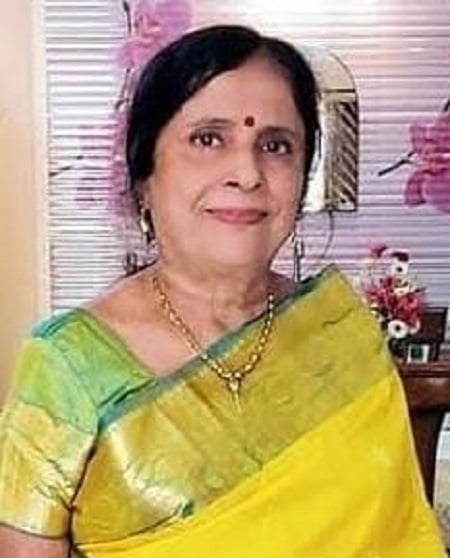
Dr.Radharani Nanda completed MBBS from SCB Medical college, Cuttack and post graduation in Ophthalmology from MKCG Medical College, Berhampur. She joined in service under state govt and worked as Eye specialist in different DHQ hospitals and SDH. She retired as Director from Health and Family Welfare Department Govt of Odisha. During her service career she has conducted many eye camps and operated cataract surgery on lakhs of blind people in remote districts as well as costal districts of Odisha. She is the life member of AIOS and SOS. She writes short stories and poems in English and Odia. At present she works as Specialist in govt hospitals under NUHM.

It was my pleasure trip to the Andaman Islands many years ago.
I returned from Havelock Island and reached the hotel at Port Blair in the evening for sleep and rest.
The receptionist told me - 'Our car will take you to Baratang in the early morning.'
A girl, residing in another suite, came and told me - 'I will also go to Baratang. I am alone and in need of a companion.'
Me - 'I will be happy, if you accompany me. Expenses will be shared. Journey will be pleasant.''
She - 'Exactly what I wish! What an amazing experience it would be !! Thanks for your partnership.'
Receptionist - 'Get ready by 5 am in the morning.'
As per the schedule, we sat in the car and it passed the urban area within half an hour.
Now we were in the virgin forest. The ambiance was echoing with the sweet songs of the chirping birds. The rising sun was peeping through the wild leaves. She was mesmerized by the picturesque beauty of nature.
A check post came on the way, we got down for a security check. We also had our breakfast there.
I told her - 'We are strange friends.'
She - 'The strangeness of the wild sea, unknown archipelago, dense forests, incredible mangrove creeks, uncivilized primitive Jarawa and last but not least - our opposite gender have attracted us and put us together. I was feeling lonely and suffocated amidst the metropolitan cultures, richness, flamboyancy, shallowness in cordiality and emptiness in plenty.
Me - 'Are you a philosopher ?'
She - 'No.'
Me - 'A poet or writer ?'
She - 'No.'
Me - 'What are you ?'
She - 'Ganga … from Delhi.'
Me - 'Ganga or Yamuna - no difference to me. Ok...Thank you.'
She -'What about you…?'
Me - 'Sagar… from Bombay.'
She - 'How incredible! Sagar meets Ganga !'
Me - 'Okay...Maa Ganga ! Security check finished. Breakfast is over. Let us go now'
Our vehicle was running ahead leaving behind the unknown leafy trees, birds and animals.
The driver told us - 'Jarawa tribal area is ahead. Jarawas have not yet left their primitive lifestyle in spite of their upliftments through government sponsored projects and drives. You may see their black beauty with your naked eyes; but don't open the glass of the car nor offer them anything as per the prescribed protocols.'
I told her - 'Ganga ! See the Jarawas - how some of them are sitting beside the road and others are roaming around.'
She - 'I am looking at you - how you are gazing at the bare bodies of females only. Is this not your vulgar outlook or mindset? Have you not ever seen any woman's body ? Have you not loved any girl ?
Me - 'No... Not at all. Student life was lost in studies. My new job is consuming my time. I don't get chances'.
Ganga was laughing at me saying - 'My simple Sagar ! You are meeting beautiful sparkling rivers without loving them !!'
I looked at her blazing eyes and smiling lips. Our car ran past the Jarawas.
We reached Baratang jetty and went to the other side by ferry (vessel). We had our lunch in a restaurant there, and hired a speedboat as well as life jackets for the safety of our lives.
I asked her - 'Have you ever seen creeks and mangrove forests ?
She - 'No.'
Me - 'Can you swim ?'
She - 'No.'
Me - 'If the boat sinks….'
She kept her palm on my lips. By that time, our speedboat had already left the shore and was running in the middle of the creek. Waves were spraying and sprinkling water on her tall slim fair body. Her beauty was dazzling in the sunlight.
She was mesmerized and asked me - 'Won't Sagar meet Ganga while enjoying ?'
Me - 'The speedboat is approaching the mangrove forests. Control yourself. We will go under the mangroves. Their wicked thorny branches may be enamored to hold your beautiful cascading hair and you may be hanging from the branches Before you can say mango!. All this while the boat may be taking Sagar away from Ganga !'
She - 'Ganga may leave the world - but not her beloved Sagar.'
She sat beside me calmly holding my hand. We reached the ferry point, walked to the Limestone Caves and enjoyed their stunning beauty.
We came back to the ferry point and wore our life jackets. Our boat came out of the mangrove forest.
Sunlight was not there. The sky was overcast with black clouds. The weather was windy and rainy. The driver looked at the sky and felt the speed of the wind that was increasing slowly.
The driver said - 'Can't we wait for sometime to avoid the bad weather?'
Me - 'Ok. Wait a while. We will return, when the weather will be fine.'
She - 'No..No. We will go back without waiting for fine weather. If it turns into a cyclone, what will we do ? Our speedboat can run at its highest speed to reach the jetty soon.'
I remained silent. As per her instructions, the driver increased the speed of the boat to the maximum. Now it was not running but flying.
Within minutes, a violent storm came. The high speed of wind, heavy rain with thunder, lightning and high tidal waves captured our boat and us. Our speedboat was in the middle of the mangrove creek away from the shores. Its speed was high as if flying; but the speed of the wind was much higher. In a flush of high wind our speedboat was flown away within the twinkling of an eye. No one knew the other - who went where. Everything was finished
Ganga and Sagar were lost to each other in the stormy mangrove creek.

Sri Ashok Kumar Ray a retired official from Govt of Odisha, resides in Bhubaneswar. Currently he is busy fulfilling a lifetime desire of visiting as many countries as possible on the planet. He mostly writes travelogues on social media.

Anjali grabbed the finger of her Grandpa and pointed to the crazy old man, "Look there, Grandpa, our town's famous looney. You know what he did yesterday?"
Ashish Narayan looked at his bubbly, vivacious fourteen year old grand daughter and smiled, "What's it now? You have already told me about his manning the traffic island and trying to regulate traffic, standing in a corner of the road and doling out water to thirsty souls, and his sitting in the middle of the road to sing Raghupati Raghava Rajaram. So what's new? What did he do yesterday?"
"You know, yesterday I was going to school with a group of girls. The old man saw us at the Kutcheri Chowk, came running to us, made us stand in a single row and march towards the school doing Left, Right, Left; Left, Right, Left. He went up to the school gate, saluted the watchman who could hardly control his laughter, seeing all of us giggling. But he also saluted back, opened the gate for all of us and we ran for our lives!"
"Why?"
She rolled her eyes, the way usually grand daughters do with their grandpas, "Why what?"
"Why did you run for your lives?"
"Because we almost died laughing, silly!"
"O, I didn't know anyone could die laughing!"
"You can, Grandpa, if you march half a kilometer on the road led by a crazy old man shouting slogans and people stopping and staring at you."
Ashish Narayan knew the slogans, but wanted his darling Anjali to tell him, "What slogans?"
"Absurd slogans, like 'British Sarkar, Bharat Chhodo,' 'Inquilab Zindabad', 'Humey Azadi Do!' Grandpa, isn't he crazy, asking the British to leave the country? Doesn't he know India had got her freedom from the British since 1950?"
Ashish Narayan stopped in his track.
"Say that again, my darling Anjali? When did India get her freedom?"
"1950, don't you know?"
Grandpa slapped his forehead with his hands, "O my God, save me from this young generation of dimwits! Aarey donkey, India became a republic in 1950, she became independent in 1947! Do you know what a Republic is?"
Anjali looked at her grandpa, hurt. Why this quizzing? But she was game, "Republic is when you have your flag hoisted by a minister finister, a march past by school and college students and some old, boring, moth eaten songs playing in loudspeaker. That is what a republic is. We have a holiday for that day, don't we?"
"My half-wit angel, what you have said is celebration of Republic Day, but we are a Republic because we are sovereign and democratic. Tell me who was the first Prime Minister of India?"
Prompt came the reply,
"Mahatma Gandhi!"
"Mahatma Gandhi? And who was the first President?"
A little hesitation,
"Chacha Nehru, may be? No, no, it is that Pagadiwallah, Radhakrishnan, yes, Radhakrishnan, because on Teachers’ day our Head Sir tells us Radhakrishnan was the President of India."
"O my little donkey, Mahatma Gandhi was never President or Prime Minister. It was Jawaharlal Nehru who was our first Prime Minister and Rajendra Prasad was our first President. Hasn't your Civics teacher taught you all this?"
Anjali smiled mischievously,
"He might have, but who listens to him? He is an old man, totally hard of hearing. So in his class we tell jokes to each other and laugh. He thinks his lecture is interesting, so we are laughing. That's how he is happy, we are happy, India's history jumps out of the class room window, breaking its legs in a free fall!"
Ashish Narayan laughed at the scenario. Anjali continued, "But Grandpa, this Arjun Sir, our Civics teacher, is a funny man, terribly funny, he says he had joined the freedom struggle and gone to jail when he was seventeen years old. Some days he makes us write Bharat Mata ki Jai hundred times in our note book, other days he asks us to close our eyes and meditate by chanting Gayatri Mantra. He is so boring! You know what he did one day?"
Ashish Narayyan looked at his grand daughter indulgently, "What?"
"He was teaching in the class, the students were talking, there was lot of noise, but being hard of hearing, he didn't know about it. Suddenly one of the boys took out a whistle from his pocket and blew it. Somehow Arjun Sir could hear it, the sound was so piercing. He stopped lecturing, looked at the class and asked what was that sound. No one answered, every one wanted to protect the class mate who had blown the whistle. Arjun Sir guessed it was the sound of a whistle. He got very angry, kept on asking who blew the whistle when he was teaching. After a few minutes he squatted on the floor, and started singing Raghupati Raghava Rajaram and other bhajans. When the bell rang at the end of class period, he refused to get up. He didn't allow the next teacher to come in. He said he was sitting in Satyagraha, to make the student who had blown the whistle confess."
"And what were the students doing?"
"We got scared, the boy who had blown the whistle told us not to disclose his name and we all sat silently, wondering what would happen next. The Head Sir came and requested Arjun Sir to get up, but he refused. Head Sir enquired who blew the whistle, no one came forward to tell him. The school ended in one hour and we left for home. Next day when we came to our class room to leave our school bags before going for prayer, we were shocked to see Arjun Sir still sitting there, he had not left the place, had not eaten anything and had announced that he had launched a fast unto death to promote truth and honesty among students. After the prayer the Head Sir asked our class to stay back. The boy who had blown the whistle started crying and went to him to confess. We were scared that the Head Sir would beat him black and blue, to our amazement he also started crying. Seeing the Head Sir cry, we all burst into tears. Led by the Head Sir we went to the class room and all of us fell at Arjun Sir's feet and begged for his forgiveness. Head Sir gave him a glass of fruit juice and Arjun Sir broke his fast. After that for a few days we did not disturb Arjun Sir's class, but we considered him a funny man who went on a fast to catch a wrong doer."
Ashish Narayan was surprised,
"Why, what do you think he should have done?".
"Done? Nothing! Why make an issue of such a small thing? And why fast? God has given us only one life, we should eat and enjoy."
"But thanks to his Satyagraha you learnt a valuable lesson."
"Lesson? What lesson? Only for a few days students were quiet in the class, after a week or so we were back again to talking in his class, exchanging jokes and gossip. Grandpa, I don't think this Satyagraha thing works any more. If the Head sir had caned that boy and every one else in the class that day and warned the students against disturbing Arjun Sir's class, we would have been scared and behaved. The language of the cane is the only one students understand. Rest is all farce, innocent entertainment."
Grandpa looked at his teen aged pet. And wondered what kind of society the young generation was growing into.
Anjali paused for a moment and continued, "You know Grandpa, most of my friends think we became a weak nation because we got our freedom through nonviolence, if we had fought bloody battles and won our freedom, if every family had sacrificed a son or a daughter in the Independence war, our country would have been much stronger. What do you think Grandpa, are they right?"
Grandpa was shocked, did the young generation really think like that? Was Gandhi already dead in the hearts of these kids? Had he been shot again by those who thought nonviolence was irrelevant? He looked at Anjali, "No, dear, the whole world thinks nonviolence is a potent weapon, an eye for an eye will leave every one blind. Gandhiji is a Mahatma for the entire world, he set an example for others by winning freedom for India through truth and nonviolence".
Anjali nodded. She was not finished about the old looney on the street, "See, see Grandpa, he has got under the traffic umbrella and is trying to regulate the traffic. But you know what happened yesterday, I had a big shock during lunch hour. After we finished our lunch we were going to wash our hands in the common row of taps. We had to pass through the Head Sir's room and glanced there. To our shock we found this old man squatting on the verandah outside the Head Sir's room and taking his lunch. The Head Sir was also sitting there, along with two teachers and they were urging him to eat. We wondered why they were fawning over this crazy man. Do you know why? Who is he, Grandpa? He must be your age or older to you. Do you know him?"
Ashish Narayan smiled. Know him? Know Birabhadra Bhanjdeo? Who in the town of Rairangpur didn't know him? He remembered a hot, rainy summer morning fifty two years back, he standing before Birabhadra Babu, hands folded, eyes brimming with hope. And Birabhadra Babu, getting up from his chair, patting him on the head and assuring him he shouldn't worry and should proceed to Patna to pursue his B.Sc.. Then he handed over fifty rupees, promising to give more when required. But that was enough to launch Ashish Narayan's studies; in Patna he started giving tuition to high school students and earned enough to finish his B.Sc and M.Sc.
That was two years before India won her freedom from British rule. By the time Ashish Narayan had returned after six years to take up a job as a Lecturer in Physics, things were different. Birabhadra Bhanjdeo himself was a changed man. No longer a freedom fighter, he had become a social crusader.
He wondered if his grand daughter would ever realise in what way life changed in the few years before and after independence. But he felt the time had come to unravel the mystery of the looney of the town, the once celebrated Birabhadra Bhanjdeo, the toast of the town in the pre-independence days.
They were passing along the road abutting the hospital. He stopped and asked her to read out the signboard of the arched gateway. She read it aloud, "Birabhadra Bhanjadeo General Hospital". On the other side of the road was the Government college, "Birabhadra Bhanjadeo Degree College", he pointed it out to her.
"Do you know why they were named after Birabhadra Bhanjadeo? There are half a dozen other buildings also, the Orphanage, the ITI, a few government buildings."
Anjali had no idea.
"Because the land for all these buildings was donated by Birabhadra Bhanjadeo. Do you know who he is?"
She again shook her head.
Grandpa pointed to the old man busy directing the traffic standing under the stone umbrella, as if that was his assigned job and his life depended on it.
Anjali gasped, her hand went to her mouth, eyes bulged out like she was going to have a fit!
"This crazy man, the famous looney of the town? He is such a big man? You say he donated hundreds of acres of land to the government? How much land did he have? A thousand acres?"
"More than that, much, much more. He had inherited all that land. He didn't have any children because he never married. At a young age he had joined the freedom movement, became a disciple of Gandhiji. When India became independent, he gave away all his land to the government. As a high school student......."
Anjali interrupted him,
"Which school was he in? The same school as mine?"
"Yes, I was also a student in that school; your school is more than eighty years old. Even as a high school student Birabhadra babu was quite daring. He used to lead processions of students, burn the mill clothes and stage demonstrations against the government. When you pass through the Kutchery road, you will see the national flag on top of that building..."
"Yes, I have seen it. In winter when the wind is strong it flutters like crazy, as if it will tear itself from the flag pole and fly away."
"It used to be like that even when we were students in the High school except that the flag was different. There was a British flag flying there. Can you imagine a British flag there? Close your eyes and try….."
Anjali closed her eyes and tried but she didn't know what a British flag looked like. She gave up.
"Leave it naa Grandpa, tell me about that uncle!"
Ashish Narayan chuckled. Children in modern times called everyone uncle! Even someone older than her grandpa is also an uncle!
"This uncle, as you call him, was so daring that one night he, along with two of his friends, climbed the sloping roof of the Kutchery building and tore out the British flag and replaced it with an Indian flag. When they were getting down, one of them slipped on the tile and fell. The sentry who was guarding the treasury came running, fired in the air and stopped the three in their tracks. In no time half a dozen other police men came running. They arrested the three young men, took them to the police station and beat them up. Next day they were taken to the British magistrate who sentenced them to three months imprisonment."
Anjali was shocked, it looked like this was a day of shocks for her!
"Grandpa, this uncle went to jail? And the police beat him up? Ah, poor uncle!"
Ashish Narayan nodded, memories of the golden days of freedom struggle flooding his mind, "That was not the only time he went to jail. After that incident, Birabhadra Babu got beaten by the police many times, mostly in a brutal way, but he never gave up, going back to his protests, demonstrations and subversive acts. In four years he went to jail five times and his final release from jail was just a few days before we got our freedom. I was twenty years old in 1947, studying in Patna. And you know, it is Birabhadra Babu who had given me money to buy my ticket to Patna and pay the first year's fees. I can never thank him enough!"
Anjali looked at the old man at the traffic stand indulgently, a new spark of love and respect for him lighted up her eyes, "So this uncle was a good man, how did he become crazy, the undisputed looney of the town?"
"That is another long story. After India won freedom, there was celebration for many, many days. Every one was happy; everyone wanted a piece of the pie which would come in the form of power and loaves of office. Not our Birabhadra Babu, he transferred almost all his land to the government to build hospitals, colleges, old age homes, orphanages. He wanted to be a social worker, going from village to village, telling people to be self-reliant, to produce their own crops, vegetables, and to maintain cleanliness. And you know what, he was obsessed with family planning, whoever he met he would preach the values of a small family. People would often laugh at him, snidely remarking that once he got married he would forget about family planning and produce ten children. But Birabhadra Babu had no plans of marrying. He had a motor cycle, he would leave every morning moving from village to village, door to door and return in the evening".
Anjali had a doubt,
"How did he survive? Was he doing a job?"
"No, he didn't have to. He still had enough income from his left over land. During this time he also started writing a lot, about the country, agriculture, sanitation and all kinds of things. Whatever he used to talk to the people he put down his words on paper and got them printed as pamphlets. He was proud to tell the world that he was a freedom fighter as if it was a badge of honour. So all his pamphlets ended with his name Shri Birabhadra Bhanjdeo, followed by FREEDOM FIGHTER in capital letters and below that "Went to Jail Five Times" in brackets. See how proud he was to announce that he had been in jail to fight for the freedom of our country!"
Anjali was getting impatient. Young girls didn't have a stomach for so much detail, they wanted to know what happened at the end. Given a choice they would like to see a movie starting with the end and rewinding!
"Yes, yes, but tell me how did he become crazy?"
"It happened on one of his trips to Jamshedpur. You know the steel city is the nearest big city for us. Those days our town didn't have many facilities, so Birabhadra babu used to drive to Jamshedpur in his motorbike to print his pamphlets. There were a couple of presses there for printing in Odia also. The incident that changed his life took place three years after our independence. He had parked his motor cycle and gone inside the press. It was already evening when he came out. He found a police constable leaning on the motorbike. Somehow with the number of beatings he had received form the police Birabhadra babu had an aversion for them, although he knew that the police no longer worked for the British. But he was tired, hungry and eager to return home. He must have burnt a fuse seeing the police man leaning on his motor bike and smoking a bidi. No one knows what kind of arguments took place between the two. In our Rairangpur town Birabhadra babu is a legend, no policeman would have touched him, but in Jamshedpur hardly anyone knew him. The policeman, who was probably drunk, took him to the police station and started abusing him. Birabhadra Babu being a freedom fighter had a dreamy vision of the free India in which police atrocity had no place. He got so angry that he slapped the policeman. In independent India slapping a policeman is like kicking a cobra. The police man tied him up inside the lock up and gagged him. Then he drank some more liquor and beat up Birabhadra Babu as if he was a dreaded dacoit. The brutal attack left him traumatised, his nose was broken, his eyes were swollen, elbow was shattered, his brain had concussions. Next morning the duty officer found him unconscious. He searched the bag and from the photo and the name he knew the police had bitten more than they could chew. But even in those early days of independent India our policemen were very smart. They tied him to the pillion of the motor bike and the duty officer drove it into the forest and left it there. He made it appear like an accident, pushing the bike to the ground and laid the unconscious body of Birabhadra babu at a distance. The bike and the famous freedom fighter were found by some local men and somehow he was brought to Rairangpur. But enough damage had been done to the brain of the hero of our town."
Anjali was aghast to hear this, she raised her eyebrows, "How did you come to know all this?"
"A week later, the rogue police man bragged about it in a liquor shop after he was drunk and that is how the story came out and spread. Birabhadra babu recovered after a month but he had gone insane. Somehow the severe beating and torture in the police station at Jamshedpur gave him the idea that he was brutalised by the British police, that India was still under British rule, fighting for freedom. Birabhadra babu jumped into the freedom struggle again, against all that the British rule stood for; injustice, oppression, insane brutalities and inhuman treatment. He is still fighting for it........"
Ashish Narayan fell silent, his voice choked. He remembered life had not been kind to him either. He also stood for principles, honesty and justice. Things had changed rapidly in free India, as if freedom was a license to perpetrate all kinds of irregularities. Promotions, transfers in jobs were bought by paying bribes, red tape killed initiative for academic excellence and students were more interested in passing exams than acquiring knowledge. Teachers like Ashish Narayan had become increasingly irrelevant, often objects of ridicule and pity.
Anjali sensed something had gone wrong, Grandpa was probably silently communicating with his old friend, the freedom fighter and reliving his good old days with him, when the uncle was sane and the world was saner.
ESSAYS, ANECDOTES, TRAVELOGUES
GLIMPSES OF OUR HERITAGE - Why Shiva adorns crescent Moon?
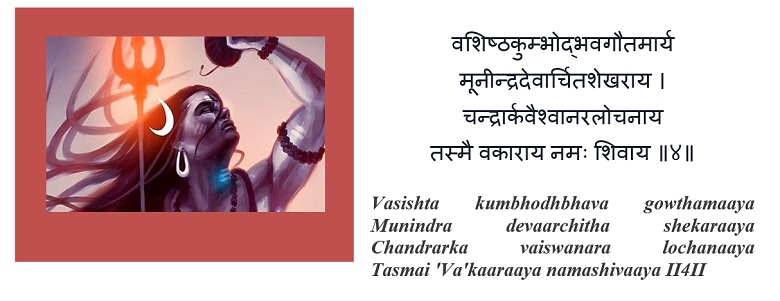
Meaning:
He who is worshipped by the best and most respected sages – Vasishtha, Agastya and Gautama, and also by the gods, and who is the crown of the universe,
He who has the moon, sun and fire as his three eyes,
Salutations to that Shiva, who is represented by the syllable “va”. II4II
Symbolism has found its way since the start of the Vedas Shiva has many symbols that are associated with him. The attributes of Shiva mainly are the adorning crescent Moon or Ardha Chandra, the serpent around his neck, a garland of skulls, the holy river Ganga flowing from his matted hair, the third eye on his forehead (the eye that turns everything in front of it into ashes when opened), the trident as his weapon, and the damaru or drum. He carries also rosary of Rudraksha beads He also carries in his hands sometimes a deerskin and a club with a skull at the end. That skull identifies Shiva as a Kapalika (“Skull-Bearer”) and refers to a time when he cut off the fifth head of Brahma. Whenever we find one or more of these elements, we immediately think of Shiva.
The Yujur Veda, 32:3 describes Shiva as - NA TASYA PRATIMA ASTI” - “ It does not mean there's no image of him. It actually means there's no specific image of Par Brahman.” Thus, it is relevant to understand that he is “Formless”. Though all forms belong to him and he is happy in whatever way you look at him yet there is no single form in the world that describes him. However, we revere Shiva with an image in mind and worship in a particular manner. One of the popular names of God Shiva is Chandrashekara. He got this name after he gave refuge to Chandra on his matted locks after Chandra was cursed by Daksha.
Sadhguru says that “There are many names for Shiva. One name that is very commonly used is Soma or Somasundara. Soma could literally mean the Moon, but soma essentially means inebriation or intoxication. Shiva uses the moon as a decoration because he is a great yogi who is intoxicated all the time, but he sits in great alertness. To enjoy the intoxication, you must be alert. Even when you drink, you try to stay awake and enjoy the intoxication. And that is how yogis are – totally drunk, but fully alert.”
“The science of yoga gives this pleasure to you to be internally drunk all the time, but one hundred percent stable and alert. There has been a lot of research in the last couple of decades, and a particular scientist found that in the human brain, there are millions of cannabis receptors. If you simply keep your body in a certain way, the body will produce its own narcotic, and the brain is waiting to receive it. It is only because the human body produces its own narcotic that feelings of peace, pleasure and joy can happen within you without any stimulus from outside.”
Some analyse from a scientific and philosophical point of view, the crescent moon on Shiva’s forehead and come to the conclusion that the crescent moon on Shiva’s forehead depicts control on time in terms of nature. The waxing and waning of the moon was used to calculate the days and months in earlier times. The crescent moon indicates that He has controlled the mind perfectly. The crescent moon is shown on the side of the Shiva’s head as an ornament. The waxing and waning phenomenon of the moon symbolizes the time cycle through which creation evolves from the beginning to the end. Since Shiva is considered as the eternal reality, He is beyond time and has complete control over time.
Legend
There is only one legend on the issue of why Shiva adorns ardhachandra on his head. According to the Srimad Bhagvat, Chandra is the son of Maharishi Atri and Anasuya and he is equipped with sixteen arts. He is gracious, winner of heart, nectarine, and masculine God. Chandra’s clothing, horses, and chariots are all white. He sits on a lotus seat on a beautiful chariot with seven horses. He has a beautiful golden crown on his head and a pearl garland of beads around his neck.
Legend has it that Moon, married twenty seven of Daksha Prajapati’s daughters In astrology, these 27 daughters are the Nakshatras namely Ashvini, Bharani, Krittika, Rohini, Mrigashirsha, Ardra, Punarvasu, Pushya, Ashlesha, Magha, Purva Phalguni, Uttar Phalguni, Hasta, Chitra, Swati, Vishakha, Anuradha, Jyeshtha, Mula, Purva Ashadha, Uttar Ashadha, Sravana, Dhanishta, Shatabhisha, Purva Bhadrapada, Uttar Bhadrapada, and Revati. When Chandra married to Daksha’s 27 daughters, Chandra accepted the condition placed by Daksha that Moon would treat her 27 wives with equality, love and care. But post marriage, among all 27 wives Chandra was attracted by the beauty of his fourth wife Rohini Nakshatra and spent most of the time with her and ignored the other 26 wives/Nakshatras. 26 wives were not happy with the state of affairs of Chandra. They too wanted the regular support, equal love and care of their husband Moon. They pleaded that their husband Moon should stay with each of them as well. But that did not happen. The disappointed daughters complained to Daksha about Chandra’s favouritism for Rohini. By listening to the complaints, the Moon’s behaviour angered Daskha. Daksha cursed his son in law Moon that he would decline all his powers with the passing of each day and would suffer from the Tuberculosis (Kshyayrog). He cursed Chandra that his body of which he is so proud will fade away. Soon the body of Chandra started fading away. This caused discomfort on earth. Several plants and herbs need the moonlight to survive. After the curse, Moon started losing its luminescence each day; Chandra didn’t know what to do. He got afraid and ashamed and thereafter disappeared into the ocean. As a result of this, there were many herbs which require the light of the moon to grow, started suffering in the absence of the moon. Moreover, due to the moon disappearing in the ocean, there was a lot suffering in the entire world.
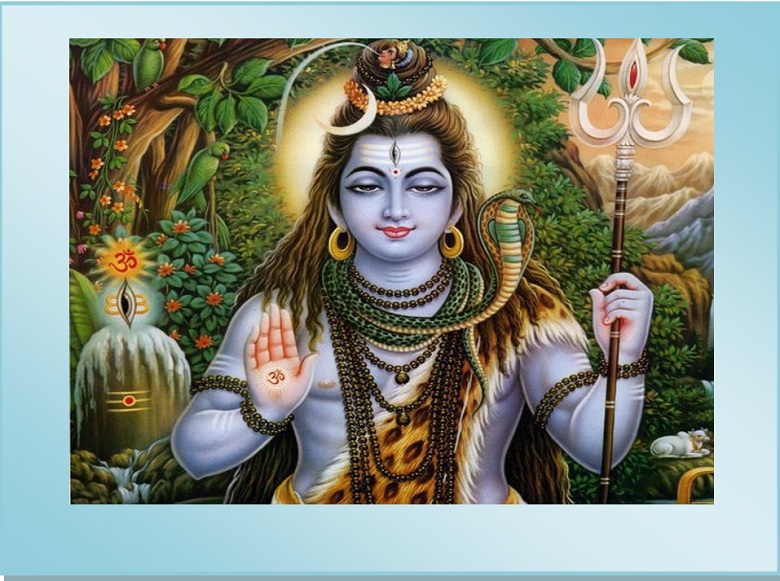
After getting a curse to the Chandra, the 26 daughters of Daksha were regretting that their intention was not to punish Chandra. They wanted that he should pay attention to them and love them as well. Chandra begged lot to his father-in-law Daksha requesting him to take back the curse. But, once a curse is uttered no one can undo it. So also Daksha couldnot do anything. Daksha suggested to Chandra to pray Shiva. The celestials also advised the Moon to take refuge in the Shiva. He also went and sought advice from Brahma. Brahma told him that the only recourse was to pray to Shiva.
Chandra then approached Lord Vishnu who directed him to pray Shiva as Shiva is the supreme physician and the keeper of the sacred herb Soma. As Chandra was left with only one part (Kala), He approached Lord Shiva who helped Chandra in regaining his lost lustre and glory with the herb Soma. But Daksha cursed him again and he took the help of Shiva and this continued for a long period. Finally, Shiva asked Chandra to take refuge in his lock of hair on his head where he will find enough soma to rejuvenate periodically. Hence the curse of Daksha causes the moon to wane. As Shiva rejuvenates Chandra by giving him refuge in His matted hair, He came to be known as Chandrashekara, which is one of the pleasant forms of Shiva and in this form he cures ailments and helps in fulfilling the wishes of his devotees.

Chandra went the famed holy spot in Gujarat (Prabhas Patan) and established a Shivalinga and prayed solemnly to Shiva.on the banks of the river Saraswati. He prayed to Shiva for six months. The Shivalinga to which Chandra prayed is Somnath, the first of the Jyotirlingas. Shiva is always present at that tirtha. Somnath means the “Protector of the Moon God”. Legend has it that the first temple at Somnath was built by Chandra. By seeing the Chandra’s devotion, Shiva was pleased and told Chandra that “I sympathize with your plight, but I can’t reverse the curse of Daksha. Somehow I can make relaxation to some extent with your situation and said to Chandra, you will be Waxing moon (increase in brightness) for 15 days in Shukla Paksha and will be Waning moon (decrease in brightness) for 15 days in Krishna Paksha . You will fill the world with your radiance on full moon days (Purnima) and disappear on new moon days (Amavasya). Due to this reason, Moon passes through one Nakshatra each day (approximately) and goes full circle through all the Nakshatras in one month. Chandra was not happy with the thought of Lord Shiva of waxing and waning. LordShiva said to Chandra that He would hold Chandra’s crescent moon (Ardhachandra) in his hair, which would indicate Chandra constantly about the curse and the strength reduction. However, Chandra remains the constant companion and Lord Shiva comes to be known as Chandrasekhar. Moon is also known as the soma and one day of the week Somvar, or Monday is dedicated to him.
Chandrasekhara Ashtakam
Chandrasekhara Ashtakam was written by Sage Markandeya, an ancient Hindu Rishi who was saved by Chandrashekara or Lord Shiva from Lord of Death (Kala or Yama) at the age of 16 and blessed him to remain 16 years old forever. It is believed that Sage Markandeya sung this beautiful Sanskrit stotram when Chandra Shekara (Lord Shiva) saved the sage from death. Benefits of chanting Chandrasekhara Ashtakam daily or on Monday will not have any fear of death and will have healthy life and gain wealth due to Lord Chandrasekhara’s blessings. First few slokas are given below:
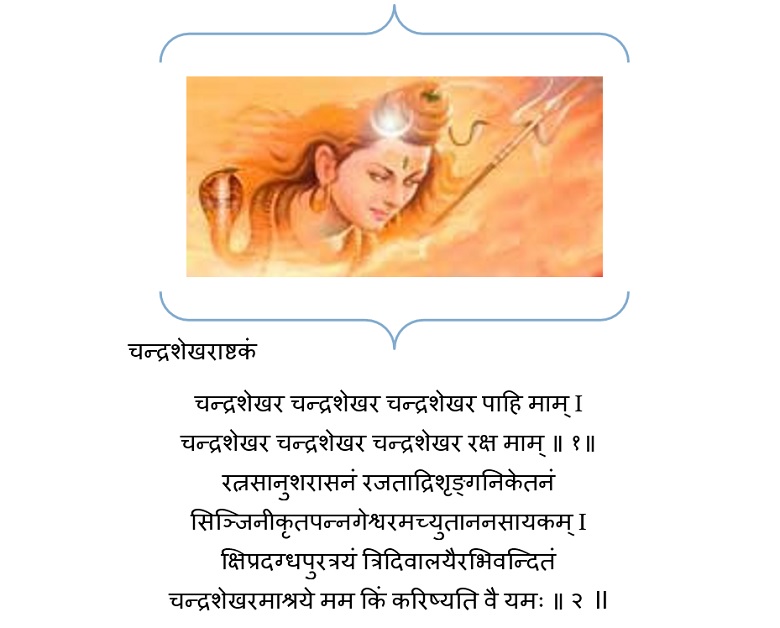
Meaning: I seek refuse in Him who has the Moon on His head, who made the mountain of jewels into His bow, who resides on the mountain of silver, who made the serpent Vasuki as a rope (for samudra manthan), who made Lord Vishnu as arrow, and quickly destroyedthe three cities, and who is saluted by the three worlds, and so what can God of Death do to me.
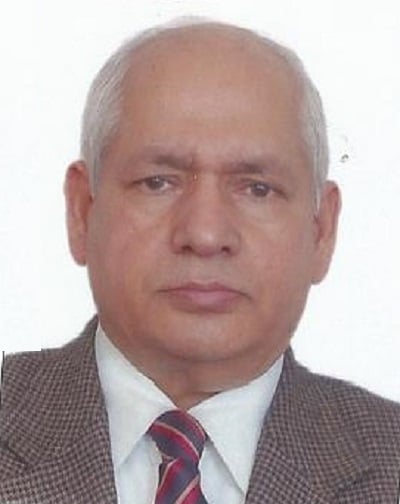
Dr. Ramesh Chandra Panda is a retired Civil Servant and former Judge in the Central Administrative Tribunal. He belongs to the 1972 batch of IAS in Tamil Nadu Cadre where he held many important assignments including long spells heading the departments of Education, Agriculture and Rural Development. He retired from the Government of India as Secretary, Ministry of Heavy Industries and Public Enterprises in 2008 and worked in CAT Principal Bench in Delhi for the next five years. He is the Founder MD of OMFED. He had earned an excellent reputation as an efficient and result oriented officer during his illustrious career in civil service.
Dr. Panda lives in Bhubaneswar. A Ph. D. in Economics, he spends his time in scholarly pursuits, particularly in the fields of Spiritualism and Indian Cultural Heritage. He is a regular contributor to the Odia magazine Saswata Bharat and the English paper Economic and Political Daily.
MATHA TEKA AT HARMANDIR SAHIB AND DANCE AT WAGAH BORDER
We were worried about the hot climate of Amritsar in the second half of June, as the mercury was hovering around 45 degrees Celsius, before launching our trip to the cool hill stations in Himachal Pradesh via Amritsar. But a day before our scheduled departure, a spell of torrential pre monsoon rain that lashed-out the city, has brought down the temperature to 25 degree which gave us a big respite. As our Vistara flight was circling for landing at Amritsar, we were amazed at the sight of accumulated rain water standing on the farm lands around Sri Ram Das Ji international Air Port. At the arrival gate we were greeted by one Suraj Singh ji- our would be driver cum guide, for a week long detour in the lap of the Himalayas after a two days break in the vicinity of the Golden Temple. We drove to our hotel near Swarna Mandir Police Chowki . As our room was on the top floor of the hotel with a balcony facing Golden Temple we couldn’t resist our eagerness to have a quick look at the iconic Golden Temple from the balcony . Since the mesmerizing sight has cast a spell on us, after a bird’s eye view over the Golden temple complex, we decided to visit the temple in the evening as our hotel was barely at a stone’s throw away distance from the Akal Takhta side entrance.
HARMANDIR SAHIB
Usually darkness descends over Amritsar by 8.30 pm in summer. We made our spiritual journey to the preeminent spiritual sight of Sikhism; the iconic quadrangle edifice of Golden Temple reverberated with soul elevating chants ranted by the umpteen numbers of devotees. We wrapped up our heads with scarf and white kerchief before entering the temple complex after depositing our footwear in the shoe stand manned by extremely polite volunteers who would polish your shoes and put them in racks. Being pulled by the grandeur of the Swarnamandir and overwhelmed by the courteous behavior we have forgotten to collect the token. Hardly we have proceeded to the foot wash area than an aged volunteer rushed down to the foot wash area and handed over the shoe deposit token and this old gentleman has endeared himself to us and we bowed down our heads as a mark of humility.
Evening time is more suitable due to its cool, calm and serene ambience .The chants refresh your mind and soul and give you inner peace .Besides this ,the entire temple complex looks stunningly mesmeric in the night. As we descended to the parikrama , we saw a Palki procession was rounding the inner side of the temple complex surrounding the holy pond . We joined the Palki procession clapping our hands and keenly listening to the sarbat kritan . There are several rites performed every day in the Golden Temple as per the historic Sikh tradition. These rites treat the scripture as a living person, a Guru out of respect .It was learnt that the 10th , Guru Gobind Singh Ji decided that there was no need for a further living soul of a guru and therefore named the 11th guru as ‘Guru Granth Sahib Ji’. Darbar Sahib Rituals include closing rites called sukhasan at night, after a series of devotional kritans and three part ardas. The Granth Sahib is carried on the head, placed in to a flower bedecked, pillow cushioned palki and carried on shoulders amid the ceremonial chanting around the Amritsar( Nectar pond)on the marble floored parikrama to the first floor of Akal Takht . Once the holy Granth Sahib arrives there the scripture is taken into a bed.
The opening rite is called Prakash which means ‘Light’. About dawn every day, the Granth Sahib is taken out from its bed room carried on the head, placed and carried in a flower decorated palki(Palanquin) with chanting and bugle sounding across the causeway to the sanctum of Harmandir Sahib .Then after ritual singing of a series of kirtans and ardas , a random page is opened .This is the Mukawak of the day , it is read out loud and then written out for the pilgrims to read over that day. As the Holy Scripture retires for the night and securely ensconced in the strong room of Akal Takht , we came back to our hotel by 11pm ,which was on the other side of the Akal Takht .
It is gathered that –the 4th Sikh Guru Ram Das ji has excavated a man-made pool on the site of the temple which was completed in 1577. In 1604, Guru Arjan Singhji placed a copy of the Adi-Granth in Harmandir Sahib. The Gurudwar was repeatedly rebuilt by the Sikhs after it became a target of persecution and was destroyed by the Mughal and invading Afghan armies. Maharaja Ranjit Singh after founding the Sikh Empire rebuilt it in marble and copper in 1809 and overlaid the sanctum with gold leaf in 1830. This led to the name the Golden Temple. The iconic Golden Temple is spiritually the most significant shrine in Sikhism. The Golden Temple is an open house of worship for all people, from all walks of life and faiths. It has a squire plan with four entrances and a circumambulation path around the pool. The four entrances to the temple symbolize the Sikh belief in equality and the Sikh view that all people are welcome into their holy place. A true Sikh begs for the good for all beings of the world and selflessly prays for all to prosper, because the same one God resides in all of us. The Sikh should realize that he is ‘one with the rest’. It is perhaps the only shrine where no deity is worshipped, only the sacred scripture (Adi Granth Sahib) is worshipped.
The temple complex is a combination of buildings around the sanctum and the holy pond. One of these is Akal Takht-the chief centre of religious authority of Sikhism. Additional buildings include clock tower, the offices of Gurudwar committee, a museum a langer- and a free Sikh community –run kitchen that offers a vegetarian meal to all visitors without discrimination. Over 1,00,000 people visit the holy shrine daily for worship and almost all of them love to dine in the free kitchen and experience unique feelings after enjoying the taste of the mouthwatering langar meal.
On the second day of our sojourn in Amritsar, We visited the Golden Temple once again to pay our obeisance (Matha Tekka) at the sacred shrine of Sri Harmandir Sahib early in the morning. As we joined the surging crowds, I have forgotten to tie a rumal on my head and was politely stopped by a volunteer who tied a saffron rumal on my head for which I was deeply touched and bowed my head before the spear wielding Nihanga Sikh .Though it took almost 2 hours to reach the site of holy Adi Granth Sahib ensconced in the sanctum, we didn’t feel uncomfortable as the cause way was covered with Samiana and fitted with adequate overhead fans and huge air coolers lined intermittently both side of the causeway . Added to it, the volunteers were offering clean cool water in bowels to the thirsty devotees. It was remarkably noticed that in the Golden Temple complex, the Path (reading of holy scripture –Granth Sahib), and Kirtan(Singing of Hymns from the holy text) is carried on most of the time. I noticed something written in bold golden letters on the door jamb of Sri Harmandir Sahib which I couldn’t decipher as it was in Gurumukhi script. I asked a fellow Punjabi devotee to explain the writings on the doorjamb. He was very happy to explain that the line (Dhan Dhan Sri Ramdas Guru Ji) is just an eulogy to the founder of the Darbara Sahib famously known as Sri Harmandir Sahib(Abode ofGod). Being beholden for two hours in the queue and appreciating the golden temple ambience and soaking in the gracious glory of the Sikhism, we could be finally inside the sanctum to offer our obeisance and supplication before the Adi Grantha Sahib- treated as a living embodiment of Hari (God). We were fortunate to receive karah Prasad from a sewadar – an aromatic rice cake, which we liked to share with our family and friends. After a soul elevating darshan as we exited feeling blessed, we were offered ghee soaked halwa which we savored on the spot. Then we headed for the langar sewa hall and took our seat amidst thousands of devotees on the carpet to enjoy the mouth watering langar dishes – rice, ghee smeared rotis, kali daal, mixed vegetable curry, green chutney and kheer ,to our utter satisfaction. It is believed that serving mankind in any form is the noblest activity that brings prosperity and happiness in life. It is pertinent to mention that, this type of dedicated free community kitchen ,offering food to thousands of visitors ,not to be seen elsewhere.
JALLIANWALA BAGH MEMORIAL
After enjoying a delicious lunch at the Golden Temple langar , we stepped into the historic Jallianwala Bagh Memorial ground with utter humility, which stands as an inhuman and monstrous testimony of British colonial brutality since 1919. This historic garden and memorial of national importance is situated close to the Golden Temple complex to the right side from the exit point of the clock tower, barely at a distance of 100 meters. This national monument is preserved in the memory of those wounded and killed in the Jallianwala Bagh massacre that occurred on the site on the festival of Baisakhi, 13 April1919. A large peaceful crowd had gathered at the Jallianwala Bagh in Amritsar to protest against oppressive the Rowlatt Act and arrest of pro-independence activities. In response to the public gathering, the British general Dyer surrounded the protesters with the soldiers of British Indian Army. The 7 acre ground could only be exited on one side, as its other three sides were enclosed by buildings. After blocking the exit with his troops, he ordered them to shoot at the crowd, continuing to fire even as the protesters tried to flee .The troops kept on firing until their ammunition was exhausted. Around 379 people were killed and 1500 injured of whom 192 were seriously injured. As a mark of solidarity and respect, the seven acre site has been declared by the government of India as a memorial of national importance in 1951 , housing a museum, gallery, and several memorial structures .It was renovated between 2019-21 with some additional black granite structures depicting the often quoted patriotic speeches of our leading freedom fighters .The site was visited by Queen Elizabeth-II in 1961, 1983, and 1997 and British Prime Minister David Cameroon in 2013 to atone the wrong doing. An official apology from the British dispensation is still awaited, though the then secretary of state for war Mr. Winston Churchill decried the massacre as ‘unutterably monstrous’ in 1920.
BEATING THE RETREAT AT ATTARI-WAGAH BORDER
If you are visiting Amritsar , a visit to Attari- Wagah border must feature in your itinerary. You can’t claim that you have seen Amritsar ,if you have not visited the fabled Wagah border to witness the awe-inspiring flags lowering show by the Indian Border Security Forces and Pakistan Rangers. As suggested by the guide cum driver, we started for the Attar-Wagah border by 3 pm and by the time we arrived at the car parking, few visitors were noticed proceeding through the BSF security gate to the visitors’ gallery. Guided by the dictum-early bird catches the worm-we were the luckiest few to occupy the front line seats of the VIP gallery in accordance with the policy-first come first serve, as there was no seat numbering system . I have the privilege to collect VIP pass through my friends from Land Customs Station, Attari. Visitors were pouring in and by the time the Clock on the wall of the Golden Jubilee Tower struck 5, all the galleries were almost full to the capacity with around 30,000 people. The wagah border is a much acclaimed place to experience the nationalism on both sides of the border and to watch daily co-ordinated parade by both the Indian BSF and their counterpart the Pakistan Rangers. Much before the parade begins; the children are encouraged and allowed to run flying the national tricolor followed by the Indian womenfolk to dance their hearts out to some foot-tapping patriotic songs-a-la-bollywood style. We could notice no such dance happening on the other side of the fence as womenfolk of that side are not allowed to dance due to purdah . Also we noted that the attendance was rather thin on the other side, probably 1|10th of the Indian side.
Beating the retreat is a 17-century military practice that was used to summon neighboring patrolling units to their fortress. The ritual would take place as the soldiers return from their patrolling units to their encampment as sunsets in the western horizon. Beating the retreat at Attari-Wagah border is an exotic display of military valor on the border crossing avenue of Grand Trunk Road connecting Amritsar-Lahore filling it with patriotism ,music, dance to the tune of patriotic numbers. Every day at dusk (retreat parade starts at 5.15 PM in summer and 4.15PM in winter season), security guards of both side, in gracieux uniforms yowling commands (letting the breath out for quite some time) and parade briskly with high leg flinging motions, high kicking, leg stamping snorting, and finally co-ordinate with their counterparts to open border gates, ceremonially pull down the national flags in unison and then finally close the border gates. The flags are folded and taken to the respective fortress with respect and the ceremony ends with a retreat that involves a brusque handshake between soldiers from either side followed by the closing of the Iron gates simultaneously. At any rate it was once in a life time unforgettable outing to feel the patriotic fervor, derive maximum pleasure seeing the dancing beautiful damsels in thousands on the avenue of the Joint Check Post at the international border crossing –a way to defuse tensions perhaps by indulging in this type of playacting. We appreciated the happy, cheerful –“let’s party “attitude of the people around us. During our drive, back to our Hotel, while recapitulating the spellbinding events and relishing the ardent feelings of nationalism in both sides in an atmosphere of carnival, exchanging sweets on special occasions like Diwali and Eid as well as Independence Day and Republic Day functions, and shaking of hands between the soldiers of enemy countries, at one point of time I wished for a beautiful world without boundaries. Our tryst with hot Amritsar came to an end as we retired to bed, hoping to embark upon our second leg of weeklong tour to the cool hill stations in Himachal Pradesh early ,as the day breaks.
Gouranga Charan Roul (gcroul.roul@gmail.com) : The author, after completing post graduate studies in political science from Utkal University, Odisha in 1975, worked as a senior intelligence sleuth in the department of Customs, Central Excise & Service Tax and retired as senior superintendent. As a staunch association activist, he used to hold chief executive posts either as General Secretary or President of All India Central Excise Gazetted Executive Officer's Association, Odisha for 20 years. Presently in the capacity of President of Retired Central Excise Gazetted Executive Officer's Association, Odisha, coordinating the social welfare schemes of the Association. Being a voracious reader, taking keen interest in the history of India, Africa, Europe and America. In his globe tottering spree, widely travelled America and Africa. At times contributing articles to various magazines.
LUCKNOW- AYODHYA TRIP
Seethaa Sethuraman

For a nervous air traveller, Terra firma always helps. Thus, as usual, this flight too was a mix of anxiety, Indigo's never changing food fare (there is a lot of comfort in the familiar at one end but a feeling of boredom at the other) and floating in air - physically, within a man-made machine and psychologically, in our minds. Mom and I were taking this trip to Lucknow and Ayodhya - we complemented each other perfectly - she was psychologically far stronger while, I was physically ahead of her, for obvious reasons.
After a very good landing by Manish Wadhwa, (our pilot with a calming voice); at Lucknow's Charan Singh airport's runway; normalcy returned to my body system, albeit a little slowly compared to the speed with which my mobile network came on. Well done, Vodafone! Technology makes you feel good (only sometimes) and shifting the mobile network away from "Flight" mode upon the plane's landing; is definitely one such occasion.
Gathering our luggage from the announced belt number and with some mandatory selfies in place; we plonked ourselves into some extremely ordinary looking chairs in the "travesty" of the "only" Food court at Lucknow airport's arrival area; to grab something light.
We were headed straight to Ayodhya (thus, wanted to continue keeping our stomachs light, so as to easily endure more travel without anything untoward happening but, at the same time, we did feel the need to have something) and our hired car service owner (Deepakji) had made it clear that he was very much there at the arrival, well before time. Jai Siya Ram! Can we catch some breath Sirji - after all, this was the much-awaited vacation that one was keenly looking forward to? And, we did - the world can wait and so can, Deepakji.
Well, we chose latte out of the few "healthy" choices available at this seemingly, "makeshift" food court (had a good mind to talk to some airport authority to understand more about the rationale for this spartan food court, but stronger forbearance prevailed along with the looming guilt that someone was waiting for us) and then, trolly-ed out towards Lal Bahadur Shastriji's statue, the landmark mentioned by Deepakji to me. Not that there was anything else worthwhile outside the airport, that one would've otherwise taken notice of or would've been distracted by.
Deepak(ji) spotted us quickly (he was a young chap, possibly in his early's 30's at best and was the owner of the travel service from-to Ayodhya. My aunt, Mom's sister, who had reached Ayodhya earlier, suggested that it was best to avail of Deepakji's travel service to track down our remotely tucked-in destination in Ayodhya) and with the luggage safely in the boot, we sped towards Ayodhya; literally. The distance from Lucknow to Ayodhya is around 2 and half hours but the driver seemed to be in a tearing hurry (at least in our estimate) - we had to tell Deepakji about our sensitive nerves (who then instructed the driver accordingly) and the rest of the ride was far more comfortable, at a lesser speed.
We were travelling on NH 28 - some landmarks that I jotted down on the way were the Awadh yojana vihaar colony, Babu Banarsi Das (BBD, for short) university and then, as we moved out of Lucknow; large fields of sugarcane and wheat, on both sides of the roads.
We reached Sita-Vallabh Kunj, opposite Yogi Mahal (my latter explorations of Ayodhya revealed that every other ordinary looking building in Ayodhya was called a "mahal" - afterall, it was a building in this auspicious place of Ayodhya, isn't it?) nestled in the innards of Ayodhya. This temple was constructed by Krishna Premiji - his younger son (Ranganji) along with wife (Jhanani) and school going daughter (light-eyed Champaka Lakshmi) were the main attractions of this current program of navaham (recitation of Ramayanam cum discources for 9 days) - the genesis of our Lucknow-Ayodhya trip was Mom's interest in participating in this program for a few days, visiting few places in and around Ayodhya and then spending time in Lucknow as well. So, there we were, in Lord Ram's place; so different than good old Bombay.
ADRENALINE RUSH FOR A CAUSE AT TATA MUMBAI MARATHON
Seethaa Sethuraman

The 10 kms run at the Tata Mumbai Marathon (TMM) offers two pronged benefits viz., (1) Helping to work towards creating a better Self (physically and mentally) and, importantly, (2) Contributing to a Social cause and thus, giving back to Society. A perfect way to create a better world!
Familiarity has a soothing effect on frayed nerves. Given that it was my second time at the TMM, 10 kms; the drill to be encountered on Marathon Day were somewhat familiar. However, the thrill of a challenging proposition like a long-distance run and the excitement leading up to the Marathon Day; was very much palpable, this time too. Guess, these provide the impetus to the runner to give it one’s all, on D-day; provided it is backed with requisite amount of regular training. Owing to multiple reasons, my training was below par, this time over – that was a tad, unsettling, one must confess. However, there was no shortage in one’s determination to make things work; under any circumstances.
While my anxiety levels were under control this time over; as luck would have it, one developed an unexpected dull stomach ache, in the morning previous to the Marathon Day. And, despite putting my pharmacy knowledge to the maximum use, none of the medicines seemed to provide 100% relief. So, there it was – I carried the ache into the Marathon Day as well.
Despite that, one was clear – “No excuses to be made – Nothing can deter me”. One was determined to run the Marathon and complete it successfully. Further, my commitment to the LOLT cause added on to my determination.
Needless to say, the atmosphere on the Marathon morning was nothing short of electric. That, Mary Kom was there flagging off our race, added to the enthusiasm and momentum. After all, didn’t she beat all odds and make it to the top honours in her field? At the holding area before the start of the Marathon, I saw couple of very young girls and boys in their LOLT Tee-shirts – they looked at me in the LOLT Tee-shirt and I suppose there was an unspoken connection of being part of the same cause.
It was a much warmer Marathon morning compared to the previous year. And, despite, not being my best run of the season and with quite a bit of calf muscles’ cramping as well during the course of the run; one managed to cross the finishing point successfully. And, that, in itself, was a huge high. As they say, “All’s well that ends well”.
Education moulds us to become better human beings and there can be no better gift than providing the power of education to those who are deprived of it. The work carried out by the Life of Light Trust (LOLT), particularly in empowering the girl children of rural Maharashtra, through their educational programs; specifically interested me. Thus, one decided to do my bit in supporting their cause.
I was really happy to don the LOLT Tee-shirt while running the Marathon and spread visibility of this NGO; that has its heart in the right place.
I wish LOLT every success in carrying on with their LOFTY endeavours of spreading education to more and more girl children in our country.
Seethaa Sethuraman has had a creative orientation right from her school days – dabbling in writing,drawing and painting as well as learning Indian dance forms and Carnatic music. Thereafter, the usual suspect in professional education and corporate pursuits assumed centre stage (B.Pharm, MBA by education and a Health market researcher by profession); till the pandemic strongly nudged her to delve back into her creative side; alongside her continuing corporate endeavours. While formally learning Bharatanatyam had already begun since mid-2018; writing poems and drawing-painting turned somewhat prolific since the last 2 years.
As per seethaa, she writes/ draws-paints when the calling within her turns so strong at that moment; that it just cannot be brushed aside till it has been acted upon. So far, she has been doing them for her own self without giving much thought about publishing them. Coming across the Literary vibes platform has, however, enthused her to share this creative happiness with the outer world. Through this process, she also looks forward to receiving feedback/ comments that will encourage her to keep creative expressing; always.

One may say that it is a tree that led to a township . Interestingly this township is different from the traditional ones. It is Auroville, a city in the lap of Nature , situated some 11 km north-west of Pondicherry and approximately 150 kms south of Chennai. Auroville is also known as the ‘City of Dawn’ or as the ‘City of Future’. It is described as a research and experimental township that belongs to humanity as a whole.
It was a barren land before the model city came up there. It is said that a Banyan tree had sent an SOS message to The Mother of Sri Aurobindo Ashram after a nail was hammered to its trunk to hang an advertisement. The Mother sent her team next morning to the spot where Banyan tree was present and she planned that she would have the ‘City of Future’ near this tree or almost the tree as the centre.
In 1965, Mother had drawn the sketch of Auroville which had the basic concepts for the city. It underlined all the important activities that would be performed in different zones of the Auroville. For other things she gave an independent hand to Roger Anger, the French architect , for the city development. Mother had instructed a couple of things : city would be divided into 4 zones and designed for about 50000 people. On the basis of those parameters Roger and his team ,the engineers and city planners came up with the galaxy model after lot of discussions at several stages. At the center it will have Matrimandir, “the soul for Auroville”, a place for individual silent concentration. Four zones emerging out from the center: Industrial (north) Cultural (northeast), Residential (south/south-west) and International (west). Surrounding this zones will be Green belt which has farms, forest areas. The model based on the vision of the Mother would be executed under her supervision and guidance.
Foundation of Auroville was laid on February 28th, 1968 with over 5000 people present consisting of youth, and other ages people representing 124 nations. Soil from 114 countries was poured into an urn in the amphitheatre of the Auroville. The Mother read the Auroville Charter and city was unveiled. The charter has 5 principles which are:-
1) Auroville belongs to all humanity. Irrespective of creeds, politics and nationalities.
2) Anyone who is willingly or unwillingly in service of the divine consciousness is entitled to live in Auroville.
3) It will emerge as the bridge between past and future.
4) It will connect spiritual and material of contemporary world.
5) It will be a place of unending learning of constant progress. Learning will never be stagnant.

The Auroville has a symbol. The dot at the centre of the 2 circle represents Unity, the Supreme; The inner circle represents the creation, the conception of the City; The petals represent the power of expression, realisation. In July 1999, the Government of India accorded special protection to the name 'Auroville' and its emblem under the Emblems and Names (Prevention of improper Use) Act 1950. The Mother has named the Hawain Hibiscus as the flower of Auroville and given it the following significance:Beauty Of Supramental Love (Flower of Auroville)."It urges us to live at its height.".According to the Mother a conscious and intimate relationship with flowers can give an experience of communion with the Divine and it helps awaken the true consiousness in us.
The defining symbols of Auroville includes Matrimandir, the Banyan tree and urn containing the Mother’s charter and handful of soils from all over the country and the world at the time of Auroville’s innaugration. The Matrimandir (also known as Soul of the City) a place for pure silence concentration is present in a large open area called Peace near to the banyan tree. It is a large golden colour sphere which symbolizes the birth of new consciousness. The name Matrimandir means the Temple of the Mother. In Sri Aurobindo’s teaching the Mother concepts stands for helping the humanity to cross all its limitations and reach the next stage.
I had the opportunity to visit the Matrimandir (on Aug 16,2022). An individual who is interested to visit Matrimandir must mail the auroville authorities regarding the interest to visit Mandir atleast before 3 days before the planned visit date and according to the availability the authority will grant or deny the permission. This time I had visited Ponicherry on 150th year anniversary of Sri Aurobindo and considering the rush time, I felt completely blessed and privileged to get the permission to visit the Mandir.
Inside the Matrimandir there is inner chamber in the upper hemishphere of the Matrimandir which is completely white, which has white marbles and white carpets. Before entering the chamber we were given socks to wear, for the floors of the chamber to remain absolute clean. In the center of the chamber there is a pure crystal glass globe which suffuses a ray of electronically guided sunlight that falls on it through an opening at the apex of the sphere. This globe radiates natural lighting in the Inner chamber. The most important thing is the focused light of the sun in the center which is the symbol of future realisations. We were given 20 minutes time to sit there in the inner chamber and concentrate in pin drop silence. We were told to try not to cough also, as it creates a large sound of echo inside the chamber and disturbs the quietude. In case of sneeze or cough, one is advised to go outside the chamber and complete , then come. It is said that Matrimandir is there for those who wants to learn to concentrate. People should stay there in silence. It is a place for trying inner consciousness. After our allotted 20 minutes we came out of the chamber and the Matrimandir and took our return Auroville bus which was provided by the authorities to reach back the Visitor center from where we started the journey to Matrimandir. People on a short visit, have the option to view the Matrimandir from outside,i.e. from the viewing center for which a pass is possible from visitor center.
In the visitor center one can enquire more about the Auroville and various events or activities happening in that city. There are small cafes and restaraunts present near the Visitor center. Many places in the Auroville like the Visitor center, Matrimandir are headed by people from other countries , but they share the common identity of being Aurovillians. There are various workshops, therapies and other activities happening in Auroville which can be found out in their website.
To live in Auroville as permanent resident, one must be a willing servitor of the Divine Consciousness. According to the latest data in their website 95 people have joined in 2021. 3300 Permanent Residents of 60 different nationalities. Three months of volunteering before you apply, One Year – Entry process.
The International Zone (IZ) , one of the four principal zones of the Auroville city that we have mentioned above hosts national and cultural pavilions from across the world,representing all the major cultures. In addition to the National Pavilions, there are also several overarching institutions in the International Zone. These are the Unity Pavilion, The Hall of Peace, Savitri Bhavan, the Auroville International Office (AVI), the Centre for International Research on Human Unity (CIRHU), the University of Human Unity (UHU), SAVI (Auroville Volunteer & Internship Service), and the Auroville Visitors Centre. The International Zone has an area of 74 hectares ,but grouped by continents. Its central focus is to create a living demonstration of human unity in diversity through the expression of the genius and contribution of each nation to humanity .
Another place of interest in Auroville is the Cultural Zone .Planned on a 93-hectare area, situated to the east of the Peace Area, the Cultural Zone is the site for applied research in education and artistic expression. Facilities for cultural, educational, art and sports activities will be located in this zone.
Forest cover in India has fast dwindled to a mere 12% due to many factors, principal reasons being industrialization and wanton felling of trees by the timber mafia. Auroville area was a lush green forest some 200 years ago , but had become devastated in course of time. By the time the project of International Township was undertaken here, it had become completely barren from which one could see the Bay of Bengal in the East clearly without any hindrance. Thanks to the effort of the early Aurovillians ,who are fondly called the pioneers , today we see a sea change – a thick lush green pleasing forest looking so natural ,another identity of the City of Auroville in a green physical base ,giving a lesson to others about forest regeneration , the urgent need of the hour for carbon sink and healthy living.
In Auroville one finds many skill development programs especially those which empower the locals, particularly women and children. Many voluntary groups and non-profit organizations, are working primarily in the domain of Gender, Water, Sports, Business, Finance, Energy, Environment, Education, Child & Youth Development, Art & Culture and Agriculture.
It needs to be mentioned that UNESCO has adopted this unique township that is based on the Mother’s vision and Sri Aurobindo’s ideals. UNESCO through its many resolutions since 1966 has called upon "member states and international non-governmental organisations to participate in the development of Auroville as an international cultural township designed to bring together the values of different cultures and civilisations in a harmonious environment with integrated living standards which correspond to man's physical and spiritual needs."
PM Modi in an address at Auroville in 2018 acknowledged how Auroville has been a pioneer in different fields , be it “un-ending education, environment regeneration, renewable energy, organic agriculture, appropriate building technologies, water management, or waste management.” Hoping that Auroville may serve as a beacon to the world, Modiji said , “May it be the guardian which calls for breaking down narrow walls of the mind. May it continue to invite everyone to celebrate the possibilities of humanity’s one-ness.”
To remember again : Auroville is meant to be a universal town where men and women of all countries are able to live in peace and progressive harmony, above all creeds, all politics and all nationalities. The purpose of Auroville is to realize human unity.
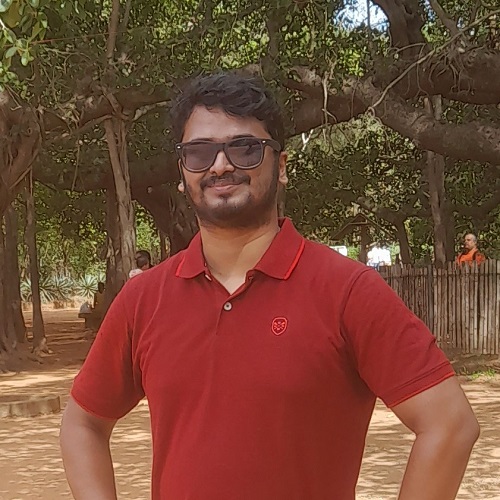
Mr Nitish Nivedan Barik,who hails from Cuttack,Odisha is a young IT professional working as a Senior Developer with Accenture at Bangalore
WORLD SENIOR CITIZEN'S DAY- SOME REFLECTIONS
Satish Pashine

August -21 which fell on a Sunday this year was celebrated as World Senior Citizen's Day. A local branch of HDFC bank in Patia, Bhubaneswar, roped in FM Radio Chocolate and organised a function in the banquet hall of the apartment blocks where I live apparently to felicitate us seniors, but the real objective obviously was to promote their understandable business. They were hosting a meal at the end of the function and that ensured a full house
The opening speaker reminded us that former US President Ronald Reagan had declared Senior Citizen's Day on August 21 by signing a proclamation in 1988. World Senior Citizen's Day is supposed to be an opportunity to celebrate and appreciate senior citizens for their services, accomplishments, and dedication they have given in their lives.
Earlier in the day Chief Minister of Odisha Naveen Patnaik had taken to Twitter and extended his wishes for Senior Citizens Day. He said that senior citizens play a crucial role in enriching our society through their experience, knowledge, and wisdom. The CM had urged people to acknowledge senior citizens’ hardships and provide them with the care, respect, and love they deserve. Pramod Sawant, the Chief Minister of Goa, had also requested people to express gratitude for the love and wisdom the senior citizens provided us.
But the general experience of senior citizens as I and most of you in this zone might know and may even have experienced is that the younger generation doesn’t seem to need or tolerate older people except in some cases when there is substantial inheritance at the stake. Some time back I called a super senior citizen-an old acquaintance. His wife picked up the call. She was very happy to be able to speak to me though I hardly knew her and hadn’t met her in 40 years. She said and I quote, “ it feels so good to get a phone call from you. The world has forgotten us”, unquote. Tears welled up in my eyes and I decided to give at least fortnightly calls to some older people on my phonebook. There was much pain and disappointment in her voice as she spoke. Her only son had moved away to a different house in the same city. She braved it out and said, “he is writing a book and needed privacy and space.”
I remembered the much-publicised case of Mr Vijay pat Singhania the former chairman emeritus of the Reymond Group. A keen aviator, Singhania holds the world record for the highest altitude gained travelling in a hot air balloon notably carried out at the age of 67. This man has several other laurels including the Padma Vibhushan, the third highest civilian award by the Government of India but his son didn’t seem to respect him enough to permit a life with dignity. Such a famous and distinguished man like him is entangled in a property dispute with his son, and had this message for parents across the country: "Love your children and care for them, but don't love them so much that you are blinded".
At the programme, the distinguished invited speakers urged us, seniors, to use our twilight years to give it back to the Samaj (society). Now that the 80 is the new sixty, one of the speakers likened the twenty years left between 60 and 80 to the 20-20 cricket and urged the audience to go full blast and do something worthwhile so that we will automatically be respected now and remembered after we are gone. He gave us the following mantra for a meaningful retired life:
“Buddham saranam gacchami...Dhamam saranam gacchami...Sangham saranam gacchami...”
This means, “I take refuge in Buddha (the spiritual leader), Dhamma (the religion preached by him) and Sangha (the organisation built by him for the propagation of Buddhism).
The learned speaker however interpreted and likened the Buddha to the God all mighty and sangha to the association. He advised that we take refuge in God, religion and our association like the senior citizen’s welfare association that we have and that this will bring us happiness. Simple as it sounded it didn’t provide me with an answer as to how we can change the hearts and minds of the younger generation to respect and care for us selflessly.
Another speaker urged us to romance with life. He narrated a story to give us the message that if we smiled the world smiles with us and so on. But again, it failed to answer my question which I did not ask as I did not want the spirit and direction of the function sponsored by the bank to change tracks. Also, there was hardly any time for such impromptu discussions as I also did not want to stand between my fellow seniors and the dinner.
While all this pep-talk was going on and even after that when the radio jockeys were trying their best to keep us elders entertained, I felt that it would have been much better if only the previous generation in our society had organised a function just to tell us that they cared and were there for us in case we needed. I kept thinking and my mind was not there in the activities. I was thinking about the general older populace which at present is about 9% in India and is slated to go up to probably 40% by the year 2050 given the developments in health care and awareness. I was thinking about commoners -not about the privileged or talented and educated few. Not everyone can do something great which would attract recognition and respect of the people automatically. We were told that there were legal provisions to safeguard the dignity, safety and even livelihood of the seniors. But can seniors have the strength and/ or wherewithal to use these provisions to their benefit?
I remembered an incident in this very society where I live when in the gym, I asked youngsters either to use earphones or reduce the volume of the noisy songs and music that was on purportedly to help them with their jumba dance exercises. I was challenged, shouted at, and insulted by an educated youngster, and nobody came to my defence even in an elite society like this. Such and worse affronts are faced by seniors everywhere. I was told that sometime back a senior requested a younger man not to walk his dog in the basement for peeing and defecating. The dog wasn't even on a leash. That man insulted and challenged the senior and nobody did anything about it.
THE FOUR ASRAMAS:
In my effort to think about a way of life in which older people would be respected if for nothing then for their years at least my thoughts went back in time to the ancient Indian wisdom of the four ashrams (stages in life as discussed in ancient Hindu texts of the medieval era). Indian thinkers have considered the lifespan of human beings to be 100 years - Jivem Sharadah Shatam!
• First Ashram - from birth to 25 years 0f age “Brahmacharyashram”(celibacy phase).
• Second Ashram-after 25 years of age to -50 years of age “Grihasthashram” (householder phase).
• Third Ashram- after 50years of age to 75 years of age “Vanaprasthashram”(giving up worldly life phase) and,
• Fourth Ashram -after 75 years of age to 100 years of age or till death “Sanyaasashram”(renunciation).
BRAHMACHARYASHRAM:
Up to the age of twenty-five, Brahmcharya represented the bachelor's student stage which focuses on education and included the practice of celibacy. The students were supposed to go to the Gurukul (family clan of the Guru or mentor), reside there, get an education to prepare them for the life and even earn wages to pay Dakshina (honorarium) to the guru. The education in Gurukuls taught the students to lead a life of Dharma (righteousness, moral duties) besides science, philosophy, scriptures, logic, and self-discipline. Brahmacharis learned to respect their elders a virtue which stayed with them for life.
Gurukul education was so different from today’s modern education. In today’s schools and colleges not having a boyfriend or a girlfriend can bring in a tremendous amount of peer pressure. In the west from the age of 18 or even 16, boys and girls want to be on their own and have the right to their private life. This is fast catching on in India also and even kids in their early teens expect parents to knock at their doors before coming in. Their phones and computers are password protected and the passwords aren’t shared even with the parents. They have a lot to hide. The working parents have no time to ingrain the values to care for and respect elders in their wards and the grandparents find it more respectful living on their own not getting the space and respect they expect in their children’s houses. Increasing economic independence has made it possible.
GRIHASTHASHRAM:
After the age of 25 years to fifty years, one is supposed to get involved in household duties of raising a family and caring for them. This is the time when he must get his children educated to face life. Unlike in the ancient medieval ages, there is no Gurukul system. The parents must act as the Guru and the household should take on the duties of Gurukul as the modern schooling system has failed to instil the required values in their students. As described earlier when both parents are working to earn wages to meet their ever-increasing lifestyle demands there is no time for them to mentor the children. They generally grow up to be materialistic like their parents. In families where the mother isn’t working to earn wages, she is often able to guide and mentor the children in the right direction.
VANAPRASTHASHRAM:
Vanaprastha doesn’t mean that one must go to the jungle. Between the age of fifty to seventy-five, the Ashram philosophy suggests that one should gradually get detached from the worldly activities. One should take the role of the seer, not the doer, in family affairs. One should teach the new generation and get away from the day-to-day affairs handing over the reins to the next generation.
It has been said that those who cannot leave the world create their world in the forests as well and those who can leave the world can also make Vanaprastha Ashram at home. The intention is not to go to the forest for Vanaprastha and then later to take Sanyaas(renunciation).
Now the time has changed - there is no joint family system and in most cases from the very beginning of the Vanaprasth, husbands and wives are left alone to fend for themselves . But if we all consider the whole society as our family -the society where we live or our neighbourhood, then the contemplation of these ashrams can give us peace of mind. Shun your role as a doer in society. Be only an onlooker - may be a guide if the members want you to be. Make youth doers and they in turn may look towards you as a mentor guiding them from your experience. This should surely win you their admiration and respect in most cases.
SANYAASASHRAM:
Renunciation( Sanyaas)is the final stage. Life from seventy-five to one hundred years is one of contemplation. Think about who you are, where you came from, and where you want to go. Take Sannyass (renunciation) from worldly life. Go towards spirituality. Think about life. Abandon the illusion. Prepare to go where you have come from, and you will attain peace.
In Sanyaas, you should also leave even the mentor role which you took on in the third ashram and focus only on religion and contemplation trying to achieve the state of needlessness when you do not need or desire any of the worldly things.
But as I said earlier - times have changed now. No one wants to give up their grip over things and this is at the root of many miseries.

I recall - As dusk falls on the eve of India’s Independence Day 2015, there is a sense of calm in our hearts for the first time in 13 years. We are gazing onto our new patch of garden in Bhubaneswar, having come home and we do not have to go over each minute detail in preparation of a Flag- Hoisting at India House! In fact, it had always been busy, busy, busy… on the eve of Independence Day, for over three decades. My recently-retired husband would spend hours checking the morning rituals, including the repast for all the Indian citizens overseas (no trust in me?!) – this was tricky as an Open Invitation is placed in the newspapers, so we could expect from a 100 to 400 persons or in the thousands in some countries! Caterers were always asked to be on standby for refills! From checking that the sound systems were tuned, with a lot of help from our son, to choosing the patriotic songs to be played and checking the metal detectors that sadly entered our lives overseas, even tying the cloth-bunting colours of our Flag on the tents, no detail was too small to attend to.
Yes, I have been told by many he was an unusual High Commissioner/ Ambassador — one “...always fond of working tirelessly , both at the mission and the gardens of the residence!" Then he would ponder over his words for the speech to follow the President’s speech. Finally, that final ‘just checking’ that the rose petals fell gently to the ground as the Flag was unfurled…supervising and standing with the workers, even long after they had left, sometimes till midnight. What thoughts coursed through his mind? Each day in 'govt. service'- as it is fondly called in India, dedicated to his home-land and its citizens overseas, the PIOs People of Indian Origin and local dignitaries and diplomats...quite daunting, I would imagine.

At India House Nairobi
I never intruded into those precious moments of reflection and stillness. From Madagascar with Comoros, to Uganda with Rwanda and Burundi, to Kenya with Somalia and Eritrea and earlier, from Korea to Finland and then to the isthmus of Panama and Sri Lanka — our moments with the Indian diaspora, have been etched into our hearts. I still recollect with fondness my very first Independence Day celebration overseas.

Our High Commission family in Nairobi
We were called to prepare two thousand gulab jamuns and samosas, as there were no proper Indian caterers at the time. It was hard work, but we had a wonderful time — singing, cribbing but generally bonding in the large kitchen! Luckily, we managed between all the spouses and the India House chefs. Till today, the sight of a delicious gulab jamun or samosa makes me cringe a little bit! At last year's Independence Day (*2014 ), sitting on the ramparts of Red Fort as the new PM Shri Modi spoke of his vision for India, once again that pride in our country filled me with hope, despite its burden of over a billion people, illiteracy and poverty, for we never give up. Incredible India has miles and miles to go, but we do keep moving.
Jai Hind

"We are not given a short life but we make it short.. wasteful.. Life is long if you know how to use it".
Translated from an essay, 'On the Shortness of Life', by Seneca, Stoic Roman Philosopher, c. 4/5 BC - AD 65
(When I was ....)
Nearing sixty, I am trying to make the most of Seneca's words, in my own inimitable way. To make the most of silence, to charge it with creativity, reflection and innovation. But then there is just too much noise all around!
New Delhi has changed in the past five years. In the shaded by-lanes of the bureaucratic roads fanning the heart of India Gate, there are unfamiliar sounds, even at six in the morning. On one such lane, I can hear sounds from the domestic quarters across the lane, songs at full blast on a radio or the television. Moments later, there are loud voices, rising in crescendo, as footsteps draw closer, as women exchange comments or shout out to the men sweeping the sides of the lane, with long handled jharus, loud sounds, jarring sounds, but they are now impinged in my brain, tinnitus-sounds that will forever haunt me. How quickly their chores are done and it is only a matter of hours before the road will be full of litter once again. We Indians seem to be oblivious to where we discard garbage. Arre Baba, as long as it is not in our kitchens or rooms. Our streets are fetid litter-stores.
School children pitter-patter down the road, their faces aglow in anticipation of the new day in class and playing with their friends during the short breaks. These are pleasant sounds. The NDMC truck pulls up soon after, with its own churning sounds, as the men battle through putrid garbage, gather branches of trees, lopped off or shorn off by the gusty winds, in prelude to the long-awaited monsoon rains this year. Yet, like everything else that seems to be done here, half-heartedly, so much litter remains, to be marked as property by the strays that reside here too. Their intermittent yelps have also been added to my list of sounds.
It is the sound of screeching tyres and drivers honking loudly, perpetually, in the now dusty by-lane that elicits despair. The stray dogs bark in anger, even chase a car or two, in a brave display of courage against someone who may have rammed into them, causing a limp or shattered toes. The monkeys stroll from the rooftops across the road, along the low walls of our tenement and swing into the school compound. There are many suckling babies, hanging tenaciously to their mothers. They just glance up at me, nonchalantly. Here I am, standing alone on the balcony, reminiscing about years in the past, when the children were with us. The empty-nest syndrome has engulfed me for two decades now, as one by one, the children or young-adults, left to study and work. I am so thankful that one of them now lives twenty-odd km away and drops by whenever she can, despite a hectic work-schedule.
It is no different inside the flat, as here, the sounds of silence are deafening, so I keep the TV on. When reporters and anchors raise their voices beyond the natural decibels of acceptable sounds, sounds may lead to hearing-loss, I decide to amble onto the balcony again. It is no different here on the small balcony, but the sounds I hear now are happy squeals of laughter, as the schoolgirls spill into the field at Lunch-time. Chattering away their precious free moments between serious study. The two peacocks that stroll through that garden on holidays and rainy days, have disappeared into the dense shrubs that adorn two adjacent walls of the school compound.
If I am lucky, I catch a glimpse of a grey horn-bill on the tree, barely two feet away. So far from its natural habitat, but I am fortunate to see it. The koel is another regular visitor and their sounds soothe my anxious mind. The woodpecker too, flits and flaunts its dexterity- it is a sight to behold, especially when perched precariously, side-ways, chipping away at the bark. The orange-rust hopoe visits now and then too, adding to the oxymoronic charm of a forest-city, barely within a periphery of twenty feet.
It is not the noise that I really want to shut out, but perhaps the silence that engulfs me in a room full of people. I watch as they move their lips in shapes I could draw blindfolded, hoping the yes-no nod of my Indian head is appropriate to the words being said. I purse my lips into decent smiles, every now and then and then deftly ease myself away to the corner. So many escapes in the past three decades the memories make me smile.
Yet, all the 'Babel'. Are we really listening to each other? Everyone seems so impatient, cutting in the conversations, imposing views, not allowing the others to have their say. It often feels like time wasted, but we need to adapt to social expectations. What is different on Social Media? It feels good to tweet in 140 characters, but not if the trolls replies are abusive or if the communication has been misunderstood. The silence here too, is often deafening, if no one responds or RTs or retweets. Social Media Anxiety is the new kid on the block of all our 21st century ailments. And carpel-syndrome, for typing too long...
Or does it feel really different, is it really worthwhile to know that perhaps for a minute, a few persons, or maybe hundreds, will actually 'listen' to your words?
(First published online News18 INDIA Blogs)
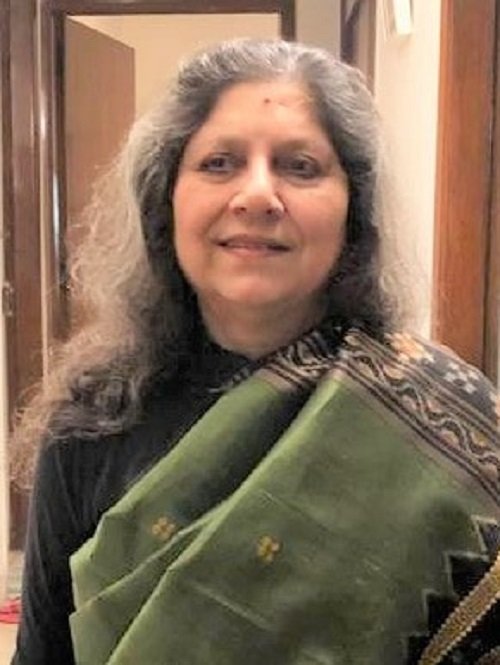
Jayshree Misra Tripathi has been a consultant, educator and examiner in English Language and Literature, for the Diploma of the International Baccalaureate Organization. She worked in print media in the late ’70s and ’80s in India. Having lived in diverse cultures for over thirty years with her late husband, a career diplomat in the Indian Civil Service, her short fiction and narrative verse dwell upon journeys through the diaspora, highlighting women's 'voices' and cross-cultural conversations. Her books include Trips and Trials, What Not Words, Two Minute Tales in Verse for Children Everywhere, Uncertain Times and The Sorrow of Unanswered Questions. Online blogs are on Huffington Post India Archive and News 18.She includes her maiden surname in her writing, as the eldest of five daughters.
THE BETTER-HALF OF THE SCIENTIFIC WORLD
Dr. Viyatprajna Acharya
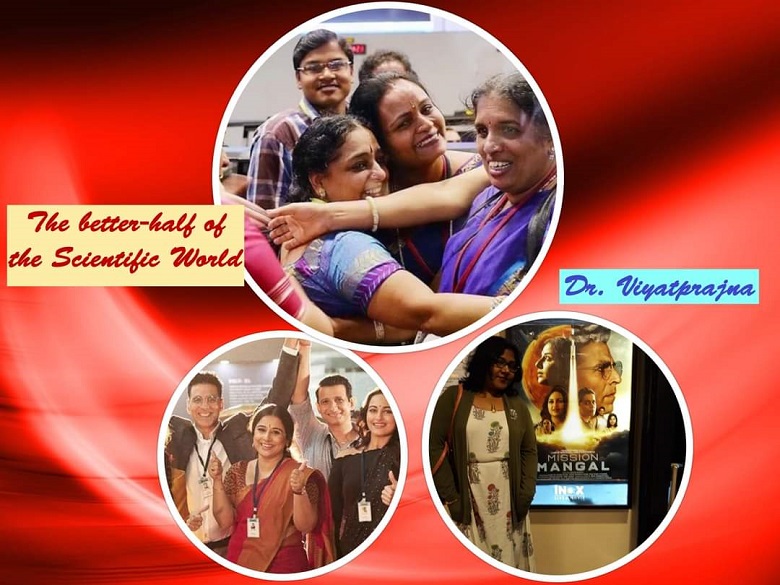
Watched recently "Mission Mangal" along with my gals. This is one of the rarest Bollywood movies where Hero and Heroine are not husband and wife.
I was misty-eyed all throughout the movie. One may laugh and ask why...First I was seeing my own story in the character of Vidya Balan.
Yes, this is what exactly is a working woman's life in India. Still the society is struggling to accept women as serious academician or intellectuals...gender equality in USA is expected to come after 217 years, who cares about it in India???
This is exactly what happens when a serious project of mine has to be submitted or a viva is there or a class is there.....maid takes off, children fall ill, their exams clash with my classes.....on top of it, spouse keeps making you guilty for working, if children don't do well in the exam it's the woman's fault (whether she's literate or illiterate, it's immaterial), if they become fat, mother is pampering, if they become lean, mother doesn't take care...so bottom-line is woman is to be blamed for anything and everything.
But I liked the way Vidya answers her hubby casually 'she has to work because she loves her work'. Alas! Every woman can do that! One thing has to be understood that if we severe our heads and offer on a platter, then also nothing is going to please the world. Hence forget about pleasing everyone. Know your 'Swadharma' (by natural Shraddha due to your past karmas, your Swadharma is decided) and work accordingly.
Coming to a researcher's life, this is the story of most of us. First hurdle is funds. We Indians are good at Jugaads, making local arrangements, saving our chemicals and reagents, churning out maximum out of minimum, saving the waste....even then funds come to you in a very tortuous way. Finally, you would have put 80% of your energy in getting that fund than doing the research proper.
For a meagre amount of Rs.8000/- once I had to run 80 times to different persons but finally succeeded and of course vowed not to venture again...but 'Dil hai ki maanta nahin' again trapped in my own passion and involved in 4 projects simultaneously. My point is, we have everything in bounty but lack a proper system. That's where we lose our battle.
Coming to the work environment---yes, like everywhere else we too face jealousy, competition (for nothing I must say...together we can do a lot; we are unique in our own ways) and casual attitude of subordinates. Of late I understood--"Your dreams are yours, live them yourselves". So, no expectations...one simple call from within...'Charaiveti, Charaiveti'...march ahead, march ahead.
When we think of something and feel it is new, at least 7 persons across the globe must be thinking about the same thing. Yes, it has happened so many times with me, and am sure must have happened with many others. So, you have an idea...go ahead fast and do it before anybody else comes up with the result. Jo jeeta wahi sikandar.
People may question what would we achieve by knowing whether life was there on Mars or not....many secrets can't be divulged, the overt research satiates many covert missions too. Moreover, it was a giant leap in Space science and kudos to all the scientists working there.
Yes, as a scientist one may not earn too much, may not have a very luxurious life but definitely have the gratification of doing something that we love. Respect to all the scientists across who are working for the betterment of Mother earth.
All our research should be targeted for development of mankind and nation...Avishkaron ke paridhi me yadi manav ka pyaar nahin hai, srijanahina Vijnana byartha hai pranon ke upkaar nahi hai, Bhautikata ke utthanon me jibana ka utthana na bhulein" (if the discoveries are not targeted for benefit of mankind, if science is devoid of innovation, what is the use of hailing materialism). The COVID pandemic is a burning example which showed us what and how much can go wrong if intention behind research is not benevolent.
These are the values of Indian science. Instead of aping western researchers, they should come forward for original indigenous research. We have treasure house of knowledge...just look around...starting from home remedies, architectural marvels, stories from epics...we have innumerable research ideas. Our genotype is different, our country is one of the rarest with bio-diversities, unique in multiple cultures. Yes, it is the time to 'Arise, awake and make the world a beautiful place to dwell in '.
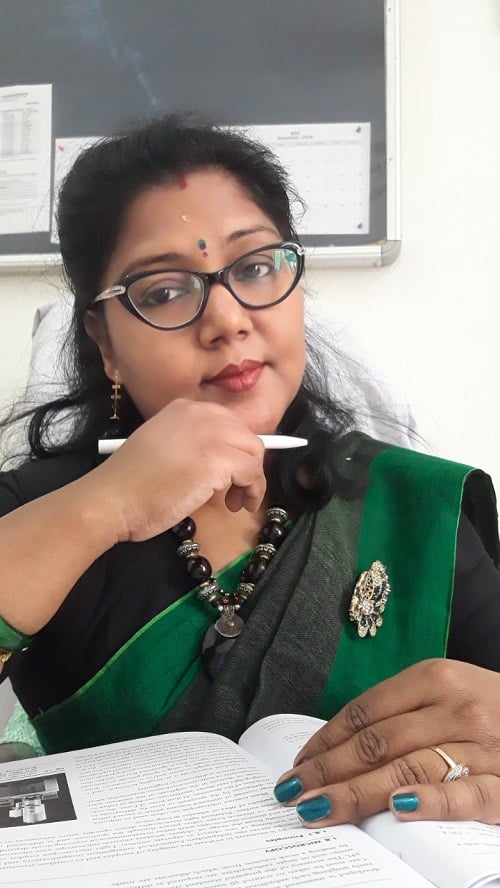
Dr. Viyatprajna Acharya is a Professor of Biochemistry at KIMS Medical College, who writes trilingually in Odia, English and Hindi. She is an art lover and her write-ups are basically bent towards social reforms.
RAMAKANT RATH: THE POET LAUREATE
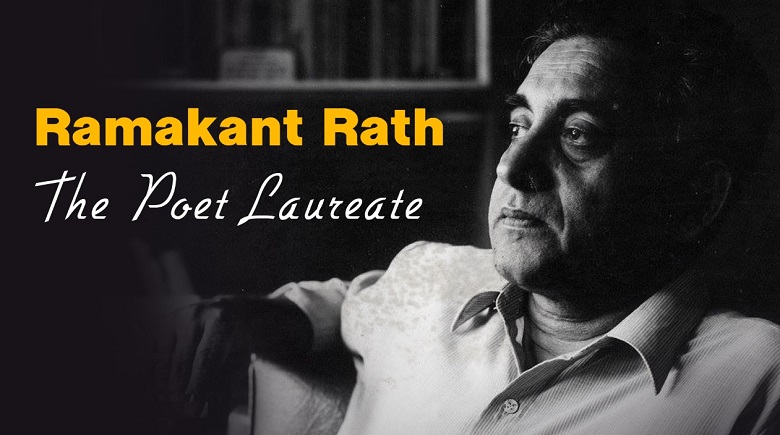
Ramakant Rath is a name to be reckoned with in the field of contemporary Indian Poetry. He is a legend in his lifetime. A poet of eminence, former Chief Secretary, former President of Central Sahitya Akademi, and the winner of several national awards including Padma Bhusan, he is still active in his poetic journey at the age of 88. As an administrator, he had the reputation of being a very tough bureaucrat. When he was the Chief Secretary during late Biju Patnaik as Chief Minister, even the Cabinet Ministers were craving for his advice on crucial issues. During the Chief Ministership of late Nandini Satpathy, he was her Private Secretary and with her confidence in him, he had a lot of clout in the state administration.
But as a poet, he is far from the corridors of power and lobbying for himself. He bloomed to be a poet from his student days at Ravenshaw College, Cuttack and attracted the attention of poetry lovers and critics. Being an extraordinarily brilliant student he had sufficient exposure to western literature and the works of poets like T. S. Eliot and Ezra Pound. At the same time, he was greatly influenced by the spiritual and metaphysical poetic traditions of ancient and medieval Odia literature. Within a very short time, he carved a niche for himself.
His poems revolve around love and death, the melancholy and futility of present-day life. His poetry collection Saptam Rutu (the Seventh Season) speaks of the inevitability of death. The death consciousness of man in the post world war period was a major theme in western poetry and he was influenced by this to some extent although he discovered a better narrative in the life of Kansa of Indian mythology who was haunted by death day and night in a most pitiable condition. However, he is famous for his long epic poem Sriradha which earned him Saraswati Samman and got translated into so many languages. It’s considered a modern classic. Here Sriradha of the Vaishnavite traditions takes the image of a contemporary woman crushed between her passionate longing and love for the lover and the mundane existence of life.
I had a fair acquaintance with his poems since my school days when he was being published regularly in the mainstream literary journals as a major poet of the time. It was an evening in Delhi perhaps in October 1983 when I met him face to face for the first time at the residence of late Bighnaraj Patel, an IAS officer of Odisha who was then Secretary, UPSC. He was then about to return to the state on completion of his central deputation.
During those days Sriradha was being published piecemeal in various magazines and he asked me about my views on it. Without realizing how serious he was about his poems I casually replied that it was dragging at some points. This made him visibly upset and I had to regret such remarks. Subsequently, Sriradha came out to be his magnum opus and when he bagged Saraswati Samman for it he was felicitated by many organizations in the state. In one such event organized by the PG Department of Odia in Utkal University, I had the honor to share ideas with him and there I publicly apologized for my remarks years back.
There are very few critics of his poetry. Once the then Chief Minister Biju Patnaik in a public meeting commented that he could never understand the writings of his Chief Secretary although it fetched him national awards. As a poet, he is definitely difficult for the common readers but he has excelled in his poetry craft to the amusement of serious readers and critics. His reputation as a master poet has overshadowed his ability in writing prose. His prefaces for his poetry collections belong to a class itself. His short stories are equally very powerful and keep the readers engaged. He is not a powerful public speaker but he always comes prepared and speaks to the point in a very crisp manner. He never forgets to take small notes for his speech and maintains discipline in time.
Although I was never very close to him at a personal level I had high regard for him as a person and also as a poet. He is a simple and soft-hearted person who had encountered many personal tragedies in life. Even though he was a retired Chief Secretary I had seen him umpteen times in the market with bags carrying fish and vegetables for the family. In 1995 I got selected for a fellowship in literature by the Department of Culture, Government of India and he was the first person to break the news when we visited his house to greet him on the occasion of Holi. Probably he was one of the final jury members.
Years ago in the year 1998, he lost one of his younger brothers and he had to travel to Puri in a van for the last rites. That day I saw him in a state of utmost shock and sorrow for losing his own brother. I could imagine the depth of anguish and loss writ large on his pale face.
Today he is considered as the pinnacle of Indian poetry and Odisha has reason to be proud of him. His success as a poet and his contributions to literature shall always inspire the successive generations of poets of the country.

Mr. Pradeep Biswal is a bilingual poet writing both in Odia and English. His poems are widely anthologized. He is also an editor and translator of repute. A retired IAS Officer, Mr. Biswal presently holds the position of Member, Odisha Real Estate Regulatory Authority and stays with his family at Bhubaneswar. Views are Personal

Every new generation looks for a new world, a world both out of his/her inner-self as well as the phenomenal (an outside world accessed by senses) that looks, smells and works in a new way—the Gaia may be is the same but the world is different. And invariably, disappointments veer round to the inactions, omissions and commissions of the past generation. The old cannot build a new world for the new—the present must, if it wants one, dream of one with fire in the belly and idealism. If pragmatism and seeking of self becomes entrenched in the new generation, there will be no new world. Pragmatism is anti-thesis of idealism, the death of all dreams and quest for that world—bringing heaven down to the earth—a Bhagirath in quest of Ganga.
Aldous Huxley’s classic Brave New World (1932) was dystopia of perhaps, the socialist/communist utopia (and other utopias as well), but World State of AF 632 (2540 CE) does not appear a too farfetched idea. Indeed, the zeal of ushering in the New Millennium had barely died down when the dystopia appears looming on the horizon. Indeed, the “brave” has to be replaced by “muscular” new world. Almost all rational thoughts and actions in all hubs of civilisations are now controlled by muscular Bernard Marx(es) regulating our “sleep learning”, all men of thought are to be emasculated and banished forever, since the new (human) hatcheries do not need them anymore. Whether AF (After Ford) 632 or 1984 (Orwell’s), what is ushering in this Kafkaesque order?
Perhaps, two things happened to these two generations, the old and the new, both frustrated in their failures to engender a New World. The old, has turned radical, i.e. seeking its roots in the ancient, China looking for a “Middle Kingdom”, India seeking its global “Hindu Golden Age”, America seeking, “Making America Great Again" and of course, Russia discovers the new Peter the Great in Putin. UK is scared off its “sovereignty being stolen” by the European neighbours, Hungary guarding its “pure” Magyar past and the story goes on unimpeded across the globe—from a dream of a global village, we are now euphemistically like the Mesopotamian city states, at perpetual war with each other. With rise of counter-intelligentsia, politicians with their muscular vocabulary and actions, the world is far from a safe place for ordinary Homo sapiens.
The new generation too is frustrated, being hung between idealism and pragmatism, between the future and the present and between toils of old world and the comforts of the computer culture, but sadly saddled with unemployment or the fear of it (the general youth unemployment in Europe ranges from 10 to 30 percent)—if hatcheries are to prosper, the men of “reservations”(Johns) are to disappear. In the bellies of the young the fire has died down and along with the appetite for struggle and sacrifice on which a New World has always been ushered in. All ideologies appear defunct today and all idealism is dead. Mustafa Monds rule the roost. The new generation blames the past and the past generation seeks its own past and has nothing to offer to the new gen.
World has perhaps, changed many a time in the past, since the dawn of civilization, when human beings became active agents of that change, say in the past 10000 years or so. Cities, states and polities were built, people interacted far and wide, spirituality and religion appeared and wealth produced—the human imprint on the face of the earth became more real than apparent. This might have come about through a mix of four processes, sometime one more pronounced, sometimes the other. These are:
- Through natural changes, in which time and change gets enacted with little involvement of the human agency— the Universe and earth dynamics play out its natural course. Diversity and development move through their own autochthonous processes.
- Second, technology induced changes appear—the accidental discovery of a technology, say agriculture or metals or gun-powder or the silicon chip and so on make changes in the rule boos and direction of changes that the societies move. Here the human agency is active but not necessarily always the actions are willful.
- Evolutionary changes that appear through the Darwinian mechanism—changes in which the genetic mutation-errors and natural selection can be replaced by social mutation and structural changes (structure: how the society is organised around some basic components). Here, time is a key factor factor—evolutionary changes are time dependent.
- Finally, (d) socio-political revolutions—drastic changes brought about by socio-political upheavals—chaotic, anarchical and often violent with a pronounced role of the human agency—the French (1789-1803) and the Bolsheviks Revolution (1917) being good examples. Societies got transformed within a short period of time and the New World becomes indistinguishable from the one it engenders from. All these in some way brought forth a New World, sooner or later, especially the latter three, in which active human agency have been the key factors.
If the New Gen today expects the old guards to deliver, they are grossly mistaken. The old guards will hold on to power and hegemony like the Mustafa Monds commandeering the world through some remote control called “votes and consent” and will kill all instincts of change either in the hatcheries or through “sleep learning” by the old mantra-chanting by Goebbels of the day. This is something ingrained in us Homo sapiens—built in our genes to be the top dog and more from the fear of loss and stregth. It has little to offer except its bloated ego and pretence of wisdom. The new does not often come from wisdom but from dreams and fire—do not turn lotus eaters. Instead of being complacent and pragmatic, the New Gen must have that idealism and fire in the belly to usher in the Brave New World and not to live, compromised in the decadent dystopia as obtains today.
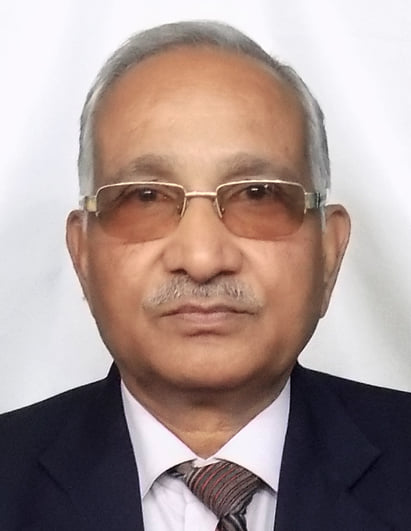
Avaya C Mohapatra is a Retired Professor, Served North Eastern Hill University, Shillong (July 1976- September, 2017). He is a freelancer in academic writing and a blogger (acmohapatra.blogspot.com). He can be reached via email: acmohapatradr@gmail.com.
BOOK REVIEW
THE JASMINE GIRL AT HAJI ALI AND OTHER STORIES - A REVIEW

The Jasmine Girl At Haji Ali and Other Stories is a collection of fifteen short stories,by Mrityunjay Sarangi, a retired civil servant and editor if Literary Vibes, a monthly e magazine in English.
The unique feature of the book, as I perceive, is the author's ability to bring in an element of suspense that is sustaining throughout the stories, with a climax, that sets the momentum in the reader. The stories are laced with a string of emotions and a tinge of humour, sarcasm and empathy.
As one turns the pages the stories suddenly turns serious.
How budding talent is brutally curbed in the child by uncalled for criticism and how force of circumstances revives the latent musical talent to blossom, is very well portrayed in 'Piano'.
The perception of love across individuals is lucidly brought out in " The Girl in Red".
How gullible are, the common people and fall easy prey to promotions of 'good health' schemes by Dr. Nayak makes 'Monkey Dance', a humorous read.
The suspense and the climax in 'Perfume', stands out and brings out the distinct identity of each character in the story.
I am sure every reader will be able to easily relate to 'A Walk on Lodhi Gardens', where the husband cleverly handles the emotional angle of his spouse by recalling the instant poems the protagonist had conjured during the early days of their marriage and calmed her on their return home after a walk.
The yearnings of the devout homemaker, with unfulfilled dreams, seeking avenues for satisfaction, though common place, is well narrated by the author in 'Freud Stumped' through a recall of life experience when a group of friends meet.
'Rice' revolves around the tragic life of Kamalini and her family, set at a fast pace.
'Yes Boss' is bound to send the readers into peals of laughter, at the turn of events unfolding, as the story picks up steam.
The shortest story ' The Jasmine Girl At Haji Ali' to me is very meaningful with a message loud and clear. It lays bare the fact that the well to do evaluate every aspect of life in monetary terms while a humble teen, a flower vendor, brings home the value of the joy of giving. The Jasmine Girl lingers in my memory long after I closed the book.
'Debt' set me recalling the numerous occasions people have voluntarily reached out to me with timely support when much needed, Some food for thought.
The writer, with his vast experience as a bureaucrat, has given an insight on the way the various departments in the government in India functions, in general, viz a viz the others abroad, through 'A Marooned Bird'.
The whimsical deeds of the ultra rich, born with a silver spoon, with an arrogance that money brings power to control people, is stopped in its track in 'Flesh', in which the narrative takes a serious turn resulting in murder to avenge the misdeeds.
How love can reason out quietly and bring a man drawn into acquiring material wealth by any means, back into the main stream is outlined in 'Redemption'.
'The Walk' brings back nostalgic memories of the painful pandemic, through Sadanand.
Finally, 'Pyre' touches upon the caste system because of which a family is separated but concludes on a positive note, though a bit tragic, with the acceptance, due to force of circumstances of a child born out of the marriage.
To sum up, the author has shared his vast experience in his stories which readers will be able to relate to with ease and enjoy the rich variety dished out. My best wishes to the author.
S. Sundar Rajan is a chartered accountant, a published poet and writer.


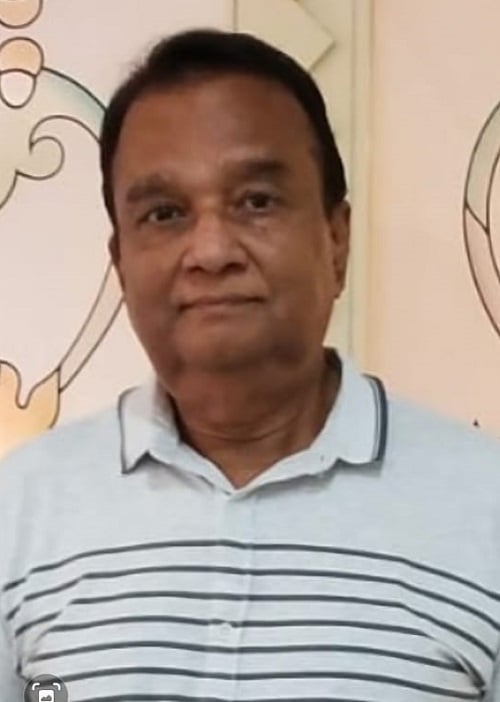
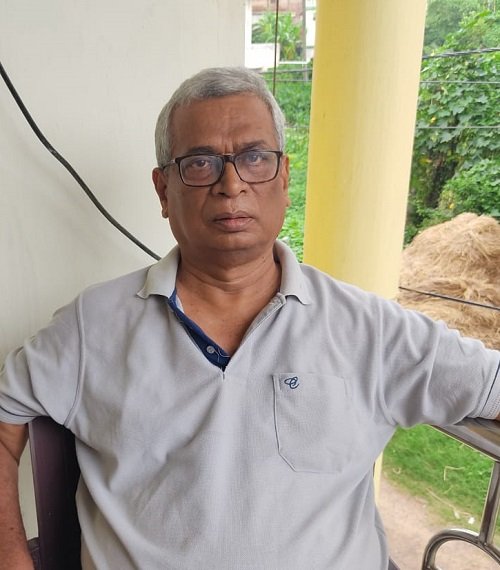
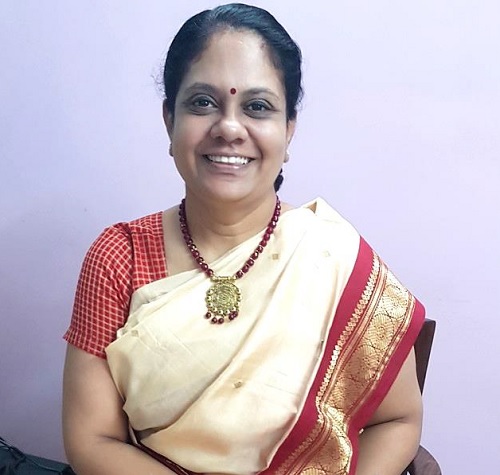
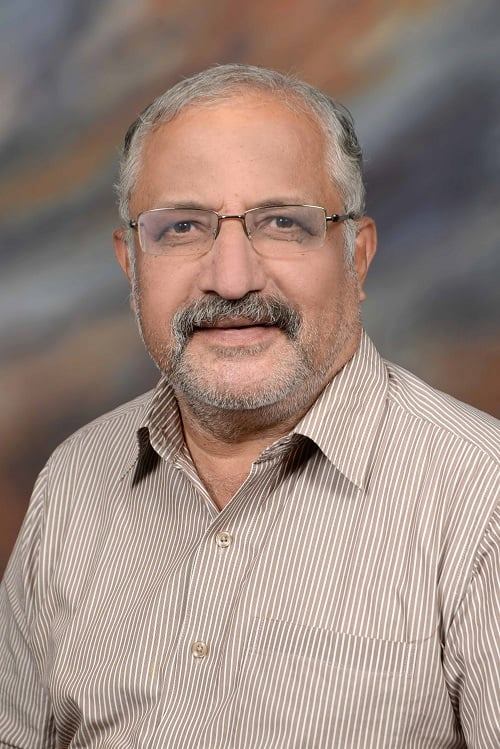
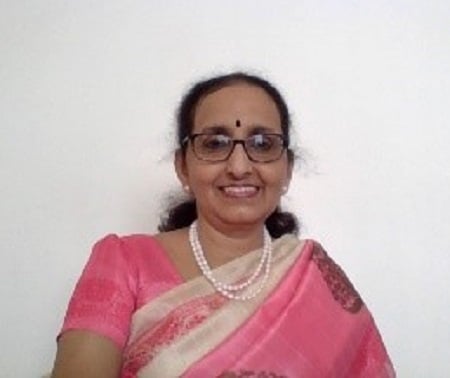

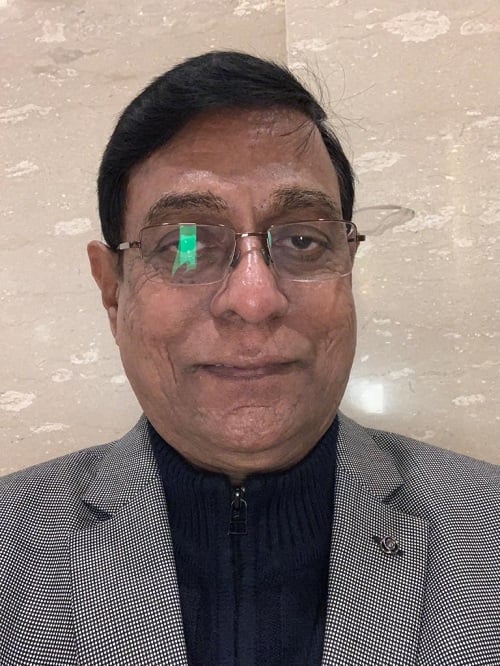
Viewers Comments